7 Volumes
Revolutionary War Era
The shot heard 'round the world.
Constitutional Era
American history between the Revolution and the approach of the Civil War, was dominated by the Constitutional Convention in Philadelphia in 1787. Background rumbling was from the French Revolution. The War of 1812 was merely an embarrassment.
Colonial Times
More than half of American history took place before 1776, but after 1492. For Philadelphia, Colonial history lasted about a century.
Philadephia: America's Capital, 1774-1800
The Continental Congress met in Philadelphia from 1774 to 1788. Next, the new republic had its capital here from 1790 to 1800. Thoroughly Quaker Philadelphia was in the center of the founding twenty-five years when, and where, the enduring political institutions of America emerged.
History: Philadelphia and the Quaker Colonies
Philadelphia and the Quaker Colonies
Quaker Philadelphia 1683-1776
New volume 2012-11-21 17:33:18 description
Pre-Revolutionary Ben Franklin
Poor Richard was able to retire at the age of 42, and spent the rest of his life as a rich man, dying at the age of 82 with an eye-popping estate.
Benjamin Franklin
A collection of Benjamin Franklin tidbits that relate Philadelphia's revolutionary prelate to his moving around the city, the colonies, and the world.
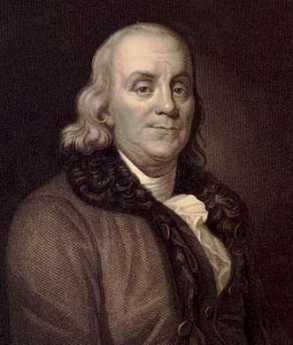
REFERENCES
| Benjamin Franklin: An American Life Walter Isaacson ISBN-10: 0684807610 | Amazon |
| Benjamin Franklin: Some Account of the Pennsylvania Hospital Professor I. Bernard Cohen Library Number:54-11251 | Amazon |
| Benjamin Franklin Carl Van Doren ISBN-13: 978-0140152609 | Amazon |
| Benjamin Franklin Edmund S. Morgan ISBN-13: 978-0300095326 | Amazon |
| Benjamin Franklin Numbers: An Unsung Mathematical Odyssey Paul C. Pasles ISBN-13: 978-0691129563 | Amazon |
Benjamin Franklin ("Poor Richard") was one of the most remarkable men who ever lived.
Benjamin Franklin: Chronology

|
| Ben Franklin on the cover of Time magazine |
January 17, 1706 Born in Boston, the thirteenth child of a candle maker; only went through 2nd Grade, Apprenticed to his brother as a printer, ran away to Philadelphia age 17 .
1723 Arrived in Philadelphia penniless, readily found work as a printer.
1725-26 First trip to England. Researched printing equipment, but probably lived a riotous life.
1726-1748 Returned to Philadelphia to found his own print shop and bookstore. Wrote and printed Poor Richard's Almanack organized local tradesmen into the Junto, formed partnerships with sixty printers throughout the colonies, obtained the print business of local governments, became postmaster. Able to retire at the age of 42 by selling his business for 18 annual payments, which offered him comfort and ease for considerably longer than his life expectancy.
-------------------------------------------------------------------------------
1751 Helped found Pennsylvania Hospital. Entered the legislature.
1751-1757 Active in legislature, rising to leadership during the French and Indian War, Pontiac's Rebellion and the uprising of the Paxtang Boys.
1754Took a noteworthy carriage trip to the Albany Conference, accompanied by fellow delegates Proprietor Penn and Isaac Norris at which he proposed unification of the thirteen colonies to fight against the French. Composed the first political cartoon "Join or Die" for that purpose. Notes for the trip on the blank pages of "Poor Richard's Almanac", now at Rosenbach Museum. The other delegates rejected the plan.
1757-1762 Second time in England. Acted as representative of both Pennsylvania and Massachusetts. After his electoral defeat, he returned to England for a total of eighteen years, suggesting hidden British sympathies may have been present. .
1762-1764 Returned to Pennsylvania Legislature, where his unpopular agitation for replacing the Penn Proprietors with direct Royal government led to his electoral defeat and the end of his elective career. The defeated but determined Quaker party sent him to England to lobby against the Penn family and for the rule of Pennsylvania by the King.
1764-1775 Third British visit. Although unsuccessful in his lobbying, his fame as a scientist made him welcome among the famous members of the Enlightenment, like Hume, Adam Smith, Mozart. Meanwhile, the colonies became considerably more rebellious than he was. His blunder with the publication of some letters gave the British Ministry an opportunity to humiliate and disgrace him in public, probably as a warning to the mutinous New England leaders. It irreconcilably alienated Franklin, who sulked, then packed up and joined the Continental Congress the day he arrived back home.
March, 1775-October, 1776 Brief but fateful return to America. Decisions were made in London to put down the colonists by as much force as necessary. Meanwhile, Franklin persuaded the Continental Congress they must declare independence from England if they expected help from the French.
July 4, 1776, Independence is declared within days after the arrival of a massive British fleet in New York harbor. Franklin dispatched to France to secure the assistance he was confident he could get.
1777-1785 France. Franklin served admirably as American ambassador, his wit and charm persuading the French to overextend themselves with ships, supplies, and money, and very likely contributing to the French Revolution by popularizing the American one.
1785-1790 Returning as a national hero for his final five years of life, Franklin loaned his personal influence to the constitutional convention, became President of Pennsylvania, worked for the abolition of slavery.
April 17, 1790 Died, probably of complications associated with kidney stones.
Franklin Crown Soap

|
| Benjamin Franklin |
It's easy to make soap, but hard to make good soap. You just boil animal fat with wood ashes, and you get soft soap. Softsoap was sold by the barrel in the Colonies. Hard soap is made by adding salt to the mix, allowing it to be sold by the bar. The trick to all this is to know how long to boil it, how much ash of what kind, and how much salt. If you get it wrong it will be too soft or too hard, and if you have too much lye from the ashes, it will burn your skin when you wash with it. Most people made their own soap in the colonies, so they often got it wrong, because they didn't exactly know what they were doing. What they were doing was called Saponification, after the old Roman hill of Sapo. The legend is that burnt animal sacrifices in the Temple at the top of the hill would wash down and help the washerwomen in the river below get their clothes clean. The point of all this is that Josiah Franklin, the father of Benjamin and sixteen other children, was a candle maker and a soap boiler. Somehow he got the recipe right, particularly the part about adding salt, and made famously fine bars of soap with a crown stamped on them -- Crown soap. The formula was a strict family secret, the source of family discord when one sister let it out.
The point which needs reflection is that nobody in Franklin's family ever heard of potassium hydroxide, saponification, triglycerides or fatty acids. The process of achieving fame throughout the colonies -- for making a product everyone could make haphazardly -- must have involved a careful series of experiments with different fats, tallows and lards, with different amounts of ashes of various trees, and different amounts of salt. When you got it right it worked consistently, but it would have been necessary to make many experiments to get it right. To avoid repeating the same mistakes, it would be necessary to keep careful records. In other words, little Benjamin must have observed a great many examples of experimental chemistry which made him a chemist fit to talk with Lavoisier and Priestly on equal terms, even though he quit school after the second grade. His childhood was one long demonstration of a motto of Claude Bernard: "Experiment first, a theory later."
Logan, Franklin, Library
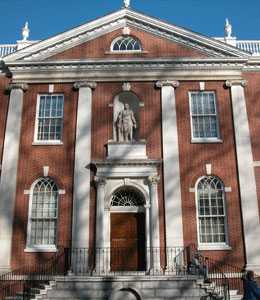
|
| The Library Company of Philadelphia |
Jim Greene is the librarian of the Library Company of Philadelphia, and one of the leading authorities on James Logan, the Penn Proprietors' chief agent in the Colony. Since Logan and Ben Franklin were the main forces in starting the oldest library in America, knowing all about Logan almost comes with the job of Librarian. We are greatly indebted to a speech the other night, given by Greene at the Franklin Inn, a hundred yards away from the Library.
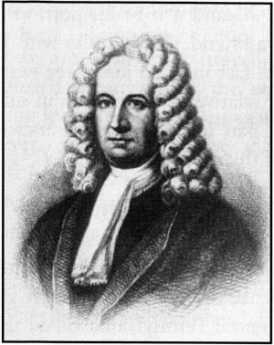
|
| James Logan |
Logan has been described as a crusty old codger, living in his mansion called Stenton and scarcely venturing forth in public. He was known as a fair dealer with the Indians, which was an essential part of William Penn's strategy for selling real estate in a land of peace and prosperity. Unfortunately, Logan was behind the infamous Walking Purchase, which damaged his otherwise considerable reputation. Logan must have been a lonesome person in the frontier days of Philadelphia because he owned the largest private library in North America and was passionate about reading and scholarly matters. When he acquired what was the first edition of Newton's Principia, he read it promptly and wrote a one-page summary. Comparatively few people could do this even today. It's pretty tough reading, and those who have read it would seldom claim to have "devoured" it.
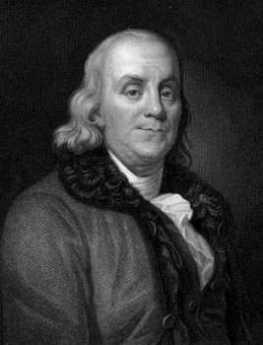
|
| Benjamin Franklin |
Except young Ben Franklin, who never went past second grade in school. The two became fast friends, often engaging in such games as constructing "Magic Squares" of numbers that added up to the same total in various ways. For example, Franklin doodled off a square with the numbers 52,61,4,13,20,29,36,45 (totaling 260) on the top horizontal row, and every vertical row beneath them totaling 260, as for example 52,14,53,11,55,9,50,16, while every horizontal row also totaled 260 as well. The four corner numbers, with the 4 middle numbers, also total 260. Logan constructed his share of similar games, which it is difficult to imagine anyone else in the colonies doing at the time.
Logan and Franklin together conceived the idea of a subscription library, which in time became the Library Company of Philadelphia in 1732. The subscription required of a library member was intended to be forfeited if the borrower failed to return a book. Later on, the public was allowed to borrow books, but only on deposit of enough money to replace the book if unreturned. We are not told whose idea was behind these arrangements, but they certainly sound like Franklin at work. More than a century later, the Philadelphia Free Library was organized under more trusting rules for borrowing which became possible as books became less expensive.
Logan died in 1751, the year Franklin at the age of 42 decided to retire from business -- and devote the remaining 42 years of his life to scholarly and public affairs. He first joined the Assembly at that time, so he and Logan were not forced into direct contention over politics, although they had their differences. How much influence Logan exerted over Franklin's plans and attitudes is not entirely clear; it must have been a great deal.
Franklin: Upstart Hero of King George's War (1747)
In 1747, Benjamin Franklin had a life-transforming experience, acting quite unlike his character before, or later. At that time, Old Europe was engaged in some distant tribal skirmishing which has come to be known as King George's War. King George II, that is, under whose rule Franklin in 1751 inscribed on the cornerstone of the Pennsylvania Hospital that Pennsylvania was flourishing, "for he sought the happiness of his people."
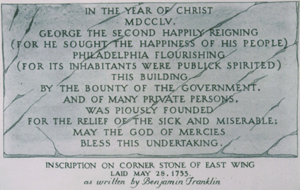
|
|
The cornerstone of the Pennsylvania Hospital inscribed by Franklin. |
Those distant commotions suddenly developed a harsh reality for the little pacifist sanctuaries on the Delaware River, when French and Spanish privateers suddenly raided and destroyed settlements on Delaware Bay. The Quaker Assemblies and their absentee Proprietor merely dithered and huddled in the face of what impended as a totally unexpected threat of annihilation of the pacifist colonies. It probably only seemed natural for the owner of the largest newspaper in the colony to publish a pamphlet called "Plain Truth," urging the inhabitants to rally to their own defense, and pressure their government to lead them. The Quaker leaders were in fact unable to readjust a lifetime of pacifist belief in a few days of an emergency, and the English Proprietor, then Thomas Penn, was far too remote to take active charge of matters. So, Franklin gave speeches, also an unfamiliar role for him, and finally brought out a detailed proposal for the creation of a Pennsylvania Militia. Ten thousand volunteers promptly signed up, elected Franklin as their Colonel; but he declined, and served as a common soldier.
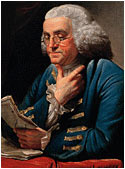
|
| Benjamin Franklin in 1767. |
Against naval attack, the Militia needed cannon, which did not exist in the colony. So Franklin organized a lottery, raised three thousand pounds, and tried to buy cannon from Governor Clinton of New York. New York declined to sell, and so Franklin led a delegation to New York to negotiate. The negotiations largely consisted of getting Governor Clinton drunk and convivial, but they were successful, the artillery was shipped off to Philadelphia. Although they were undoubtedly grateful to Franklin for saving the day, this entirely extra-legal recruitment of an army badly rattled the Quakers and their Proprietor, since it demonstrated the ineffectiveness of their governance at a time of obvious crisis, and might ultimately have led to their overthrow. Franklin's heroic behavior seemed so threatening to Thomas Penn that he described him as "a dangerous man," acting like "the Tribune of the People."
When the underlying commotion in Old Europe subsided, the threat to the colonies disappeared, so the Militia disbanded in a year. Franklin seemed to be just as uncomfortable with his unaccustomed role as the governing leaders were, and he hardly ever mentioned it again. However, this is the sort of reflex leadership which makes political careers, and it surely influenced his decision to retire from business in 1748, run for election to the Assembly, and live like a gentleman. Seven years later, during the French and Indian War, he had become the chosen leader of the Pennsylvania Assembly, had much longer to think through what he was doing, and had learned how to organize a war. By that time, as the saying goes, he knew who he was. He was a man whose silent memories could flashback to that time when a bald fat printer stepped out of the crowd, saying "Follow me," and ten thousand men with muskets did so.
Addressing The Proprietors' Dilemma
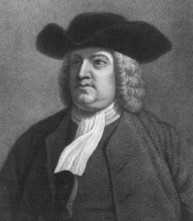
|
| William Penn |
DURING the century which elapsed after Charles II gave away Pennsylvania to William Penn, several hundred thousand people moved in and changed the place. Transformation of the wilderness explains why the terms of the grant seemed logical at one time, but proved almost impossible to manage at the time of the Revolution. The Penns with thirty million acres was the largest landholders in America but, in fact, by 1776 only five million acres had been sold in a century. The land they held was simply too much for one family to handle without an army, and although the original settlers were pacifists, the later ones were combative.
Charles II had written in the Charter that the Penns could have the land if they could maintain order there, retaining the legal right for the King to recover the land if they didn't. This fall-back provision certainly reflects some doubt about the ability of pacifists to shoot the necessary number of Indians, Frenchmen, and Spaniards. On the other hand, the motive for a King delegating away his authority in the first place became clearer when the Penns experienced severe financial strain defending the Northeast corner of the state against the Connecticut invaders. It furthermore helps us understand why Benjamin Franklin received such a cold reception when he was sent to London by the colonists to request the crown to reassert civil authority over the state. That did not necessarily imply stripping the Penns of their land; by this time, it was clear that the Penn Proprietors were mainly interested in selling it to someone. The charter of the King's grant included the offer to make William Penn a King; and although the offer was declined, the Penn Proprietors retained some degree of legal power to govern the territory. Franklin for all his persuasive power was, unfortunately, the one man Thomas Penn didn't want to see, because of the threat he had posed by raising a militia in King George's War, and later his expansiveness at the Albany Conference. And Thomas was a good friend of the King. The King didn't want these problems and particularly didn't want the expense. Ambiguities were, of course, shared all around. William Penn had quite shrewdly seen it was more sensible to treat the Indians decently than to fight with them, and cheaper too; the lesson was not lost on the British crown. But the French Kings posed a much larger world-wide threat to the British colony, finding for their part, it was rather economical to supply munitions to the Indians on the frontier and stir them up emotionally. The French and Indian War was a small component of the Seven Years War, which proved to be a costly adventure for both sides. Its local cost certainly overwhelmed the ability of one family to underwrite local governance in a large wartime colony, and it jeopardized the finances of the British Monarch to carry the rest. The resulting need to tax the colonies for their defense sent things downhill, eventually to the Stamp Act, the Townshend duties, and the Tea Tax. Everyone made lots of mistakes as the whole structure underwent revision, just as pacifists are certain will happen in any war. But when a pacifist utopian colony was prospering while successfully dealing with the Indians, it's all sort of a big pity.
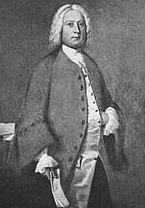
|
| Thomas Penn |
With much to lose, the Penn family did pretty well with the resources at hand. By the time of the Revolution, three generations of Penns had divided up ownership shares of the Proprietorship. When French and Spanish ships were marauding the Delaware River, Benjamin Franklin the local printer took it on himself to organize a militia which persists today as the Pennsylvania National Guard, the Twenty-eighth Division. Franklin was suddenly a local hero to everyone, except to one man, Thomas Penn. Thomas was the dominant figure in the Penn family for many years and worried deeply about Franklin, a man who could stir up ten thousand armed volunteers with a poster proclamation. Such a man could mean trouble, as indeed events later proved to be the case.
John Penn was the Governor of the state, residing in his mansion on the Schuylkill called Lansdowne, doing his best to ingratiate the locals. He struggled to be diplomatic when arguing for the decisions actually made by his Uncle Thomas in London. Thomas Penn, on the other hand, was an important friend of the British Ministry, and a notable person in aristocratic England. As the Revolutionary War approached, the problem transformed into how to hold on to 25 million unsold acres, while remaining unsure who was going to win the impending war.
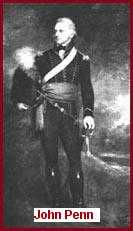
|
| John Penn |
The strategy the Penns adopted was to get out of the business of running a local government, as Franklin had proposed but in a different way. John Penn the Governor became a private citizen, just a local real estate agent. He took an oath of allegiance to the Revolutionary government, which in the chaos of the time was equivalent to becoming an American citizen. Meanwhile, other members of the family remained in England, ready to revise the arrangement if the British won the war. It was all fairly transparent straddling of the issues, which was only even remotely likely to be effective because of the enormous store of Penn goodwill built up over a century. In 1789 revolutionary France, for example, such sentimentality would not have delayed the tumbrels to the guillotine for five minutes.
Meanwhile, an unexpected difficulty was created. By withdrawing from control of the local government, the Penn family also withdrew from the defense of state borders against neighboring colonies. Under the circumstances, the Penns were afraid to appeal to the King, while the new government of Pennsylvania found the Articles of Confederation were merely a wartime tribal compact. The Articles stabilized boundaries mainly for the purpose of conducting a united war, and did not seriously contemplate a continuing judicial role for disputes between colonies. When the Revolution was finally over, the Penn Proprietors were not left with much of a bargaining position. The new State of Pennsylvania offered, and they accepted, about fifteen cents an acre to surrender their claims. In Delaware, they got essentially nothing for those three counties. Only in New Jersey did the Proprietors' claims remain durable after the new nation was established. The Proprietorship of East Jersey survived into the late 20th century, and the Proprietorship of West Jersey continues to return a small profit even today. The New Jersey curiosity is treated in a separate essay.
B. Franklin and Daylight Savings
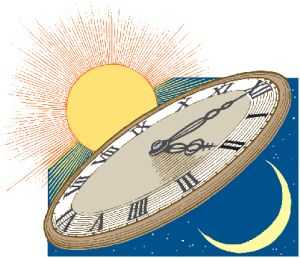
|
| Daylight Saving Time |
Ben Franklin's father was a candle maker working out of his home. Little Benjamin was thus in a position to watch the rise and fall of candle sales with each passing season; it must have been a central fact of that household's economy. Many years later when he was Ambassador to France, the suggestion of Daylight Savings Time was likely less a demonstration of his ingenuity than a testimony to his powers of observation and reflection.
Now, over two centuries later than that, the point is being raised that what with Nintendo and television and all, daylight time may actually cause more consumption of electrical energy than it saves. It's a striking thought, even quite a revolutionary one. Until you remember that Franklin, more than any one person, also discovered electricity.
Rise and Fall of Books
| ||
| The Library Company of Philadelphia |
John C. Van Horne, the current director of the Library Company of Philadelphia recently told the Right Angle Club of the history of his institution. It was an interesting description of an important evolution from Ben Franklin's original idea to what it is today: a non-circulating research library, with a focus on 18th and 19th Century books, particularly those dealing with the founding of the nation, and, African American studies. Some of Mr. Van Horne's most interesting remarks were incidental to a rather offhand analysis of the rise and decline of books. One suspects he has been thinking about this topic so long it creeps into almost anything else he says.
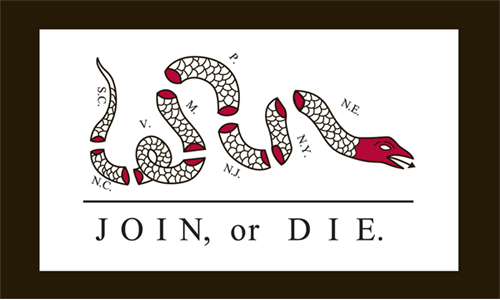 |
| Join or Die snake |
Franklin devised the idea of having fifty of his friends subscribe a pool of money to purchase, originally, 375 books which they shared. The members were mainly artisans and the books were heavily concentrated in practical matters of use in their trades. In time, annual contributions were solicited for new acquisitions, and the public was invited to share the library. At present, a membership costs $200, and annual dues are $50. Somewhere along the line, someone took the famous cartoon of the snake cut into 13 pieces, and applied its motto to membership solicitations: "Join or die." For sixteen years, the Library Company was the Library of Congress, but it was also a museum of odd artifacts donated by the townsfolk, as well as the workplace where Franklin conducted his famous experiments on electricity. Moving between the second floor of Carpenters Hall to its own building on 5th Street, it next made an unfortunate move to South Broad Street after James and Phoebe Rush donated the Ridgeway Library. That building was particularly handsome, but bad guesses as to the future demographics of South Philadelphia left it stranded until modified operations finally moved to the present location on Locust Street west of 13th. More recently, it also acquired the old Cassatt mansion next door, using it to house visiting scholars in residence, and sharing some activities with the Historical Society of Pennsylvania on its eastern side.
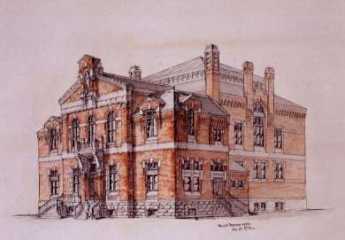 |
| Old Pictures of the Library Company of Philadelphia |
The notion of the Library Company as the oldest library in the country tends to generate reflections about the rise of libraries, of books, and publications in general. Prior to 1800, only a scattering of pamphlets and books were printed in America or in the world for that matter, compared with the huge flowering of books, libraries, and authorship which were to characterize the 19th Century. Education and literacy spread, encouraged by the Industrial Revolution applying its transformative power to the industry of publishing. All of this lasted about a hundred fifty years, and we now can see publishing in severe decline with an uncertain future. It's true that millions of books are still printed, and hundreds of thousands of authors are making some sort of living. But profitability is sharply declining, and competitive media are flourishing. Books will persist for quite a while, but it is obvious that unknowable upheavals are going to come. The future role of libraries is particularly questionable.
Rather than speculate about the internet and electronic media, it may be helpful to regard industries as having a normal life span which cannot be indefinitely extended by rescue efforts. No purpose would be served by hastening the decline of publishing, but things may work out better if we ask ourselves how we should best predict and accommodate its impending creative transformation.
www.Philadelphia-Reflections.com/blog/1470.htm
Philosophy Means Science in Philadelphia
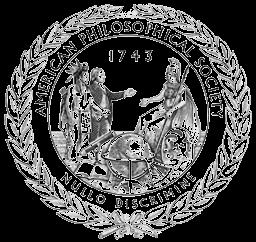
|
| American Philosophical Society Seal |
In the age of the Enlightenment, science was called natural philosophy; that accounts for the present custom of awarding PhD. degrees in chemistry and botany. The sort of thing which interested Ralph Waldo Emerson was called moral philosophy, and you will have to visit some other place than the A.P.S. if that is what interests you. Roy E. Goodman is presently the Curator of Printed Material (some would say he was chief librarian) at the American Philosophical Society, founded in 1743 by Benjamin Franklin who was clearly the most eminent scientist of his day, having discovered and explained the nature of electricity.
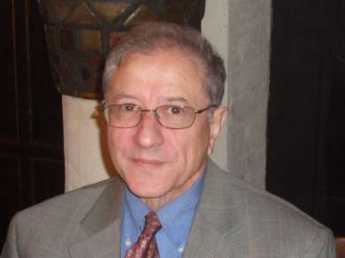
|
| Roy E. Goodman |
Roy Goodman is descended from cowboys and rodeo stars, but in spite of that he gave an entertaining talk recently at the Right Angle Club about this society devoted to useful knowledge, this oldest publishing house and scholarly society in America, once the home of the U.S. Patent Office, and scientific library and museum. They have many rare items in their collection, but the unifying theme is not a rarity, but curiosity. You might say some of the items reflect the whimsy of Franklin, but it would be fairer to say it is an enduring monument to Franklin's universal curiosity about all things.
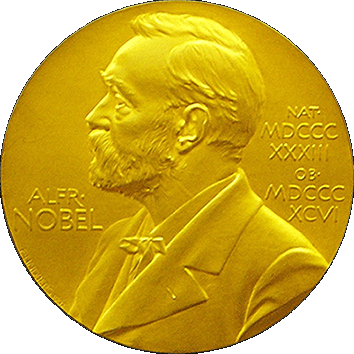
|
| Nobel Prize Medal |
There are about 900 members of APS, about 800 of them Americans, about 100 of them winners of a Nobel Prize. Let's just make a little list of a very few notables in the past and present membership. Start with the first four Presidents of the United States, add Alexander Hamilton and Lafayette, David Rittenhouse and Francis Hopkinson and you get the idea that Founding Fathers got in early. Robert Fulton, Lewis and Clark, Alexander Humboldt, John Marshall were early members, and more recent ones were Madame Curie,
B. Franklin, Scientist
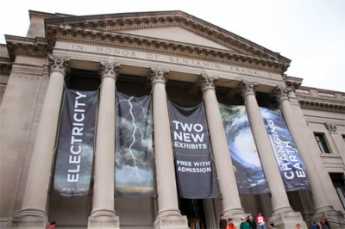
|
| Franklin Institute |
FROM time to time, the Franklin Institute has a display of its own and other museums' collections of the scientific instruments of Benjamin Franklin. It's well worth anybody's visit when it is available because the beauty and craftsmanship of these instruments alone make them remarkable works of art. Franklin was financially able to retire at the age of 42, and it tells you something of the 18th-century culture that Franklin took up scientific experiments in order to be like other independently wealthy gentlemen. Science, or natural philosophy, this seems to have been in a class with getting a coat of arms and having his portrait painted, all of which cheapens our view of Franklin as a scientist.
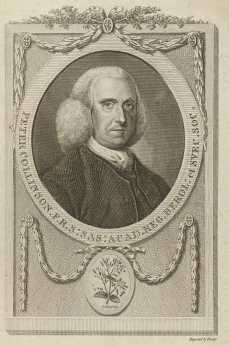
|
| Peter Collinson, F.R.S. |
In fact, Franklin was conducting an active correspondence with other scientists interested in electricity for many years, in particular, one Peter Collinson, F.R.S. in London. Collinson collected thirteen of Franklin's letters about his experiments, the earliest dated 1747, and printed them in 1751 as an 86-page book called Experiments and Observations about Electricity . By 1769, several more letters expanded the book to 150 pages, almost all of them describing reproducible experiments in great detail. The kite and key episode are described, but soberly and sparingly. Without making the point too graphically, an appendix was added describing how lightning had been used to kill some turkeys, so a somewhat increased power would probably be enough to kill a person. Franklin recognized that something was moving from here to there, that it had positive and negative charges, and that it was possible to store it up in a storage battery. He recognized the difference between substances that would conduct electricity and other substances that would act as insulators. Later on, he would discover that the torpedo fish stores and transmits electricity, suggesting that somehow animals made and used electricity as part of life. And of course, he put the discoveries to practical use as lightning rods, which he refused to patent.
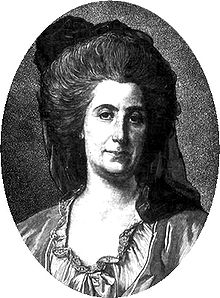
|
| Madame Helvetius |
By the time he went to England and France as a negotiator, his wide acquaintanceship in the scientific world was happy to introduce him to other famous people, like kings, Voltaire, Mozart, and Madame Helvetius the wife of the Swiss philosopher, the only woman to whom he is known to have made a proposal of marriage. When someone mentioned standing before a king, he replied he had stood before five of them. King Louis XVI, for example, appointed Franklin to a four-man committee to investigate hypnotism, then being touted as "animal magnetism" by Franz Mesmer. The other three committee members were unfortunately also destined to become acquainted with the guillotine: Brother Joseph-Ignace Guillotin himself, and two future victims of the invention, Antoine Lavoisier the discoverer of oxygen, and Jean Sylvain Bailly who first calculated the course of Halley's Comet, not to mention Louis XVI himself. It is not easy to think of any other scientist who was able to mix his scientific fame with changing international history, acquiring in the process the sobriquet of the founder of the American diplomatic corps. But then, he was witty as well as smart, and his career is a warning to those who now hope to devote their whole lives to being admitted to a prestige college and then coasting on its reputation. Franklin, it should be remembered, dropped out of school after the second grade.
Pembertons
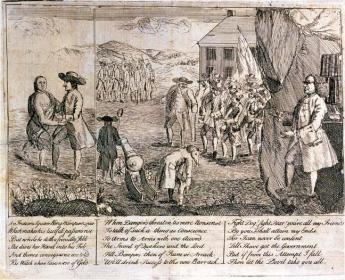
|
| Israel Pemberton, Ben Franklin satire l |
Ralph Pemberton was an English Quaker well before 1650; he may have been a Quaker before William Penn was one. As an old man, he accompanied his son Phineas to Pennsylvania in 1682. They established a farm on the banks of Delaware in Bucks County called Grove Place, and Phineas soon became one of the chief men in the colony. In the next generation, Israel Pemberton became one of the best educated, richest merchants in the colony. But it was Israel's son also called Israel, who earned the title of King of the Quakers. He was one of the founding Managers of the Pennsylvania Hospital along with Benjamin Franklin and one of his brothers, James Pemberton, and was a generous philanthropist and leader of a number of other civic organizations. Just exactly what provoked his famous political disputes with Franklin is not clear, but he was a leading friend of the Indians, whom Franklin never much liked. Israel Pemberton strongly and effectively argued William Penn's policy of friendship with the Indians, particularly insisting that sales of land to colonists should be prevented until there was a clear agreement with the Indians about the ownership. Unfortunately, pressures built up as Europeans immigrated faster than this policy could accommodate smoothly, and Franklin mostly sided with the impatient immigrants -- and squatters. This disagreement came to a head in 1756 when Pemberton negotiated a treaty of peace with the Indians at a conference at Easton. Although this treaty seemed to settle matters, it came against a background of the descendants of William Penn abandoning Quakerism. They, however, remained the proprietary owners of the Province with a more narrow focus on speeding up land sales to maximize their investment. Much of the internal dynamics of these quarrels before the Revolutionary War remain unclear and possibly somewhat misrepresented.
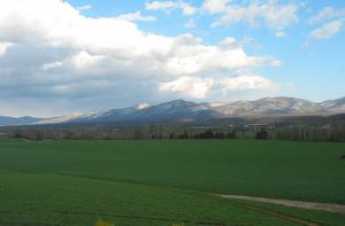
|
| Shenandoah Valley |
When the Revolution came, Pemberton viewed it with disfavor, mostly for pacifist rather than purely Tory reasons. Feelings ran high since the Pembertons were influential citizens with the potential to dissuade wavering neighbors, which made it difficult to tolerate them as invisible bystanders. However that may be, the three Pemberton brothers and twenty other wealthy and influential Quakers were arrested and, without hearing or trial, thrown in the back of an oxcart and sent into exile in Virginia for eight months. Their journey was a curious one, along a trail up the Schuylkill to the ford at Pottstown, and then down the Shenandoah Valley, an area in which they were well known and highly respected, greeted with great sympathy as they traveled. Isaac's brother John, who had spent several years as a missionary, died during this exile.
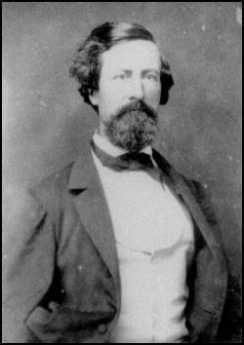
|
| John Clifford Pemberton |
In some ways, the most curiously notable Pemberton was John Clifford Pemberton, who applied to West Point on his own initiative and was appointed by Andrew Jackson who had been a friend of his father. In itself, it is curious that so combative a person and so vigorous an enemy of the Indians -- as Jackson certainly was -- would have Quaker friendships. But he did not misjudge John Clifford, who became a diligent professional warrior for his country in a number of military incidents with the Indians, the Mexicans, and the Canadians, rising to the rank of captain in the regular Army at the opening of the Civil War. In spite of personal efforts by General Winfield Scott to dissuade him, he resigned his commission and volunteered in the Confederate army. He was quickly promoted to major, then a brigadier general and eventually to Lieutenant General. As such, he was the commanding Confederate officer at the fifty-day siege of Vicksburg where he was finally forced to surrender to Grant's army. In a prisoner exchange, he was returned to the Confederate side, which they had no openings for Lieutenant Generals. He resigned and re-enlisted as a common soldier, but was quickly promoted to the rank of Colonel, in charge of the artillery at the final siege of Richmond. After the war, he became a farmer in Warrenton, Virginia, but was visiting at the family home in Penllyn when he died in 1881. John Clifford Pemberton, the highest-ranking general on the grounds, lies buried in Laurel Hill cemetery right next to Israel Pemberton. In some sort of triumph of the South, he here out-ranks George Gordon Meade, the hero of Gettysburg. Just how his pacifist family reconciled itself to his heroism can only be imagined.
Franklin Bets His Wad on General Braddock
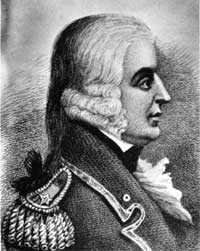
|
| General Edward Braddock |
The defeat of General Braddock at Fort Duquesne (Pittsburgh) in 1755 was not a turning point of the French and Indian War, because although the French won the battle, they lost that War, they also lost Canada in the Seven Years War that followed, and eventually had to sell what remained of their American dream in 1804 as the Louisiana Purchase. The French dream was an empire stretching in an arc from the St. Lawrence River to New Orleans, leaving the British only the thirteen Eastern seaboard colonies.
Nevertheless, the disastrous defeat of the Redcoats was a real turning point in the attitudes of two direct participants, Lieutenant Colonel George Washington of Virginia, and Pennsylvania's political leader, Benjamin Franklin. Both men greeted the arrival of Braddock's troops in America with great relief because it was increasingly evident to them that the Colonies themselves were too indecisive to survive. Both of them were in a unique personal position to see that the French and their Indian Allies were serious about conquering the backcountry, even likely to do so. These two staunch British patriots, therefore, threw themselves into the crisis, with Washington eventually having two horses shot from under him, taking charge of the retreat after Braddock's death. And Franklin pledged his considerable personal fortune on Braddock's behalf, almost losing it and spending the rest of his life in debtor's prison as Robert Morris would later actually do. These two men knowingly laid their lives on the line for the British Empire and came very close to losing everything else for their King and country.
Franklin had retired seven years earlier, a rich man at the age of 42. We now know that he lived like a gentleman for another 42 eventful years. Puttering with science and public works, he joined the Assembly in 1750. It was not long before he was the political leader of the Colony, in a peculiar struggle with the dominant Quaker party who not only opposed war for their own self-defense but were enraged that the Penn family had turned away from Quakerism and refused to be taxed for the defense of its colony. The Governor was appointed by the Penns, with an express contract not to agree to any taxation of the Penn holdings. Since it began to look to Franklin as though everybody was trying to commit suicide rather than spend a farthing, he greeted the arrival of General Edward Braddock's redcoats with great relief. But then Braddock himself turned out to be a brave but exasperating ninny.
Braddock's plan was to take the old Indian trail from the Potomac River to the Monongahela (now Route 40), fording the Monongahela just below its junction with Ohio at Fort Duquesne, then blowing up the French fort with artillery. He had brought plenty of troops and cannons on his ocean transports, but he needed horses and wagons from the colonies. When he was warned of the dangers of Indian ambush in the wilderness, he made a much-quoted response, "These savages may be a formidable enemy to your raw American militia, but upon the king's regular and disciplined troops, sir, it is impossible they would make an impression." The other thing he said was if he didn't get wagons and horses pretty damned quick, he was going back home to England.
Within two weeks, Franklin and his son William collected 259 horses and 150 wagons for him. But to do so, they had to overcome the Pennsylvania farmer suspicion that the swaggering English General wouldn't pay for the goods. To persuade them, Franklin made a public pledge to stand behind the debts with his own money, and his word was known to be good.
The other thing wrong with Braddock's plan was that the trail wasn't wide enough for the wagons and gun carriages, so he had so sent a body of axeman ahead of the troops to widen the road. Progress was at times as slow as two miles a day, plenty of time for word to be taken to Fort Duquesne that the British were coming with cannon. Since it was clear that the Fort could not withstand a siege army, the French commander ordered his troops to attack Braddock as he was crossing the Monongahela. It was meant to be an ambush, but the two armies blundered into each other on the trail, and the Indians simply fought the way they knew best, from behind trees. Two-thirds of the British were killed and most of those captured were burned at the stake. The death toll would have been even higher, and probably would have included Washington, except the Indians, ignored French orders and delayed pursuit to collect scalps. And by the way, all of Franklin's wagons were burned.
Franklin spent an anxious two months since his later reflection was that the loss of 20,000 pounds sterling would surely have ruined him. However, he was lucky that Governor Shirley of Massachusetts, an old friend of his, was appointed at Braddock's successor, and Shirley ordered the debt to be repaid out of Army funds.
The American Revolution would not come for another twenty years, but you can be sure the Braddock episode had an important impact on the minds of both Franklin and Washington. The British Army was not invincible. It was not even very smart.
Franklin's Public Pledge to Braddock
Ihappened to say I thought it was a pity they had not been landed rather in Pennsylvania, as in that country almost every farmer had his wagon. The general eagerly laid hold of my words, and said, "Then you, sir, who is a man of interest there, can probably procure them for us; and I beg you will undertake it." I asked what terms were to be offered the owners of the wagons, and I was desired to put on paper the terms that appeared to be necessary. This I did, and they were agreed to, and a commission and instructions accordingly prepared immediately. What those terms were will appear in the advertisement I published as soon as I arrived at Lancaster, which being, from the great and sudden effect it produc'd, a piece of some curiosity, I shall insert it at length, as follows:
"ADVERTISEMENT. "LANCASTER, April 26, 1755.

|
| Benjamin Franklin |
"Whereas, one hundred and fifty wagons, with four horses to each wagon, and fifteen hundred saddle or pack horses, are wanted for the service of his majesty's forces now about to rendezvous at Will's Creek, and his excellency General Braddock having been pleased to empower me to contract for the hire of the same, I hereby give notice that I shall attend for that purpose at Lancaster from this day to next Wednesday evening, and at York from next Thursday morning till Friday evening, where I shall be ready to agree for wagons and teams, or single horses, on the following terms, viz.: I. That there shall be paid for each wagon, with four good horses and a driver, fifteen shillings per diem; and for each able horse with a pack-saddle, or other saddle and furniture, two shillings per diem; and for each able horse without a saddle, eighteen pence per diem. 2. That the pay commences from the time of their joining the forces at Will's Creek, which must be on or before the 20th of May ensuing, and that a reasonable allowance is paid over and above for the time necessary for their traveling to Will's Creek and home again after their discharge. 3. Each wagon and team, and every saddle or pack horse is to be valued by indifferent persons chosen between me and the owner; and in case of the loss of any wagon, team, or other horse in the service, the price according to such valuation is to be allowed and paid. 4. Seven days' pay is to be advanced and paid in hand by me to the owner of each wagon and team, or horse, at the time of contracting, if required, and the remainder to be paid by General Braddock, or by the paymaster of the army, at the time of their discharge, or from time to time, as it shall be demanded. 5. No drivers of wagons, or persons taking care of the hired horses, are on any account to be called upon to do the duty of soldiers or be otherwise employed than in conducting or taking care of their carriages or horses. 6. All oats, Indian corn, or other forage that wagons or horses bring to the camp, more than is necessary for the subsistence of the horses, is to be taken for the use of the army, and a reasonable price paid for the same.
"Note.--My son, William Franklin, is empowered to enter into like contracts with any person in Cumberland county. "B. FRANKLIN."
-------------------------------------------
To the inhabitants of the Counties of Lancaster, York and Cumberland.
"Friends and Countrymen,
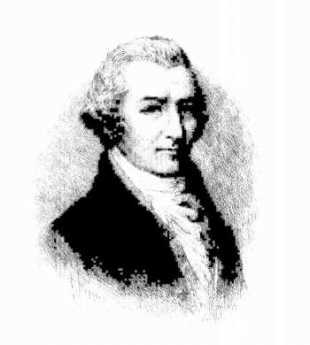
|
| General Braddock |
"Being occasionally at the camp at Frederic a few days since, I found the general and officers extremely exasperated on account of their not being supplied with horses and carriages, which had been expected from this province, as most able to furnish them; but, through the dissensions between our governor and Assembly, money had not been provided, nor any steps taken for that purpose.
"It was proposed to send an armed force immediately into these counties, to seize as many of the best carriages and horses as should be wanted, and compel as many persons into the service as would be necessary to drive and take care of them.
"I apprehended that the progress of British soldiers through these counties on such an occasion, especially considering the temper they are in, and their resentment against us, would be attended with many and great inconveniences to the inhabitants, and therefore more willingly took the trouble of trying first what might be done by fair and equitable means. The people of these back counties have lately complained to the Assembly that a sufficient currency was wanting; you have an opportunity of receiving and dividing among you a very considerable sum; for, if the service of this expedition should continue, as it is more than probable it will, for one hundred and twenty days, the hire of these wagons and horses will amount to upward of thirty thousand pounds, which will be paid you in silver and gold of the king's money.
"The service will be light and easy, for the army will scarcely march above twelve miles per day, and the waggons and baggage-horses, as they carry those things that are absolutely necessary to the welfare of the army, must march with the army, and no faster; and are, for the army's sake, always placed where they can be most secure, whether in a march or in a camp.
"If you are really, as I believe you are, good and loyal subjects to his majesty, you may now do a most acceptable service, and make it easy to yourselves; for three or four of such as can not separately spare from the business of their plantations a waggon and four horses and a driver, may do it together, one furnishing the wagon, another one or two horses, and another the driver, and divide the pay proportionately between you; but if you do not this service to your king and country voluntarily, when such good pay and reasonable terms are offered to you, your loyalty will be strongly suspected. The king's business must be done; so many brave troops, come so far for your defense, must not stand idle through your backwardness to do what may be reasonably expected from you; wagons and horses must be had; violent measures will probably be used, and you will be left to seek for a recompense where you can find it, and your case, perhaps, be little pitied or regarded.
"I have no particular interest in this affair, as, except the satisfaction of endeavoring to do good, I shall have only my labor for my pains. If this method of obtaining the wagons and horses is not likely to succeed, I am obliged to send word to the general in fourteen days; and I suppose Sir John St. Clair, the hussar, with a body of soldiers, will immediately enter the province for the purpose, which I shall be sorry to hear, because I am very sincerely and truly your friend and well-wisher, B. FRANKLIN."
-------------------------------------
Ireceived of the General about eight hundred pounds, to be disbursed in advance-money to the wagon owners, etc.; but, that sum being insufficient, I advanced upward of two hundred pounds more, and in two weeks the one hundred and fifty wagons, with two hundred and fifty-nine carrying horses, were on their march for the camp. The advertisement promised payment according to the valuation, in case any wagon or horse should be lost. The owners, however, alleging they did not know General Braddock, or what dependence might be had on his promise, insisted on my bond for the performance, which I accordingly gave them.
--Chapter XVI, The Autobiography of Benjamin Franklin
Armonica, Momentarily Mesmerizing
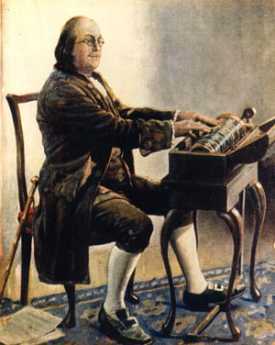
|
| Ben Franklin's Glass Armonica |
Everyone knows Ben Franklin spent a lot of time holding a wine glass. Evidently, he noticed a musical note emerges if you run your finger around the open mouth of the drinking glass, and systematically studied how the tone can be varied by varying the level of liquid in the glass. The same variation in emitted tone relates to variations in the thickness of the glass. So, he set up a series of different sized glasses impaled on a horizontal broomstick, enough to cover three octaves, rotated the broomstick with a treadle like those used for spinning wheels -- and made music. The tone has a haunting penetration to it, which induced both Beethoven and Mozart to write special compositions for the harmonica, and the Eighteenth Century went wild with enthusiasm.
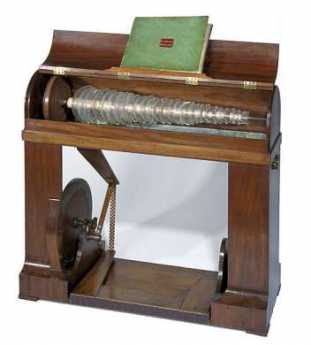
|
| Glass Armonica |
Unfortunately, a number of the young ladies who played the armonica went mad. We now recognize that since the finest crystal glass was used, with very high lead content, the mad ladies were suffering from lead poisoning after repeatedly wetting their fingers on their tongues. As a matter of fact, port wine at that time was stored in lead-lined casks, resulting in the same unfortunate consequences, which included stirring up attacks of gout. Franklin himself was a famous sufferer from gout, which was more likely related to the port wine than playing the harmonica, in his particular case.
Anyway, the reputation for inducing madness added to the spooky sort of sound the instrument made, attracting the attention of a montebank named Franz Anton Mesmer, who falsely claimed to be the father of hypnotism. Mesmer enhanced the society of his stage performances by hypnotizing subjects while an assistant played the harmonica, meanwhile relating all sorts of wild tales about animal magnetism. This was pretty sensational at the time until a young man in an audience suddenly died. It is now speculated that the victim probably had an epileptic seizure, but the news of this public fatal event pretty well finished Mesmer as an evangelist and the harmonica as a musical instrument.
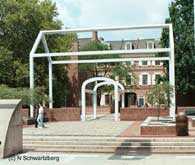
|
| Franklin Court |
There's a replica of an armonica on display in the Franklin Court Museum around 3rd and Chestnut, which we are vigorously assured is not made with leaded crystal glass. The Park Rangers put on two daily performances by request, at noon, and 2:30 PM.
Perth Amboy Revisited
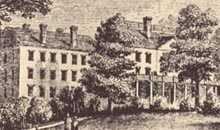
|
| Perth Amboy |
It's now moderately complicated to find Perth Amboy, New Jersey, even after you locate it on a map. Like New Castle DE it flourished early because it was on a narrow strip of strategic land, and like New Castle, eventually found itself cut off by a dozen lanes of highways crowded together by geography. It's an easy drive in both cases only if you make the correct turns at a couple of crowded intersections. Both towns were important destinations in the Eighteenth century, but by the Twentieth century, both were pushed aside by traffic rushing to bigger destinations. Industrialization hit the region around Perth Amboy somewhat harder than New Castle, destroying more landmarks, and bringing to an end its brief flurry as a metropolitan beach resort. If you aspire to preserve your Eighteenth-century glory, it's easier if you don't have too much progress in the Nineteenth. In Perth Amboy's defense, it must be noted that Jamestown and Williamsburg, Virginia had just about totally disappeared when noticed by Charles Peterson and John Rockefeller, but neither of those towns was run over by Nineteenth century industrialization. So, while New Castle has treasures to preserve and display, Perth Amboy seems to have only the Governor's mansion like the one notable building to work with. William Franklin, the illegitimate son of Benjamin, was the royal governor installed in this palace shortly before 1776.

|
| Governor's mansion in Perth Amboy |
While it is true that some wealthy local inhabitants did a lot to restore and maintain New Castle (and Williamsburg), the Governor's mansion in Perth Amboy was bought and made the home of Mathias Bruen, who is 1820 was thought to be the richest man in America. If Bruen had only had the necessary imagination and generosity, this was probably the best moment for Perth Amboy to have had a historical restoration. Instead, he added some unfortunate features to the mansion; it later became a hotel, and later on, an office building. Public-spirited local citizens are now trying to set things right, but the costs are pretty daunting. Someone has to find an inspired Wall Street billionaire like Ned Johnson to make over an entire town. Occasionally, a state government will do it, as has been done with Pennsbury. Or a national organization might become inspired, as happened with Mt. Vernon and Arlington. Its present state of peeling paint and makeshift repairs suggests uninterest in Perth Amboy's Governor Mansion by the State, and the absence of whatever it is that occasionally inspires fierce and determined local leadership. Perth Amboy needs some help and needs to forget about its handicaps. Sure, it's hard to commute anywhere, it's even hard to drive across the highways to the countryside. The bluff on the promontory was once quite arresting, now a rusting steel mill occupies that spot. Other than that, it doesn't look ominous or dangerous at all. It's just forgotten.
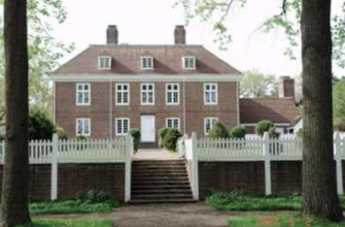
|
| Pennsbury Mansion |
Aside from the Royal Governor's former mansion, it is hard to find a historical marker or monument in this scene of former prosperity and glory, but there is one. Down on the beach is a bronze plaque, commemorating the 150th anniversary of the founding of -- Argentina. So there's a clue, which is not difficult to associate with all of the Hispanic names on the stores, and the Hispanics in evidence on all sides. They all seemed to know that this was once the capital of New Jersey, seemed pleased with it, and could point out the famous building. They are pleasant and friendly enough. Perhaps even a little too comfortable. Because, as William Franklin's famous father once said, all progress begins with discontent.
Parliament Provokes a Revolution
In some medical circles, it is postulated that George III was psychotic, possibly suffering from an inherited rare condition called porphyria.
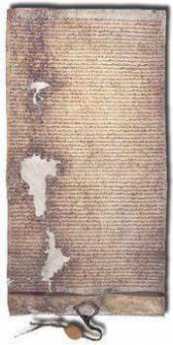
|
| Magna Carta |
That's pretty conjectural, but it is certainly true that his mother egged him on to be a real king, a real force reversing that steady decline in the Monarchy's personal power which began with the Magna Carta. By the time in question, however, so much power had already gravitated into the hands of Parliament that the King could not act in any major way without their consent. Even today, Cabinet Ministers are spoken of as King's ministers but are in fact appointed by leaders of the majority party in Parliament. Some in Parliament, like Edmund Burke, were almost persuasive in resisting the Ministry, urging colleagues to seek reconciliation with the colonies. George III did still retain the power to appoint his favorites to important positions and used this patronage extensively to control the country. Political party chieftains, on the other hand, retained and retain today the power to nominate the party candidate for Parliament in any particular district. The leadership thus selects the members of Parliament, who can, in turn, overturn the leadership only if they dare. Real decisions were largely in the hands of party chieftains, but perhaps to some extent, the Crown, depending on the Monarch's shrewdness in distributing patronage among the party chieftains.
Across thousands of miles of dangerous ocean, the English colonies had changed from the weedy wilderness in the Sixteenth century, into thriving and prosperous small civilizations in the early Eighteenth. Transatlantic communication did not substantially improve in that interval, but colonial population grew to over a million, many of them native-born in the colonies, with increasingly large numbers of immigrants from other nations. Loyalty to the Monarch inevitably declined. True, they spoke English, revered England, but many urgent local issues were difficult to administer at such a distance, encouraging a mentality of self-governance. France, by now at war with England on the Continent, operated on a grand plan of interior encirclement, from Quebec and and Great Lakes, down the Mississippi to New Orleans. The English coastal settlers needed peace with the Indians of the interior;
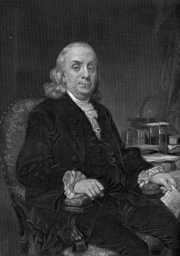
|
| Benjamin Franklin |
the French did not scruple to stir up massacres and Indian warfare. All wars are expensive, the French and Indian war particularly so. After defeating the French, the British were put to the protracted expense of building frontier defenses. Although the British were anxious to attract English-speaking colonists who would defend America for England, it was obvious some of the settlers were becoming very rich. Surely these people could not object to paying taxes for their own defense. In retrospect, it seems remarkably naive of the British to think it was that easy. Americans did not want to pay taxes because they did not want to pay taxes. They settled on the stance of "No taxation without representation" and like Franklin and the Penn family, many really believed in it. That slogan was particularly effective after it became apparent that Parliament wasn't about to give remote colonists reciprocal power in Parliament to interfere with affairs in the British Isles. With Parliament adamantly refusing to dilute its own power, "No taxation without representation" was a neat rhetorical box which meant, "No taxation." Contemporary English historians now throw up their hands in despair that so few members of George III's government had Burke's vision or even the normal wiles of diplomacy. But that understates the hidden political agenda. Parliament just pushed ahead with fairly nominal taxes, but they did so to curtail the independence of colonial legislatures.
The Stamp Act of 1764. It could be argued that Navigation Acts nothing new; earlier versions were first passed in 1651, intended to thwart Dutch trading. They prohibited foreign trade with the British home islands. After fifty years in 1703 similar restraints were extended to trade with the colonies, particularly molasses in the Caribbean area. No outcry was made as these restraints, aimed at retaining the Britishness of British colonies, were occasionally modified and extended over the next sixty years.

|
| Thomas Penn |
After a century in 1764, however, the Stamp Act was passed, producing modest revenue but imposing a crippling set of headaches by requiring special papers to transact private business. The uproar was enormous and legitimate, focused mostly on the tangle of red tape needlessly imposed. By shifting taxation from trade to paperwork transactions, suspicions were plausible that the Ministry was scheming something obscure. The Stamp Act was hastily repealed, even before Benjamin Franklin and Thomas Penn recognized its unpopularity and were still to some extent defending it in 1766. Franklin apparently saw the Stamp Act as an opportunity to appoint his friends as stamp agents. Local uproar in Pennsylvania was apparently orchestrated by William Bradford, who in addition to having been Franklin's former competitor in the printing business, was the owner of the London Coffee House at Front and Market. No other prominent colonial leader seems to have been involved in the agitation, and it is remotely conceivable that uproar originated with Bradford alone. More likely, Bradford was merely an opportunist in a genuinely popular uprising. With the familiar maneuvering characteristic of politicians, Franklin took popular credit for defeating the Stamp Act with some skillful criticism of it, while John Penn gained credit with the King for representing Pennsylvania's relative calm about it, compared with other colonies. In Pennsylvania at least, the uproar quickly subsided after the repeal of the Act.
The Townshend Navigation Acts of 1768.In 1766 the Grenville Ministry was replaced by that of Rockingham, then soon by Pitt, who were anxious to disavow the unpopular Stamp Act, but nevertheless needed colonial revenue, and needed a few unpleasant laws to prove that Parliament could not be intimidated by colonial squawking.
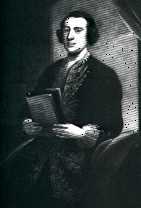
|
| Charles Townshend |
Charles Townshend, the brilliant, vindictive, Chancellor of the Exchequer then proposed taxes on glass, painter's lead, paper, painter's colors, and tea. The underlying political purpose of these taxes was to provide revenue for paying British colonial administrators directly, rather than depend on the Colonial legislatures to pay them. The Legislatures had long played a game of withholding payments, sometimes even the salaries of Judges and Royal Governors, when they disapproved of projects devised in London. The very predictable uproar provoked by the Townshend Acts propelled John Dickinson into prominence with a pamphlet called Letters From a Pennsylvania Farmer, which popularized the idea of "nonimportation", essentially a boycott of British products. Unintentional nonimportation was in fact the effect of the laws, clogging the ports with paralyzed trade goods. Rather than Dickinson's lofty principles, a little-noticed act of 1764, prohibiting the printing of paper money, paralyzed trade. There simply was not enough available coinage to pay these taxes, which finally pushed the primitive transaction system beyond its capabilities. From the viewpoint of modern economics, a heavy unbalance between imports and exports could not be rebalanced by flows of capital. The disastrous Townshend Acts were mostly repealed in 1770, but the British government was getting in deeper and deeper, discrediting itself at every turn. To retreat but still save face, they repealed all the taxes except the one on tea.
The Tea Act of 1772. To a certain degree, the uproar over the face-saving tax modifications on tea was a pretext for confused but radical colonists who were spoiling for a fight about difficulties they tended to personalize. The act actually lowered the effective taxes on tea, and at first Whig radicals were hard put to find a reason for outrage about lowering the price of tea. However, Bradford and his London Coffee House cronies (Mifflin, Thomson) were imaginative, and soon stampeded a mob scene in Philadelphia, where for a time the populace had seen nothing to get worked up over. Rush and Dickinson joined the chorus; the public feeling was stirred to a frenzy not easily reversed.
The really substantive issues involved were created by several years of Townshend Duties and other forms of import restriction. Laws to ensure the Britishness of British colonies created pleasant opportunities for colonial artisans and craftsmen, difficult hardships for importers. But these dislocations, whether welcome or unwelcome, firmly exposed the underlying truth that they caused all colonists to pay higher prices for goods. Adam Smith was not to publish his Wealth of Nations until 1776, so in this case the proof preceded the theory. The colonists were effectively asked to pay higher prices for everything, in order to increase Britishness and to billet soldiers they could not command. Once that cat was out of the bag, attitudes could never be the same. On the English side of the ocean, the question was framed as colonist unwillingness to contribute to the cost of their own defenses. The two slanted perceptions hardened to the point where arrogance confronted defiance, suggesting combat to both of them.
In the case of tea, taxes and import restrictions were intended to promote English tea over Dutch tea; in fact, they stimulated smuggling. Smuggling grew to a point that vast quantities of tea were stranded in the warehouses of the British East India Company, and trade balances of the British Empire were undermined. By reducing taxes, Parliament made East India tea cheaper than smuggled tea. Going perhaps one step too far, middle-men in the tea import business were cut out of the loop by appointing favored direct agents. In Philadelphia, those were Henry Drinker and Thomas Wharton. Bradford and his group immediately set about intimidating these merchants with threats to burn them out, and the sea captains who worked for them, with threats of tar and feathers. The age of Reason was leaving Reason behind.
Poor Richard Plays Hardball
Several distinguished biographies of Benjamin Franklin have recently skirted his January 1774 confrontation with the British government in the "Cockpit" of Whitehall. Presumably, the exquisite details are too fancy and complicated for easy description, or possibly the cardinal significance of this intellectual duel is underestimated. It seems possible the American Revolution was declared by one man's making up his mind. A mind made up in one particular hour in one particular room, irrevocably, in front of the whole British Establishment.
The Archbishop of Canterbury was there, and so were Edmund Burke and Joseph Priestley. So were all the Privy Council, and most of British high society, giggling and hissing at his discomfort. Poor Richard stood there silent and impassive. The Enlightenment thought they were deciding his fate, but he was deciding theirs.
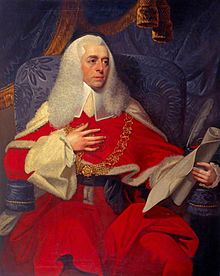
|
| Lord Alexander Wedderburn |
Franklin had published some letters he had promised not to publish, but they showed the British government in a very bad light. Alexander Wedderburn the Solicitor-General had deliberately orchestrated the meeting to shift the emphasis to Franklin's broken promise and away from British provocation of it. The room had been packed with highbrows promised a delicious treat, and Wedderburn's speech was meticulously planned as an entertainment for the intelligentsia. The man who discovered electricity was mocked as "conducting" the letters. And a famous man of letters was reminded that the ancient Athenians would brand three letters on the back of the hand of a thief: FUR, the name for a thief, an elaborate 18th Century pun making reference to fur hats and collars, which were the traditional symbol of printers. Wedderburn roused himself to the climactic announcement that the famous Roman, Plautus, had invented the famous derivative epithet, "Homo, triumph literarum," portentously meaning a three-letter man. The galleries of Whitehall tittered and applauded this thrilling attack. Franklin continued to stand, his face perfectly inscrutable to the end.
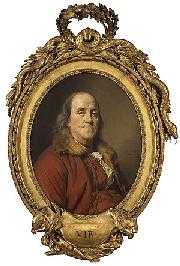
|
| Deplessis Portrait of Benjamin Franklin |
In his report back to the Massachusetts Legislature, Franklin used dismissive understatement to show he had not been asleep while he was impassive. He had been, he said, "the butt of his invective ribaldry for nearly an hour." After that, Poor Richard seemed to disappear from British society for nine months, seeing only close friends in his house, and then he sailed home to America, becoming a member of the Continental Congress the day he stepped off the boat. Meanwhile, he had arranged to have his portrait painted by Duplessis, the most distinguished painter in France, eventually to have it hang next to a painting by the same artist, of the King of France. To the original sketch for the portrait had been added a fur collar, the traditional emblem of the painter's guild. At the bottom, where a motto ordinarily would be found, was the single, three-letter Latin word, "VIR," or man, which would today be equivalent to he-man. And just so everyone would get the point, Franklin sent an otherwise anonymous letter to the newspapers, signed "Homo Triumph Literarum" in which he taunted that the friends of Mr. Franklin would have to agree he was a thief, as in the famous line of poetry that "He stole the lightning from the skies." But old Ben wasn't just bragging. Anticipating the baseball player Dizzy Dean by two hundred years, he was in effect saying "It ain't braggin' if you really have done it."
On Feb. 6, 1778 he and Silas Deane went over to the French palace to sign the Treaty of Alliance with the King of France. Instead of his usual brown suit, Franklin was wearing a faded blue one, and Deane questioned why he wore old clothes to such an important ceremony. "To give it a little revenge," was the answer. "I wore this suit on the day Wedderburn abused me at Whitehall." The true depth of Franklin's feelings would never have been known if Deane had not asked.
As a reminder, the Treaty they were signing said, "The essential and direct end of the present defensive alliance is to maintain effectually the liberty, sovereignty, and independence of the said United States. . . ." All in all, not a bad academic performance for a man who never went past the second grade in school.
REFERENCES
| The Invention of Air: A Story of Science, Faith, Revolution,and The Birth of America, Steven Johnson ISBN: 978-1-59448-852-8 | Amazon |
Franklin Declares Independence a Year Early
Joseph Priestly became a close friend of Benjamin Franklin almost as soon as they met. Priestly was an Anglican clergyman who broke loose and formed the Unitarian Church, and meanwhile, his scientific discoveries also entitle him to be called the Father of Chemistry. Franklin, of course, was the discoverer of electricity; it would be hard to be sure which of the two was more brilliant. In July, 1775, Franklin wrote the following letter to Priestly, which makes a trenchant case that the American colonies should, and would, break away from England. Since some legal authorities, following Lincoln's lead, maintain that Jefferson's manifesto "informs" the United States Constitution, it might be well to begin referring to this letter as an even clearer statement of the mindset of America's founding leaders.
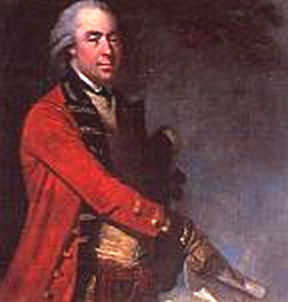
|
| General Thomas Gage |
" Dear Friend (wrote Franklin),
"The Congress met at a time when all minds were so exasperated by the perfidy of General Gage, and his attack on the country people (i.e. Of Lexington and Concord), that propositions of attempting an accommodation were not much relished; and it has been with difficulty that we have carried another humble petition to the crown, to give Britain one more chance, one opportunity more of recovering the friendship of the colonies; which however I think she has not sense enough to embrace, and so I conclude she has lost them forever.
"She has begun to burn our seaport towns; secure, I suppose, that we shall never be able to return the outrage in kind. She may doubtless destroy them all; but if she wishes to recover our commerce, are these the probable means? She must certainly be distracted; for no tradesman out of Bedlam ever thought of increasing the number of his customers by knocking them on the head; or of enabling them to pay their debts by burning their houses.
"If she wishes to have us subjects and that we should submit to her as our compound sovereign, she is now giving us such miserable specimens of her government, that we shall ever detest and avoid it, as a complication of robbery, murder, famine, fire, and pestilence.
"You will have heard before this reaches you, of the treacherous conduct to the remaining people in Boston, in detaining their goods, after stipulating to let them go out with their effects; on pretence that merchants goods were not effects; -- the defeat of a great body of his troops by the country people at Lexington; some other small advantages gained in skirmishes with their troops; and the action at Bunker's-hill, in which they were twice repulsed, and the third time gained a dear victory. Enough has happened, one would think, to convince your ministers that the Americans will fight and that this is a harder nut to crack than they imagined.
"We have not yet applied to any foreign power for assistance; nor offered our commerce for their friendship. Perhaps we never may: Yet it is natural to think of it if we are pressed.
"We have now an army on our establishment which still holds yours besieged.
"My time was never more fully employed. In the morning at 6, I am at the committee of safety, appointed by the assembly to put the province in a state of defense; which committee holds till near 9, when I am at the Congress, and that sits till after 4 in the afternoon. Both these bodies proceed with the greatest unanimity, and their meetings are well attended. It will scarce be credited in Britain that men can be as diligent with us from zeal for the public good, as with you for thousands per annum. -- Such is the difference between uncorrupted new states and corrupted old ones.
"Great frugality and great industry now become fashionable here: Gentlemen who used to entertain with two or three courses, pride themselves now in treating with simple beef and pudding. By these means, and the stoppage of our consumptive trade with Britain, we shall be better able to pay our voluntary taxes for the support of our troops. Our savings in the article of trade amount to near five million sterling per annum.
"I shall communicate your letter to Mr. Winthrop, but the camp is at Cambridge, and he has as little leisure for philosophy as myself. * * * Believe me ever, with sincere esteem, my dear friend, Yours most affectionately."
[Philadelphia, 7th July, 1775.]
REFERENCES
| The Invention of Air: A Story of Science, Faith, Revolution,and The Birth of America, Steven Johnson ISBN: 978-1-59448-852-8 | Amazon |
Philadelphia in '76
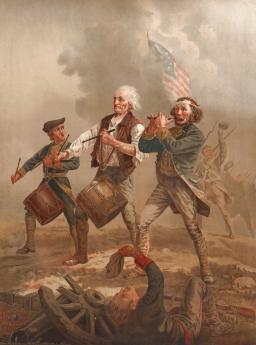
|
| Spirit of '76 |
Although the origins of the American Revolution are subtle and complex, even historically controversial, we have more or less united in the idea that we "declared" our independence from Britain on July 4, 1776. We then spent eight years convincing the British we were serious and have been independent ever since. Reflect, however, on the fact that fighting had been going on for a year in Massachusetts, and that Lord Howe's fleet had set sail a month before the Declaration, actually landing on Staten Island at just about the same time as the Fourth of July. Add to that the fact that only John Hancock actually signed the document on July 4th, and some of the signers waited until September. You can sort of see why John Adams never got over the idea that Thomas Jefferson had quite a nerve implying the whole thing was his idea. What's more, New England subsequently had to live with a President from Virginia for thirty-two of the first thirty-six years of the new nation. Philadelphia may have been the cradle of Independence, but that was not because it was a colony hot for war, dragging the others along with it. It was the largest city in the colonies, centrally located. It had a strong pacifist tradition, and it had the most to lose from a pillaging enemy war machine.
New England was in the position of having started hostilities, and about to be subdued by overwhelming force. The Canadians were not going to come to their aid, because they were French, and Catholic, and enough said. What the New Englanders wanted was WASP allies, stretching for two thousand miles to the South. By far the largest colony was Virginia, which included what is now Kentucky and West Virginia; it even had some legal claims for vastly larger territory. The rest of the English colonies had plenty of assorted grievances against George III, and almost all of them could see that America was rapidly outgrowing the dependency on the British homeland, without any sign that Parliament was ever going to surrender home rule to them. Perhaps it was unfortunate that New Englanders were so impulsive, but it looked as though a confrontation with the Crown was inevitably coming, and without support, New England was likely to be subdued like Carthage.
And then, the last hope for flattery and diplomacy, for guile and subtlety, stepped off the boat. Benjamin Franklin, our fabulous man in London, had it "up to here" with the British ministry. He finally was saying what others had been thinking. It was now, or never.
Tom Paine: Rabble-Rousing Quaker?
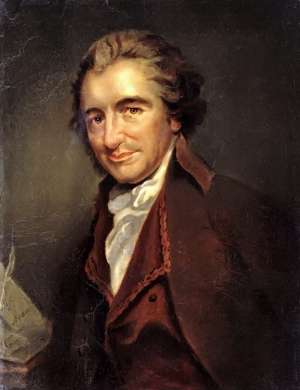
|
| Thomas Paine |
Thomas Paine (1737-1809) was born of Quaker parents, which makes him a "birthright" Quaker. Children born into Quaker families are accustomed to the subtleties of speech and behavior of that religious sect, ultimately growing up to be the main nucleus of tradition. Knowing what they are getting into, however, they are more likely to rebel against it than others who, coming to the religion by choice rather than by birthright, are commonly described as "Convinced Friends."
These stereotypes may or may not explain some of Tom Paine's paradoxes. He certainly was not a pacifist, a quietest, or a plain person. He was an important historical figure; Walter A. McDougall, the famous University of Pennsylvania historian, feels the American colonists might have sputtered and complained about Royal rule for decades, except for Paine. The American Revolution happened when it happened because Tom Paine stirred up a storm.
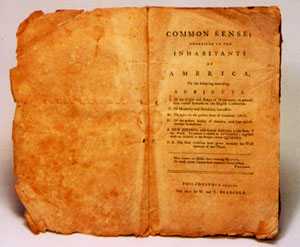 |
| Common Sense |
According to the traditional way of telling his story, Tom Paine was a ne'er do well failure in London. He ran into Benjamin Franklin, who advised him to emigrate to America in 1775, and within a year his pamphlet called ""Common Sense"" had sold 150,000 copies (some even claim 500,000), galvanizing the public and the Continental Congress into action on July 4, 1776. George Washington read Paine's writings to his troops on the eve of the Battle of Trenton. After that, Paine got mixed up with the French Revolution, and apparently became a severe alcoholic, proclaiming atheism all the way. Although Thomas Jefferson remained friendly to the end, Benjamin Franklin essentially told him to go leave him alone, and Washington would cross the street to avoid him. According to the usual line, Tom Paine was a big-mouthed rabble-rouser and a drunk, who traveled the world looking to stir up revolutions.
However, that cannot possibly be a fair recounting of the whole story. Thomas Alva Edison, whose opinion certainly counts for something, regarded Tom Paine as one of the greatest American inventors, creating the first steel bridge, the first hollow candle, and the principle of central drought in heating. Paine early became a close friend of the Hicks family, the central figures in modern Quakerism; it seems a little unclear how much Tom Paine was reflecting the views of Elias Hicks, and how much Hick site Quakerism can be said to have originated in the thinking of Thomas Paine. Paine was very far from being an atheist. In fact, both he and Hicks believed so fervently in the universality of God that both of them scorned the rituals, paraphernalia, and transparent superstitions of -- religion.
Furthermore, Paine was able to reach the rationalists of The Enlightenment with arguments which cut to the heart of Royalist loyalties. America was too big and too remote to be ruled by a king, particularly one who abused his privileges behind a claim of divine right. William the Conqueror, for example, never denied he was a usurper. One way or another, every king must earn his throne. So, as for feudalism and hereditary aristocracy, what was King George doing with all those German mercenaries? After two centuries of democracy, most Americans are too far from feudalism to appreciate the legitimacy of military meritocracy. Whatever King George was up to, he didn't stand for empowerment of the best and the brightest Englishmen, who in fact might well be opposed to him. If you wanted to get to Virginia aristocrats, Boston sea captains, and Kentucky backwoodsmen, that was exactly the line to take in Common Sense.
Unfortunately, Citizen Tom Paine was a freethinker and couldn't be quiet about it in his later books. He didn't like the way the Old Testament Hebrews hungered for a king. He didn't like the way the New Testament sprinkled miracles on top of unassailable moral principles, and he particularly didn't like the claim that God got an unmarried girl pregnant. He antagonized almost every established religion by proclaiming that no one should make a living from religion. He wrote a book called Age of Reason proclaiming all these freethinking ideas, which struck Ben Franklin as such a stupid thing to do that he would not discuss it, beyond saying that even if he should succeed in convincing people to abandon religion, just imagine how much worse they would probably behave without it. George Washington, who hadn't a trace of intellectualism about him, more accurately portrayed the typical American revulsion at anyone who was so unprincipled as to say such unorthodox things in public. Jefferson distanced himself for political reasons rather than intellectual ones. Franklin thought Paine was a fool. Washington and the rest of the country thought he was a viper.
It would have to be conceded -- by anyone -- that Tom Paine was self-destructive, even sassing Robespierre while in a French prison. How is it such a loose cannon could get the American public off dead center and make the Continental Congress grasp the nettle of revolution, in less than a year? Let's go back to how he came to America in the first place. Franklin sent him.
Then he promptly got a job as editor of the Pennsylvania Gazette, which Franklin had owned for thirty years. And then, in an era when the largest city in America had a population of twenty-five thousand, and the printing presses of the day were able to turn out three or four pages a minute, he sold 150,000 copies of the fifty-page "Common Sense." Who but Franklin, in private partnerships with sixty printers, could have possibly authorized, financed, and printed 150,000 copies of a colonial pamphlet? In order to find that much printing capacity in colonial America, a great deal of other printing had to lose its place in the queue.
Even today, a best-seller is defined as a book that sells 50,000 copies, and it generally takes three years to get it done. In the Eighteenth Century, for an unknown alcoholic to get off the boat and find a publisher for a best seller in a few weeks is hard even to imagine. Unless he had important help.
What Happened in Philadelphia on July 4, 1776?
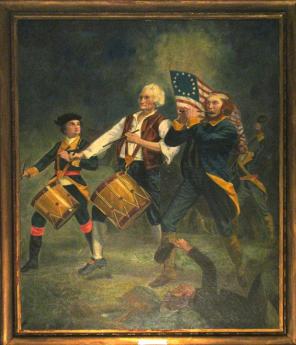
|
| Spirit of 76' |
The American colonies were growing too big, too fast, and the British Empire had too many international distractions, to have smooth relationships across three thousand miles of ocean, using uncertain communications available in the late Eighteenth century. Friction and misunderstanding were inevitable without far more statesmanship than either side thought was necessary. So, when the Continental Congress dispatched George Washington to Boston with troops to defend rebellious Massachusetts at Lexington, Concord, and Bunker Hill, it was hard for the British to believe the colonists were merely helping out one of their distressed neighbors. It seemed in London that the thirteen colonies had united, formed not only an army but a government, and gone to war. In December 1775 England passed the Prohibitory Act, essentially declaring war, and organized a huge invasion fleet to put down the rebellion. It now seems hard to understand the first notice the Americans had of this huge over-reaction was a private letter to Robert Morris from one of his agents in March 1776; no warnings, no negotiations, no attempt to investigate problems and correct them. The British just sent a fleet to settle this problem, whatever it was. It's all very well to say the Americans should have known they were playing with fire. They didn't see it that way; they were being self-reliant, responding to attack. In June 1776 British patrol frigates were skirmishing in the Delaware River; late in the month, British troops landed on Staten Island. The American reaction to all this was a muddle of confusion. A few were delighted, most of the rest were amazed or appalled.
Although the deeper strategic origins of the American Revolution are subtle, complex, and controversial, there is far less muddle about what happened on July 2, 1776, publicly proclaimed two days later. Adopting a resolution written by Richard Henry Lee of Virginia, the Thirteen Colonies stated they had now clarified their goals in the controversy with the British monarchy. For a year before that, the Continental Congress had been corresponding with each other and meeting in Carpenters Hall with the goal of achieving representation in the British parliament -- "No taxation without representation". The model for most of them was based on the Whig agitation for Ireland -- for a local parliament within a larger commonwealth. But the passing of the British Navy in Halifax, Nova Scotia, and then the actual appearance of seven hundred British warships in American waters showed that not only was Parliamentary representation out of the question, but King George III was going to play rough with upstarts. The new goal was no longer just representation, it was independence. If we were going to resist a military occupation at the risk of being hanged as traitors, we might as well do it for something substantial. The meeting had a number of Scotch-Irish Princeton graduates, whose basic loyalty to England had long been divided. Pacifist Pennsylvania, chief among the wavering hold-outs, was mostly won over by its own Benjamin Franklin, who was optimistic the French would help us. Even so, both Robert Morris and John Dickinson refused to sign the Declaration; Franklin persuaded both to abstain by absence, which created a majority of the Pennsylvania delegation in favor. That's a pretty slim majority for a crucial decision. Franklin was soon dispatched back to Paris to make an alliance; Washington was dispatched to hold off that British army in the meantime. Jefferson was designated to write a proclamation, which even after editing is still pretty unreadable beyond the first couple of sentences. Meeting adjourned. This brief account may not qualify as a serious examination of the causes of the American Revolution, but it comes close to the way it seemed to the colonist in the street.
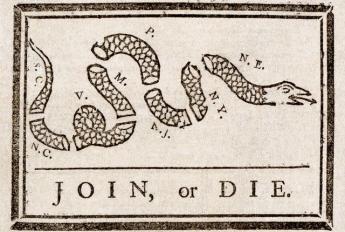
|
| Colonist's Complaint |
The rebels then spent eight years convincing the British they were serious and have been independent ever since. But, just a minute, here. Reflect on the fact that fighting had been going on for a year in Massachusetts, and that Lord Howe's fleet had set sail a month before the Declaration, actually landing on Staten Island at just about the same time as the Fourth of July. Add the fact that only John Hancock actually signed the document on July 4th, and some of the signers even waited until September. You can sort of see why John Adams never got over the idea that Thomas Jefferson had a big nerve implying the whole Revolution was his idea. What's more, there's a viewpoint that New England subsequently had to endure a President from Virginia for thirty-two of the first thirty-six years of the new nation because loud talk from New England still made the rest of the country nervous. Philadelphia may have been the cradle of Independence, but that was not because it was a colony hot for war, dragging others along with it. Rather, it was the largest city in the colonies, centrally located. It had a strong pacifist tradition, and it had the most to lose from a pillaging enemy war machine. When Independence was finally declared the goal, many of Philadelphia's leading citizens moved to Canada.
New England had started hostilities and was about to be subdued by overwhelming force. The Canadians were not going to come to their aid, because they were French, and Catholic, and enough said. What New England and the Scotch-Irish needed were WASP allies, stretching for two thousand miles to the South. By far the largest colony was Virginia, which included what is now Kentucky and West Virginia; it even had some legal claims for vastly larger territory. Virginia was incensed about its powerlessness against British mercantilism, especially the tobacco trade. The rest of the English colonies had plenty of assorted grievances against George III, and almost all of them could see that America was rapidly outgrowing dependency on the British homeland, without a sign that Parliament was ever going to surrender home rule to them. It was perhaps unfortunate New Englanders were so impulsive, but it looked as though a military confrontation with the Crown was inevitably coming. Without support, New England was likely to be torched, as Rome once subdued Carthage.
And the last hope for an alternative of flattery and diplomacy, for guile and subtlety, had stepped off the boat a year earlier. Benjamin Franklin, our fabulous man in London, arrived with the news he had finally had it "up to here" with the British ministry. He was a man who quietly made things happen, carefully selecting his arguments from amongst many he had in mind. In retrospect, we can see that he held the idea of Anglo-Saxon world domination as far back as the Albany Conference of 1745, and could even look forward to America outgrowing England in the 19th Century. His behavior at the Constitutional Convention of 1787 strongly suggests he never completely gave up that long-term dream. Just as Edmund Burke never gave up the idea of Reconciliation with the Colonies, Benjamin Franklin never quite gave up the idea of Reconciliation with England. While John Dickinson and Robert Morris resisted the idea of Independence down to the last moment, Franklin took a much longer view. For the time being, it was necessary to defeat the British, and for that, we needed the help of the French. In 1750, America joined with the British to toss out the French. And then in 1776, we joined the French to toss out the British. Franklin didn't always get his way. But Franklin was always steering the ship.
Battle of the Clouds: September, Remember
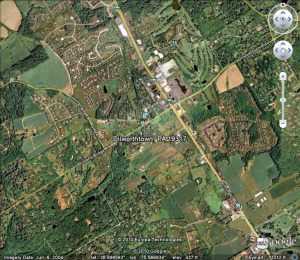
|
| Dilworthtown |
Weather satellites, television and so on have taught us much about hurricanes that was unknown in 1777. Benjamin Franklin, it should be noted, was the first to observe that Atlantic Coast "Nor'easters" actually begin in the South and work North, even though the wind seems to be blowing in the opposite way; what's moving toward the northeast is a low-pressure zone. We now know that hurricanes begin in Africa, travel West and then veer North when they reach Florida. A great deal is still to be learned about hurricanes, but the most important thing about their timing is contained in a maritime jingle:
June, too soon.
July, stand by.
And then: September, remember.
October, all over.
Along the Atlantic east coast, the end of August to the middle of September, is hurricane season. That's when houses blow down in Florida, and heavy rains hit Pennsylvania. Admiral Howe might have had some clue to this, since Franklin made his observation around 1750, and storms are important to Admirals. But very likely his brother the General just thought it was one of those things when the British landing at Elkton, Maryland in late August 1777 was greeted with an unusually severe downpour of rain. Howe had planned to surprise Philadelphia from the rear by hitting the ground running on horseback. However, he underestimated the debilitating effect on the horses of three weeks at sea on sailboats; to unload and forage horses during a hurricane was almost too much for the plan. For that purpose, he had given orders for the troops to disembark without waiting to pitch camp, or unpacking their gear. But the drenching rain gave Washington several extra days to organize a defense, although he has been given too little credit for the strenuous accomplishment of moving an army from Bucks County to the banks of the Brandywine in that weather. Howe, whose trademark was surprise, deception, outflanking, had anticipated a sudden cavalry thrust into the backyards of unprepared Philadelphia. What he got was 2000 casualties in the biggest battle of the Revolutionary War, against Washington's well-prepared defense along the steep-sided Brandywine Creek.
Howe won this battle, in the sense that Washington was forced to withdraw, because Howe employed another British military trademark, of driving his own troops beyond humane limits in a huge outflanking movement. The countryside around Kennett Square is hilly and broken almost to West Chester, and the American Army felt reasonably prepared along a front of ten or twelve miles. But Howe drove the main force of his army seventeen miles to the north, to Dillworthtown, before turning the unprepared American right flank. And, in the now hot August weather in full uniform and battle pack, the drive continued for twenty-four consecutive hours until Washington saw he had to withdraw. This was what the British meant when they boasted of seasoned regular troops; you win by enduring more than your opponent can endure.
One has to have equal admiration for Washington. Although he was dislodged from his position, losing the opportunity to catch the British in a hostile region without a reliable source of supplies once the fleet weighed anchor, he preserved his army of marksmen and deer hunters intact during the retreat. The two armies started at roughly the same size, and Washington had only about 1300 casualties; his men had more certain supply sources, and they were fighting for their homes. The British, somewhat outnumbered, had the prospect of fighting their way without resupply through an enemy's home territory, capturing the enemy's capital, but still facing the possibility that the British fleet might not get past the Delaware River defenses. If that happened, they could celebrate their victory by starving to death. Just about the only weakness of the Continental Army was its discomfort with bayonet warfare. They could hit a squirrel at a hundred yards, but those long bayonets on the end of very long muskets were designed to protect foot soldiers from cavalry charges. It takes training to put the butt of the musket against a stone on the ground, hold your ground against an oncoming gallop of horsemen, and trust that at the last moment the horses will rear back and throw the riders. But it also takes naked bravado to wave a sword and ride full tilt into a forest of pointing bayonets, trusting that at the last moment the defenders will break and run.
But Washington knew what he was doing. He pulled the troops back to Chester, then over the Schuylkill to the Germantown encampment at Fox and Queen Lane, then up the Schuylkill to Norristown, the first ford in the river that Howe must use when the boats and bridges were destroyed. The river would hold the British while the Americans came at them from the rear; this was essentially the same river strategy he used at the battle of Trenton. Washington picked his battlefield in Chester County and got ready to fight the second installment of the Battle of Brandywine. The campus of Immaculata University now occupies the site.
And then it rained, again. Hard. The gunpowder on both sides was soaked, useless. In what has come to be known as the "Battle of the Clouds", the fighting was called off by mutual agreement. The second hurricane of the year had arrived, and Washington more or less helplessly had to watch Howe take over Philadelphia unopposed. He lost the capital, provoking dismay among the colonists, but his masterful strategy taught the British to respect him. When the British were later considering whether to hold or abandon Philadelphia, this growing respect for their adversary helped tilt their thinking toward prudence.
But that was not before Howe once more showed he too was not the lazy slacker that others had called him. General "Mad Anthony" Wayne was dispatched with fifteen hundred troops to hassle the rear of Howe's army. Wayne was confident he could hide his troops in the Radnor area where he had been brought up, but the region in fact had many Torys to report his movements. Howe ordered Major General Lord Charles Grey to take the flints from his troops' muskets, attack the American camp near Paoli's tavern in the night, and use only bayonets. Waynes' troops were scattered and slaughtered, in what came to be known as the Paoli massacre.
Franklin in Paris

|
| Benjamin Franklin |
Adlai Stevenson once observed that every diplomat must make a solemn pledge -- to drink for his country. Ambassadors represent their country to chiefs of state, and everybody involved must participate in constant social masquerades to ease the strain of dealing with people whose interests may conflict with his own. In fact, when some ambassador indelicately blurts out the truth, he can be expected to be declared "persona non grata", and replaced.
There are plenty of reasons to suppose that Franklin disliked the French. On several occasions, he had rallied public opinion, raised troops and even served in the Colonial forces during the French and Indian War. As a leader of the Pennsylvania Assembly, he had to cope with the activities of the French in western Pennsylvania, stirring up Indian massacres of Pennsylvania settlers. He very nearly lost his financial shirt helping General Braddock obtain horses and wagons, and surely had numerous acquaintances in the British Army slaughtered at Fort Duquesne. England was at war with France for years, and right up to 1774, Franklin spent most of his energies trying to bring the Colonies into tighter unity with the British throne. The purpose of such a union was primarily to ensure the protection of the Colonies against the French. The goal was always to ensure the protection of the Colonies against the French.
Having spent seventy years building up defenses against the French bogeymen, Franklin's about-face had been abrupt. Right up to the moment of confrontation with Wedderburn in the cockpit of Whitehall, Franklin had been struggling with the English to make America a full part of Great Britain, searching for an acceptable formula for taxing America for its own defense -- against the French and Spanish. After his public humiliation and a brief interval of contemplation, Franklin went home to join the Second Continental Congress, spending only a few months there to bring Revolution to a tipping point. Having succeeded largely because of his assurance that he could get the French to become allies, he promptly returned to Paris to make good on his assurances. Maybe he was a secret French-lover all that time, and maybe his expedition to Paris was just a ruse to let him enjoy a ten-year Parisian vacation. But the utter implausibility of that suspicion is exposed merely by voicing it. Furthermore, he had spent many years at the British Court on his quest to take Pennsylvania from the Penn family and give it back to the King, therein receiving a full education in the wiles and deceits of diplomatic life. He knew what to do, how to dress, how to talk, and what to disassemble as a negotiator. He had seen many diplomats fail in their missions and had a chance to observe what it took for others to succeed. He was forty years older than almost anyone he met, world famous before most of them were born.
So the late Harvey Sicherman, Philadelphia's local State Department alumnus, was almost surely right when he described Franklin as a spinner. He may have grown to like some particular Frenchmen and Frenchwomen, and he certainly enjoyed himself hugely. But to say he loved France is a stretch, while to say he hated most things which are uniquely French is not totally improbable. More likely, he was indifferent to all that, because he was there to do a job. His job description was to make himself charming, attractive, and persuasive to as many influential Frenchmen as he could find. And to wait for any diplomatic opportunities which George Washington might create on some distant battlefield.
When he first arrived in Paris, the military situation back home was bleak. The British had just defeated Washington on Long Island, the expedition against Canada had been a failure. For ten months, Franklin had to keep the American vision alive in Paris without evidence of military success at home. When Washington finally defeated the British at Trenton and Princeton, and particularly when Burgoyne was routed at Saratoga, Franklin pounced. Those victories were exaggerated suitably and celebrated wildly throughout all the social circles which Franklin had charmed for the previous year. Scientific and intellectual leaders, salon society, and even many members of the royal court were on his Rolodex, so to speak. They were useful levers of gossip and news to spread his reports in a suitable way. Paris was full of spinners, spies, and manipulators, but Franklin the old publisher knew how to dominate the news.
Even his famous love affairs could be viewed as having their purpose. Madam Brillon was forty years younger than Franklin, one of the most beautiful and musically talented women of the age. No doubt it was pleasure itself to charm this charmer, and no doubt his advanced age caused her husband to drop his guard. But Franklin knew very well what a stir it would make for a famous man his age to be linked in speculative gossip to a thirty-two-year-old celebrated beauty. That he could have made this conquest in spite of old age, gout, kidney stones and a very rudimentary knowledge of French, was deliciously worth talking about in naughty circles. And then one never knows. In a time of war, surrounded by spies and assassins, it would always be a good thing to have local friends who might warn him, hide him or help with an escape.
Franklin's association with

|
| Madame Helvetius |
Madame Helvetius was much the same in many ways, or at least John Adams thought so, but there are some major differences. In fact, if you discount the parts that offended Adams as largely dissembled, the Helvetius episode may have been the most truly significant relationship of Franklin's life. She was widowed, much closer to him in age, much more his equal in wit and attainment, and he actually proposed marriage to her. She refused him, for reasons we are not in a position to assess, but a marriage between an Austrian relative of Marie Antoinette to an elderly frontiersman might well have seemed too far a social stretch. Furthermore, there seems to be an important connection between the intellectual circle of revolutionaries who clustered with her and her former husband, and the impending French Revolution. The mother of LaRochfoucauld also ran a salon for the same group, attended by LaFayette and others who turned up in America during our revolution, and who associated with others whose names would in time seem like a recital of the leaders of the French Revolution. Franklin and Thomas Jefferson were both active with this group of rebels whose history goes back to the reign of Louis XIV. Jefferson was obviously influenced by them, Franklin's intellect was so much more powerful that it is possible that influence ran the other way. The thought has occurred to others that Franklin may have been mainly responsible for two revolutions, not just one. Even two centuries later, feelings run so high that the truth of the matter is not clear. From the point of view of Franklin's diplomatic triumphs, the existence and power of this group of French conspirators do raise a question of just who was using whom. And whose goals were ultimately served.
In any event, Franklin was quick to turn the Battle of Saratoga into a decision by France to become an open ally of the colonists, and the Battle of Yorktown into the Treaty of Paris granting independence to America. During all the years in between, Franklin was wheedling money and munitions secretly from the French, somehow using Haym Salomon to get the money out of France and Holland, around the British navy, and into the hands of the beleaguered Americans. As always happens, the money suffered some shrinkage in transit, for which many fingers were pointed at many reputations, including Franklin's.
The Franklin Inn
 Founded by S. Weir Mitchell as a literary society, this little club hidden on Camac Street has been the center of Philadelphia's literary life. 
|
Camac Street is a little alley running parallel to 12th and 13th Streets, and in their day the little houses there have had some pretty colorful occupants. The three blocks between Walnut and Pine Streets became known as the street of clubs, although during Prohibition they had related activities, and before that housed other adventuresome occupations. In a sense, this section of Camac Street is in the heart of the theater district, with the Forrest and Walnut Theaters around the corner on Walnut Street, and several other theaters plus the Academy of Music nearby on Broad Street. On the corner of Camac and Locust was once the Princeton Club, now an elegant French Restaurant, and just across Locust Street from it was once the Celebrity Club. The Celebrity club was once owned by the famous dancer Lillian Reis, about whom much has been written in a circumspect tone, because she once successfully sued the Saturday Evening Post for a million dollars for defaming her good name.
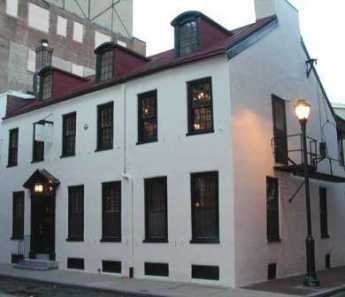
|
| The Franklin Inn |
Camac between Locust and Walnut is paved with wooden blocks instead of cobblestones because horses' hooves make less noise that way. The unpleasant fact of this usage is that horses tend to wet down the street, and in hot weather you know they have been there. Along this section of narrow street, where you can hardly notice it until you are right in front, is the Franklin Inn. The famous architect William Washburn has inspected the basement and bearing walls, and reports that the present Inn building is really a collection of several -- no more than six -- buildings. Inside, it looks like an 18th Century coffee house; most members would be pleased to hear the remark that it looks like Dr. Samuel Johnson's famous conversational club in London. The walls are covered with pictures of famous former members, a great many of the cartoon caricatures by other members. There are also hundreds or even thousands of books in glass bookcases. This is a literary society, over a century old, and its membership committee used to require a prospective member to offer one of his books for inspection, and now merely urges donations of books by the author-members. Since almost any Philadelphia writer of any stature was a member of this club, its library represents a collection of just about everything Philadelphia produced during the 20th Century. Ross & Perry, Publishers has brought out a book containing the entire catalog produced by David Holmes, bound in Ben Franklin's personal colors, which happen to be gold and maroon, just like the club tie.
The club was founded by S. Weir Mitchell, who lived and practiced Medicine nearby. Mitchell had a famous feud with Jefferson Medical College two blocks away, and that probably accounts for his writing a rule that books on medical topics were not acceptable offerings from a prospective member of the club. So there.
The club has daily lunch, with argument, at long tables, and weekly round table discussions with an invited speaker. Once a month there is an evening speaker at a club dinner, with the rule that the speaker must be a member of the club. Once a year, on Benjamin Franklin's birthday, the club holds an annual meeting and formal dinner. At that dinner, the custom has been for members to give toasts to three people, all doctors, including Dr. Franklin, Some sample toasts follow: Benjamin Franklin for whom we are named, was after all a club man. In his London years every Thursday he attended the Club of Honest Whigs, and every Monday a coffeehouse called the George and Vulture. His conviviality is part of my theme, but especially his congeniality with women. Scientist and statesman, of course. We nod to bifocals, lightning rod, storage batteries, daylight savings time, less smoky stoves, and a flexible urinary catheter (which he commissioned for his ailing brother from a Philadelphia silversmith). We bow to lending libraries, fire brigades, insurance associations, planned giving, philosophical society, and legislatures. Above all, he helped to design and invent the United States of America, and by example, to inspire the free and mobile society that inhabits our states. But tonight I celebrate his relationships with and his treatment of women. Let me dispose at once of an image of him as young playboy or old lecher. He was always responsible in his relationships. He acknowledged and raised his illegitimate son William (who as royal governor of New Jersey, loyal to the Crown, split with his father). He helped to raise and educate Temple Franklin, the bastard son of his bastard son, who stayed loyal to him as grandfather. His 44-year common law marriage with Deborah Read (an abandoned wife of another man) was a tender and practical bond. She bore two children and managed his print house and bookkeeping. She was half-literate and afraid of the ocean, and so may be thought to have been spared the high politics and intellectual life of England and France. In his duties overseas, Franklin was absent fifteen of the last seventeen years of her life. When she wrote him about rumors of other women, he answered, ".while I have my senses, and God vouchsafe me his protection, I shall do nothing unworthy the character of an honest man, and one that loves his family." His best biographers find nothing to stain his promise to Deborah. That is not to say that he lacked interesting friendships with other women. Four long and intense ones are worth special mention: one American, one English, and two French. Katie Ray was the first of his romantic "but probably never consummated flirtations." When they met, he was 48, she 28. Over the course of their lives, they exchanged more than 40 letters. He "made a few playful advances that [she] gently deflated." Claude-Anne Lopez describes the kind of bond he established, first with Katie, as "somewhat risque, somewhat avuncular, taking a bold step forward and an ironic step backward, implying that he is tempted as a man but respectful as a friend." She uses a French term for this --amitie amoureuse-- a little beyond the platonic, but short of the grand passion." Such a loving friendship he also had with Polly Stevenson. He was 51 when he met her; she, 18. Her intellectual quotient was high, like Katie, and he talked science with her. They exchanged 130 letters. She, as a widow, was at his deathbed 33 years later. Charles Wilson Peale came upon Franklin one day in London, and later sketched what he saw: sitting with a young lady on his knee. She is thought to be Polly. But we should not treat that as a tabloid photo. He was sincere in urging Polly to raise a family rather than pursue more learning. There is nothing as important "as being a good parent, a good child, a good husband, or wife." In Paris, as Ambassador to France, 1776-85, Franklin found two more mistresses of mind and soul. Mme. Anne-Louise Brillon was a famous harpsichordist and a supporter of the American Revolution. When they met, she was 33 and married; he 71 and a widower. In an eight-year relationship, he sent her 29 letters; she to him, 103. She finally turned aside his inquiries about a more corporeal relationship. But she wrote with affection that he demonstrated "a droll roguishness which shows that the wisest of men allows his wisdom to be perpetually broken against the rocks of femininity." Mme. Anne-Catherine Helvetius was a lively and beautiful widow near 60 when she met Franklin at age 73. He eventually went beyond the bounds of his usual dance between sincerity and self-deprecating playfulness. He ardently proposed marriage to her. She found this entreaty a bit wearying. But when in the winter of 1785 he finally departed France, she was there, visiting his home. So was Mme. Brillon; as well as Polly Stevenson and her three children; altogether a splendid "network of good will" with himself at the center. Jefferson, his friend, and successor in Paris noted on his last day before sailing that the ladies were smothering him with embraces. He told Franklin that as well as the duties transferred to him, he wished to have those privileges as well. But Franklin answered: "You are too young a man." Sisters and brothers of the Franklin Inn'let us toast Benjamin Franklin: his constancy with his wife, his well-contained passion, his well-expressed wit, his amitie amoureuse. May his example of loving friendship enfold and inspire the members of our club named for him. -- Theodore Friend At the Annual Dinner of the Franklin Inn Club Philadelphia, 18 January 2008 Based on: Walter Isaacson, Benjamin Franklin: An American Life (New York, 2003) Edmund S. Morgan, Benjamin Franklin (New Haven, 2002) Claude-Anne Lopez, Mon Cher Papa: Franklin and the Ladies of Paris (2nd ed., New Haven, 1990; 1st ed., 1966) Benjamin Franklin's formal education ended with the second grade, but he must now be acknowledged as one of the most erudite men of his age. He liked to be called Doctor Franklin, although he had no medical training. He was given an honorary degree of Master of Arts by Harvard and Yale, and honorary doctorates by St.Andrew and Oxford. It is unfortunate that in our day, an honorary degree has degraded to something colleges give to wealthy alumni, or visiting politicians, or some celebrity who will fill the seats at an otherwise boring commencement ceremony. In Franklin's day, an honorary degree was awarded for significant achievements. It was far more prestigious than an earned degree, which merely signified adequate preparation for potential later achievement. And then, there is another subtlety of academic jostling. Physicians generally want to be addressed as Doctor, as a way of emphasizing that theirs is the older of the two learned professions. A good many PhDs respond by rejecting the title, as a way of sniffing they have no need to be impostors. In England, moreover, surgeons deliberately renounce the title, for reasons they will have to explain themselves. Franklin turned this credential foolishness on its head. Having gone no further than the second grade, he invented bifocal glasses. He invented the rubber catheter. He founded the first hospital in the country, the Pennsylvania Hospital, and he donated the books for it to create the first medical library in the country. Until the Civil war, that particular library was the largest medical library in America. Franklin wrote extensively about gout, the causes of lead poisoning and the origins of the common cold. By inventing bar soap, it could be claimed he saved more lives from the infectious disease than antibiotics have. It would be hard to find anyone with either an M.D. degree or a Ph.D. degree, then or now, who displayed such impressive scientific medical credentials, without earning -- any credentials at all. ~
I guess I don't so much mind being old, as being fat and old. ~
Many foxes grow Grey, but few grow good. ~
If it is the design of Providence to extirpate these savages in order to make room for the cultivation of the earth, it seems not improbable that rum may be the appointed means. ~
A countryman between two lawyers is like a fish between two cats. ~
Remember not only to say the right thing in the right place but far more difficult still, to leave unsaid the wrong thing at the tempting moment. ~
The Constitution only guarantees the American people the right to pursue happiness. You have to catch it, yourself. ~
The definition of insanity is doing the same thing over and over and expecting different results. ~
The man who trades freedom for security does not deserve, nor will he ever receive, either. ~ Those who govern, having much business on their hands, do not generally like to take the trouble of considering and carrying into execution new projects. The best public measures are therefore seldom adopted from previous wisdom, but forced by the occasion. -
The greatest monarch on the proudest throne is still obliged to sit on his own arse. - When Judge Edwin O. Lewis was seized with the idea of making a national monument out of Colonial Philadelphia, he wanted it big. Forty or so years later, it's big all right, but not big enough to encompass the whole of America's most historic square mile. Government ownership in the form of a cross now extends five blocks north from Washington Square to Franklin Square, and four blocks East from Sixth to Second Streets. Restoration and historic display have spread considerably beyond that cross, however, and the Park Service has created ingenious walkways within the working city in the neighborhood. If you thread your way through these walkways, you can stroll for miles within the world of William Penn and Benjamin Franklin. One such unexpected walkway is now called Franklin Court, which essentially cuts from Market to Chestnut Streets, within the block bounded by 3rd and 4th Streets. Hidden in the center is the reconstructed ghost of Franklin's quite large house, sitting in an interior courtyard bounded by a colonial post office, and a newspaper office once operated by Franklin's grandson. And, along the side of the walkway near Chestnut Street, is a fascinating museum of Franklin's personal life, built by no less than Frank Venturi, and operated by Park Rangers in the polished but low-key manner for which the U.S. Park Service is famous. For some reason, this jewel of a museum has not received the high-powered publicity it deserves. It's off the main Park premises, as we mentioned, and some of the problem has to be attributed to Venturi. As you walk through, you don't expect a huge museum to be there, and it can look pretty inconspicuous as you walk past because it is mostly underground. Take my word for it, it's worth a visit. There are long descending ramps inside the doors, which can be pretty daunting if you are elderly and tired. But, also inconspicuous, there's an elevator if you look around for it. Venturi didn't seem to like windows very much, which is a problem for some people. There's a movie theater inside there, playing a long list of fascinating documentaries. There's an ingenious automated display of statuettes which utilize spotlights and revolving stages to present Franklin in Parliament, resisting the Stamp Act, Franklin being his charming self before the French monarchs, and the frail dying Franklin getting the Constitutional Convention to approve the document. There are also a variety of ingenious inventions of Franklin's on display in the original, including bifocal glasses, the first storage battery, a simplified clock, several library devices, the Franklin stove, and so on. In some ways, the highlight is the Armonica. The Armonica is the musical instrument invented by Franklin, for which both Beethoven and Mozart composed special music to exploit its haunting tone. If you ask the nice Park Ranger, she will be flattered to play you a tune on it. On the front page of Philadelphia Reflections is found a button which will download Google Earth, and if you follow instructions on the left column, will give you a satellite tour of every blog let on the site. At least, it will when we get it finished; it's only about half complete at present. If you are unfamiliar with this approach, we suggest you download the Earth program from the Google site and get acquainted by locating your own house, or Independence Hall, or the Vatican. In addition, every Topic (listed in the left-hand column of the front page of Philadelphia Reflections) will contain a button which generates a tour of the geoTags of that particular Topic, providing there are three or more such tags. You will generally get the best results from tours developed by unknown authors if you turn off ALL of the layers provided in the lower section of the left-hand panel of Google Earth, although you might turn them on, one at a time if you want to enhance the effects. Generally speaking, the route of Interstate 95 seems a little out of place among the local wanderings of Ben Franklin. You should also become familiar with KMZ files and KML files. Keyhole markup language gives instructions to Google Earth, allowing authors like Bob Florig to organize tours of a particular subject. KML files are quite large, so they get compressed to make them easier to send over the Internet. Compressed files of KML are designated KMZ, referring to Winzip the decompressor. Other decompressors will often work, too, especially Stuffit for Apple users. The extra step of decompression is a nuisance, and it is possible to have the file do things itself, to become known as a self-extracting file. Self-extracting files are often, but not always, designated as EXE files. You are here invited to take a tour of every site Benjamin Franklin is known to have visited as if you were an interplanetary alien riding a flying saucer. Double-click the blue link to download a copy of Google Earth if you don't already have one, followed by a self-extracting KMZ file constructed by Bob Florig and used with his kind permission. There's one other feature you should know about, called overlays. Bob took an 18th Century map of Philadelphia and substituted it for the satellite map of contemporary central Philadelphia. That lets you see Philadelphia as Franklin saw it, and by changing overlays, also allows you to see the little red-brick buildings which remain standing among the skyscrapers. Both he and I are uncertain about the copyright status of the old maps and may have to remove them if the author identifies himself and protests. There are now three channels of C-span, continuous cable television programs about the influence of history on current problems. Sessions of Congress and its committees, the speeches of the President, political campaigns, are shown as they happen. But interviews and book reviews are shown in parallel, with an opportunity to go into the archives and organize originally unrelated programs into seminars on a current topic. The editor, Brian Lamb, has a light hand and considerable impartiality. But he's there, all right, organizing blogs into topics just as Philadelphia Reflections tries to do. This similarity of design had been floating around for some time, but it suddenly came into focus when I recognized myself in the front row of an audience on C-span, listening to Edmond S. Morgan talking at the Friends Select School about his new book on Benjamin Franklin, a few months earlier. Thank goodness I bought a book and had it autographed because the filming had been so unobtrusive I hadn't noticed it at the time. I clearly need to have haircuts more frequently. Professor Morgan's parting words that evening had stayed with me, "Franklin doesn't tell you everything about himself, but what he tells you -- is straight." That's quite a compliment from the editor of 47 volumes of Franklin's work. Grouped with this tv portrayal of me as a groupie were interviews with Walter Isaacson and some other Franklin biographers, taken at other times and placing focus on other aspects. Here again, more insights emerged from quickly considered replies to audience questions than from the prepared speeches. Replies to questions from the audience are more in a class with blogs, anyway. Whenever you get all of the adjectives and qualifications polished, you sometimes don't say what you mean. Perhaps that last comment can be rearranged to say that answering audience questions occasionally leads to blurting out precisely what you mean. And so, two unrelated audience answers need to be linked. A question about Franklin's love life caused Isaacson to refer to Franklin as a lifelong seducer. From the unknown mother of his illegitimate son William, to the simultaneous flirtations with two famous French ladies that took place when he was an octogenarian, and not overlooking several other affairs with Cathy Green and Polly Stevenson and allusions to others, Franklin was obviously an accomplished seducer in the full meaning of the term. It is thus legitimate to suspect the techniques of seduction at work in many of his public projects, from starting the Library Company to persuading the French to help the Revolution. He discovered late in life what many have discovered about the life of a diplomat, and quickly recognized that he was already pretty good at what that seemed to entail. Let's slide to a slightly different application of that idea. By the accident of hostess seating arrangement, I found myself seated next to two historians from Harvard, and somehow it came out that one of them felt that Franklin loved the French. Simply loved them. Somehow that didn't sound quite right when compared with Franklin's early years of mobilizing Pennsylvania to fight the French, starting the first National Guard militia unit to defend Philadelphia against French raiders, supporting General Braddock's expedition with his own money, urging the British government to sweep the French from Canada, and working most of his life to assemble the colonies and Great Britain into one world-dominating entity. It's true that 18th Century France was at the peak of scientific achievement, and Franklin the inventor of electricity was quickly taken in by the European scientific community, but that's scarcely the same thing as loving France. Louis XVI was in fact quite annoyed by all the attention Franklin was receiving. And so the scholar on TV went on to say that correspondence had been discovered in which Franklin quite casually remarked that during the Continental Congress he had strongly argued that America should stand alone and have no European allies. Congress it seems overruled him, so he dutifully set sail for France to seduce them. We come to another chance social encounter. On a recent trip to Paris, the GIC had taken along as a speaker, no less than a member of the Open Market Committee of the Federal Reserve, a Governor of a Federal Reserve District, to speak about the threat of inflation and currency crisis. In time, our French hosts invited us to look at some documents of interest, like the Louisiana Purchase. Lying on the table was the original treaty between America and France, signed by B. Franklin. The Federal Reserve governor, making small talk, observed that Franklin sweet-talked the French into loaning America too much money, eventually leading to their bankruptcy. As I recall, my rejoinder was, "Well, just print some more paper money, right?" It was intended to be a jocular remark, but it somehow didn't seem to be taken as such. The hundred years war, the thirty years war, the seven years war, and other European disagreements made it difficult to import wine to England, turning the wine import trade to Portugal. Port wine was, of course, prominent, but the best wine of all came from the Portuguese colony of Madeira. The island of Madeira is closer to Africa than to Portugal, so the triangular slave trade made it easy to import Madeira wine to the British colonies in America. The eastern seaboard of America had no grape culture of any note, so the beverage trade centered on rum, whiskey, beer, and Madeira. George Washington is widely reported to have had half a bottle of Madeira every day for lunch, for example. The other evening at the Franklin Inn Club, a traditional Philadelphia Madeira party filled the hall, and the membership was brought up to date on some of the traditions and finer points of the occasion. In the first place, the Franklin Inn was founded by S. Weir Mitchell. Mitchell, in his spare time as Father of Neurology, had written a short story called The Madeira Party which worked in a large number of details about what was what about Madeira, ending with ribald tipsiness. Nathan Steven, a well-known wine authority, instructed the group in the various types of grape and vintage, and other members who have summered in Madeira related current conditions. Because the volcanic island is a favorite place for visitors, particularly Englishmen, real estate is at such a premium that most vineyards have only one or two acres of grapes. The wineries whose names are on the bottles pick up the crop from these local growers and take it on from there. This seems as good as any other explanation for the current high prices of the wine. However, a century ago a disease wiped out the French and Portuguese vineyards, who were forced to beg back some exported grapevines from California to get back in business. So, one wonders about the scarcity claim. It is related that a number of cargoes of Madeira, particularly those of John Hancock of Boston were caught being smuggled to the colonies, and got returned. It was discovered that the taste of the wine was greatly improved by the tumult so that each vintner experimented with various methods of agitating and heating the wine to produce a particular brand. Madeira, like sherry, is a fortified wine, with various proportions of grain alcohol and brandy added in secret formulas. On one point there is general agreement, that if fortified wines are aged for long enough periods, eventually they all taste alike. There thus has emerged a tricky business of aging the wine long enough for the vintage of the wine to match the age or anniversary of the person being honored by the gift. Fifty years is the tricky goal; it's the most popular gift, but perilously close to the point where you can't tell if it is sherry or Madeira. There are four main varieties of Madeira (brand names are something else), getting progressively sweeter, darker colored and more expensive as they age. Malmsey, in a barrel of which Shakspere portrayed the royal princes being drowned, is claimed to be the very best. Some people regard it as too sweet, however. At proper Madeira party, each variety is served with a different course of terrapin or whatever. The President of the Franklin Inn read off the instructions for cooking the traditional first course of jellied boiled boar's head, and the guests agreed that modern tastes called for a substitute. After the reading of Mitchell's short story, the group added a new tradition of singing Flanders and Swann's ribald song, "Have Some Madeira, m'dear". Chuck Barber, the current President of the Green Tree Insurance Company, added an entirely new historical slant. The Insurance Company is well known for having the best dinner in town at its meetings since directors of insurance companies don't do much. At the dinner in 1799, the news was brought in that George Washington had just died. A member rose to propose what has become an annual toast in Madeira, "To President Washington!" In time, S. Weir Mitchell became a member of the board, and the famous short story was the outcome which firmly fixed the rules of the Philadelphia Madeira Party. Bill Madeira was called on to verify this history, but he protested that his family name was derived from the wine, not the other way around. It seems appropriate to add another historical note. Benjamin Franklin, after whom the club is named, suffered severely from gout. Although some sort of association with liquor had been mentioned as far back as Hippocrates, Franklin's powers of observation and his fame as a scientist placed him in a position to make it an irrefutable doctrine that gout was a medical penalty for drinking liquor. It was, of course, Madeira that old Ben was drinking, and it was the rule that Madeira was transported in lead-lined kegs. The Green Tree has some of the old kegs if you doubt it. Franklin's observation was acute, but what he was reporting was the effect of the lead poisoning, not of the wine. Edmond S. Morgan spent an academic lifetime collecting and organizing the many volumes of what Benjamin Franklin wrote, and what he has been quoted as saying. Professor Morgan knows more than anyone else will ever know about what Franklin wrote down and signed his name to. Obviously, these records of a long and remarkable career are filled with instances of some of the very wisest, most penetrating observations about earth-shaking events. Although his writings are almost always charming and witty, succinct and penetrating, some of his proposals and comments about important matters could, however, be contradictory and sometimes half-baked. It's sometimes hard to admit that. It's difficult to make entire sense of his attitude toward royalty, for example. For years during the time he represented the colonies at the Court, it would seem his vision of the future was that of multiple parliaments, held together by a common loyalty to the King. The concept is somewhat akin to the devolution movement now rumbling around the United Kingdom. It's hard to reconcile that proposal with some of the activities of George III that Franklin was in a position to watch, and it seems a little dubious for him to believe the major errors of the British government were to be mainly blamed on a handful of evil ministers misguiding the monarch. And harder still to reconcile this loyalty to the throne with his indifference or resistance to the American republic having a strong presidency at the later Constitutional Convention -- when his opinion might have made a major difference if it had been sensible. Some of these ideas may be remnants of poorly digested attitudes about the earlier English Civil War or reactions to the behavior of Cromwell. Franklin spent years watching the British Parliament in action and much time lobbying its members in proposed deals and arrangements. It's easy to see how he might have been disillusioned at times, but it's very hard to see the sense of his conclusion that the Parliament was an impediment to ideal relations between the sainted King and his obedient subjects. Since Franklin was not writing rebuttals to himself for saying contradictory things several years earlier, it is very hard to know what he really thought when you bring all these writings together; and unwise to be too certain what it tells us about Franklin. There is one thread which weaves for many decades among Franklin's writings, probably coming close to reflecting a hardened, considered, position. As a young man, he could easily observe the American population and wealth growing much faster than growth in the mother country, projecting forward to the firm belief that America would in time eclipse England. Today we see this as common sense, but in the Eighteenth-century population growth was believed to be secondary to economic growth. Some of the seemingly selfish and detestable mercantile policies of the British ministries were based on a sincere belief in this incorrect view of population. Since Franklin saw it was wrong, it is regrettable that he failed to take the approach of discrediting the theory rather than assailing those who mistakenly believed in it. Taken all together, his 1767 letter to Lord Kames seems to represent Franklin's core position. Closer political union based on equality would actually benefit Britain more than it would America by preserving for Britain an equal place in an empire that must soon be principally American. America had resources far outweighing what British Isles possessed. It was bound to "become a great country, populous and mighty; and will in less time than is generally conceived be able to shake off any Shackles that may be imposed on her, and perhaps place them on the Imposers. In the mean Time, every act of Oppression will sour their Tempers... and hasten their final Revolt." We now see that as very perceptive, although events diverted matters in other directions for two centuries before returning to the essential truth. The Industrial Revolution was England's achievement before it became the world's. And the Industrial Revolution, not the American one, was central to the British conquests which positioned the Empire for far greater growth than Franklin could foretell. He thought America would overtake England in less than a century, but in fact, it took two centuries. This is one of those arguments where both sides are proven right, but at different times. But while some other false starts about governmental design can perhaps be defended by signed correspondence at the time, they leave behind the embarrassing opinion that it was a good thing he occasionally got distracted by electricity experiments and flirtations with lady friends. And thus, sustained defeat of his silly 1752 proposal to displace the Pennsylvania Proprietorship with a Royal colony, and the equally ill-judged 1787 scheme to replace the American presidency with a debating club. Franklin was a statesman without equal, but no unedited lifetime correspondence can withstand scrutiny as a coherent political theory. "Philadelphia's silver decade began with the death of Benjamin Franklin, at the age of eighty-four, in 1790. On April 21, some 20,000 people, nearly half the city, lined the route of Franklin's funeral procession from the State House to the Christ Church burying ground. The procession was led by the clergy of the city, and the coffin was carried by six pallbearers:General Thomas Mifflin<, president of Pennsylvania; Thomas McKean, chief justice; Samuel Powell, mayor of Philadelphia; Thomas Willing, president of the Bank of North America; David Rittenhouse, professor of astronomy at the College of Philadelphia; and William Bingham, the richest man in America, member of the Pennsylvania Assembly, and soon to be appointed United States senator from the state. There followed the family and close friends, members of the state Assembly, judges of the State Supreme Court, gentlemen of the bar, printers with their journeymen and apprentices, and members of the Philosophical Society and a host of other associations that Franklin had founded. Doctor Rush sent a lock of Franklin's hair to the Marquis de Lafayette, and when the news reached France, the National Assembly heard a eulogy on the "sage of two worlds" by Mirabeau and sent a letter of sympathy to its sister Republic." --E. Digby Baltzell, Puritan Boston and Quaker Philadelphia Those who have experience with arranging state funerals will notice the strong Pennsylvania character of the funeral, and the subdued prominence of national figures, especially those from Virginia, Massachusetts, and New York. Some historians have noticed this anomaly, even surmising that Washington and others were jealous of Franklin's fame. However, the Capital was in New York City until August 12, 1790, and did not move to Philadelphia until December 6, 1790. Under the circumstances, it might have been difficult even to be certain the news of his death on April 17 had reached all the national leaders by April 21, let alone orchestrate arrangements of the funeral ceremonies around their uncertain presence at it. Furthermore, he had a long life, from rags to riches, through three wars, after many publications, organizations, discoveries and honors, and some heavy tribulations. But those who have themselves lived 84 years will recognize that it all passes rapidly, and seems like a short dream to the central figure. SINCE the nation was only formed in 1776, and the only memorable war before that was the French and Indian War of 1754, the origin in 1747 of the Pennsylvania 28th Division of Infantry needs a little explaining. The 28th is a National Guard reserve unit, taking its present organizational form 138 years ago. Even counting from that moment makes it the oldest (and third largest) division in the Army, but another 123 years of history stretch back before that. A few people remember that Ben Franklin made his first step into politics during King George's War (1744-48), when French and Spanish privateers were suddenly roaming Delaware Bay . The pacifist Quaker government hesitated in confusion, so Franklin stepped forward to call for a volunteer militia. It was paid for with a lottery because the Quaker legislature resisted; there seemingly was no end to Franklin's ingenuity. The unit remained a permanent one, and since then served with distinction in the various conflicts through the Civil War, when it was organized into the National Guard. The volunteer movement it inspired was part of the impetus for the Second Amendment to the Constitution which the National Rifle Association will be glad to explain to you, although historians commonly trace the civilian soldier tradition back to King James and the English Civil War. Franklin was unfailingly patriotic, and never hesitated about military measures when they seemed necessary. He lived long enough so his military sympathies were still a dominant force at the Constitutional Convention, more than forty years later. Major General Wesley E. Craig Jr., former commander of the Division, was kind enough to address the Right Angle Club about the 28th Division recently. Since the citizen soldiers of the National Guard all have other careers, his daytime job was as an executive for Strawbridge and Clothier. A moment of reflection about the Scottish origin of his own name, connected with a strongly Quaker firm, evokes the two strongest social and ethnic tensions of early Pennsylvania history. The audience was treated to a description of the military history of the unit, whose largest battle was the Battle of the Bulge in World War II. But they are in Iraq today, with almost every soldier having served one tour of duty, many of them two or even more. They were the unit stationed in El Ambar province during the period before the Sheiks finally decided that America was going to win this war, and changed sides. General Craig had returned to America only a month before this famous turning-point. Before that, units of the 28th were in Bosnia and Kosovo, and are proud to have been chosen for the introduction of many innovative technologies. They are the only reserve division with Stryker vehicles, and before that employed unmanned drone aircraft for reconnaissance. Observer drones fly at 2000 feet and carry no weapons, unlike the Predator drones which carry rockets and fly at 10,000 feet. Not everything is a story of combat action; the 28th Division is very proud of its activities in the Katrina rescue missions and other domestic emergencies. The Go Ahead Division is proud of its reputation for being on time, every time. And it is mindful of the sad side. In Iraq, it is 31 KIA, with 167 WIA. If you're uncertain what that means, try a little harder. Burlington County used to be called Bridlington. It contains Burlington City, formerly the capital of West Jersey, which is how they styled the southern half of the colony, the part controlled by William Penn. In colonial times, the developed part of New Jersey was a strip along the Raritan River extending from Perth Amboy, the capital of East Jersey, to Burlington. To the north of the fertile Raritan strip, extended the hills and wilderness mountains; to the south extended the Pine Barrens loamy wilderness. The Raritan strip was predominantly Tory in sentiment, while the remaining 90% of the colony consisted of backwoods Dutch farmers to the north, and hard-scrabble "Pineys" to the south, except for the developments farmed by Quakers. The Quakers had ambiguous sentiments during the Revolution, leaving conflicts between pacifism and self-defense to individual discretion. The real fighting mostly went on between the Episcopalian Tories and the Scottish-Presbyterian rebels, both of which were sort of newcomer nuisances in the minds of the Quakers. The warfare was bitter, with the Tories determined to hang the rebels, and the rebels determined to evict or inflict genocide on the loyalists. Standing aside from such blood-letting of course inevitably led to a loss of Quaker political leadership. When East and West Jersey were consolidated by Queen Anne into New Jersey in 1702, the main reason was ungovernability, with animosities which endure to the present time in the submerged form. Benjamin Franklin's son William was appointed Governor through his father's nepotism, but when he turned into a rebel-hanging Tory, his father extended his bitterness about it into a hatred of all Tories. The later effect of this was felt at the Treaty of Paris, where Ben Franklin would not hear of leniency for loyalists, striking out any hint of reparations for their property losses. In a peculiar way, the factionalism resurfaced at the time of the Civil War, where the slave-owning Dutch in the North came into conflict with the slave-hating Quakers in the South. The problem would have been much worse if the Jersey slaveholders had been contiguous with the Confederacy, but it was still bad enough to perpetuate local sectionalism. A few decades ago, it was actually on the ballot that Southern Jersey wanted permission to secede. Under the circumstances, when James K. Wujcik wanted to work for progress in his native area, he avoided any ambition to enter State politics and concentrated his efforts on Burlington County. He is now a member of the Board of Chosen Freeholders of Burlington County, along with four other vigorous local citizens. Most notable among them is William Haines, the largest landholder by far in the area, whose family still controls the shares of the Quaker Proprietorship. Membership on the Burlington County Board of Freeholders is a part-time job, so Mr. Wujcik is also president of the Sovereign Bank. We are indebted to him for a fine talk to the Right Angle Club avoiding, with evident discomfort, many mentions of state politics or sociology. Burlington is the only New Jersey county which stretches from the Delaware River to the Atlantic Ocean, including the Pine Barrens occupying 80% of the land mass in the center; fishing and resorts dominate near the ocean and former industrial areas along the river. Much of the area has been converted to agriculture for the Garden State, but about 10% is included in a National Preserve. The population has doubled in the past fifty years, so urbanization is replacing agriculture, which had earlier displaced wilderness. The county includes Fort Dix and Maguire Air Force Base, strenuously promoted for decades by now-retired Congressman James Saxton. Somewhere in the past few decades, Burlington became quite activist. Although many tend to think of real estate planning as urban planning, this largely rural county went in for planning in a big way, deciding what it was and what it wanted to be. Generally speaking, its decision was to replace urban sprawl with cluster promotion. The farmers didn't like an invasion by McMansions or industries, while the towns lost their vigor through tax avoidance behavior of the commuter residents. Overall, the decision was to push urban development along the river in clusters surrounding the declining river towns, while pushing exurban development closer to logical commuting centers, leaving the open spaces to farmers. Incentives were preferred to compulsion, with a determination never to use eminent domain except for matters of public safety. To implement these goals, two referenda were passed with 70% majorities to create special taxes for a development fund, which bought the development rights from the farmers and -- with political magic -- re-clustered them around the river towns. The farmers loved it, the environmentalists loved it, and the towns began to revive. The success of this effort rested on the realization that exurbanites and farmers didn't really want to live near each other, and only did so because developers were looking for cheap land. Many other rural counties near cities -- Chester and Bucks Counties in Pennsylvania, for example -- need to learn this lesson about how to stop local political warfare. Corporation executives don't want to live next to pig farms, but pig farmers are quite right that they were living there, first. When this friction seeps into the local school system, class warfare can get pretty ugly. In Burlington County, they thought big. The central project was to push through the legislature a billion-dollar project to restore the Riverline light rail to the river towns, along the tracks of the once pre-eminent Camden and Amboy Rail Road. It was an unexpected success. During the first six months of operation, ridership achieved a level twice as large as was projected as a ten-year goal. Along this strip of the Route 206 corridor, the old Roebling Steel Works are becoming the Roebling Superfund Site, now trying to attract industrial developers. The Haines Industrial Site originally envisioned as a food distribution center was sold to private developers who have created 5000 jobs in the area. Commerce Park beside the Burlington Bristol Bridge is coming along, as are the Shoppes of Riverton and Old York Village in Chesterfield Township. As Waste Management cleans up the site of the old Morrisville Steel plant across the Delaware River, a moderate-sized development project is becoming an interstate regional one. No doubt there will be bumps in these roads; the decline of real estate prices nationally is a threat on the horizon, because it provokes a flight of mortgage credit. It works the other way, too, as banks decide to deleverage by reducing outstanding loans; this is the way downward spirals reinforce themselves. And anyone who knows anything about all state legislatures will be skeptical about political cooperation in a state as tumultuous as New Jersey. The Pennsylvania Railroad destroyed the promise of this state once; some other local interest could do it again. Nevertheless, right now Burlington County looks like a real winner, primarily because of effective leadership. Nancy Wentzler, Deputy Controller of the U.S. Currency, recently dramatized the arcane world of international currency exchange for the Global Interdependence Center's 25th annual Monetary and Trade Conference, held this year at Drexel University. For the most part, controlling currency operates flawlessly as far as the rest of us can tell. But every few years a sudden banking crisis pops up somewhere, pressuring a lot of bureaucrats in many countries to act quickly without a fire drill. Displaying panic could spread into world financial collapse, but so could acting too slowly. There's often a need for that most conflicting of all predicaments, the clear need to act outside of established channels. Hedge funds and private equity funds greatly increase the pace of banking panics, and if panic-stricken, can now send multi-billions from one place to another in fractions of a moment. In that same moment, everybody involved is in a meeting, or else frantically calling somebody. Even if the right person is identified, located, and takes the call, there is natural hesitation to take risky advice from a stranger without an identifiable track record. Protocol-driven supervisory bureaucracies may be suddenly forced to contend with professional traders whose whole life consists of calls roughly like this: "Hi, Joe, this is Bill. Buy me a gazillion shares of XYC at the market." To which Joe's answer commonly would be, "You got it. Thanks for the order, Bill. 'Bye. " The potential for sudden fires calls out for fire drills. It also calls for the prior establishment of social networking among those who may have to depend on each other in a crunch. Whether by repeatedly dealing with each other or by social gatherings, or even just by immersing in trade gossip, it must somehow become possible for them to make a quick assessment of the person on the other end of the phone. Is the sound or flighty, can he be depended on to keep his word, or will he take for the hills. Well, it sounds like a diplomatic corps, doesn't it? For the briefest of moments, one person represents the views of his country. The rest of his life is spent preparing for that moment. The most familiar American example is Benjamin Franklin, for eight years our ambassador to France. Franklin received heavy criticism for spending American money on social functions in Paris. John Adams, in particular, was outraged to see Franklin engaged in a constant series of dinners, balls, Royal parties, and salons; he was obviously having the time of his life, year after year. After all, he really only accomplished two tangible things -- he signed the Alliance with France which effectively won the war, and he signed the Treaty of Paris where Britain agreed to stop fighting. The Granville, or Lansdowne, the family had so many members important in English history, that the Lansdowne name adorns countless schools, boroughs, colleges, museums and other monuments around the former British empire. It would require undue effort to sort out just why each memorial is named after just which member of the family. In the Philadelphia region, Lansdowne is the name of a small borough in Delaware County, often annoyingly confused with Lansdale, a small borough in Montgomery County. However, it really seems more appropriate to focus reverence on the Lansdowne mansion, which from 1773 to 1795 was the home in now Fairmount Park of the last colonial Governor. That would have been John Penn, who was one of several Penns who still shared the Proprietorship until 1789, and who shared in the miserly payment which the Legislature of the new Commonwealth made as compensation for expropriating twenty-five million acres of their property. The French Revolution was going on at that time, so there were probably some patriots who would scoff that John Penn was lucky not to be guillotined. The Penn family could see the Revolution coming, and like everyone else was uncertain who would win. Real decision-making for the Proprietorship rested with Thomas Penn in London, a close friend of the King and his ministers. The strategy employed in this difficult situation was to surrender the right to govern the colony conferred by its original charter and to become mere real estate owners with John their local representative pledging local allegiance. That might have worked for a while, until General Howe's troops captured Philadelphia. Soldiers were dispatched to Lansdowne to tell John Penn he was under detention, to reduce his potential utility to the occupying army. As matters eventually worked out, some of the Penn descendants remained fairly wealthy after the Revolution, especially those whose wives had inherited substantial assets from other sources. But some were severely impoverished. The stately Georgian mansion burned down in 1854, and the site was then occupied by the Horticultural Hall of the 1876 Centennial Exposition. Perhaps because of misplaced patriotic fervor, it is now difficult to find a picture of Lansdowne. The elegance of the place, on 140 acres, is suggested by the fact that William Bingham the richest man in America at the time, apparently acquired it from James Greenleaf the partner of Robert Morris, and the nephew by marriage of John Penn, who acquired it from Penn's estate but probably had to give it up in the financial disasters of Morris and his firm. Lansdowne was still a grand manner when it was briefly acquired by Joseph Bonaparte, the former King of Spain. In view of the fact that Bingham had provided President Jefferson with the gold to finance the Louisiana Purchase from Napoleon Bonaparte, and earlier had practically forced the Congress to call off an impending war with France, there was likely a connection here. And to some extent, the ill-treatment which John Penn received from the Pennsylvania legislature (roughly fifteen cents an acre) in the Divestment Act of 1779 can possibly be traced to the unrelenting hatred by Benjamin Franklin, Pennsylvania's icon. History does not tell us what made these two former friends fall out in 1754, sufficient to make Franklin willing to spend years in London trying to get the colony away from the Penns. The feeling was surely mutual. When John Penn was offered the patronship of the American Philosophical Society, he declined, just because Franklin was its president. In retrospect, that sounds unwise. Kim Hill had the misfortune to develop leukemia, but the great luck to have Fred Hill of the Philadelphia Eagles football team for a father. Driven by gratitude for the treatment at St. Christopher's Hospital for Children Fred demanded to be told what he could do and was referred to Dr. Audrey Evans. This world-famous pediatric oncologist was well known for her philanthropic activities and had frequently expressed the need for a temporary residence for families of children needing protracted medical treatments. Young children have young parents, whose savings are soon exhausted by travel, hotel and other non-insured costs related to a seriously sick child. The Hills had just been through such an experience and grasped the problem immediately, adding to it the discomfort and loneliness of families in such a situation. Fred Hill quickly enlisted the enthusiastic support of the whole professional football organization, and Jim Murray the Eagles' general manager recruited Don Tuckerman from their advertising agency, who got to Ed Rensi, the regional manager of McDonald's. Together, they got the project financed and started with a seven-bed facility near Children's Hospital of Philadelphia. In 25 years, the Philadelphia Ronald McDonald House has grown to a capacity of 44 families, in a century-old mansion at 39th and Chestnut Streets filled with Mercer tiles and the like. The operation uses eighteen volunteers at all times, runs two jitney buses, and is one huge teeming family home for people confronting a common issue, supporting each other through a wrenching emotional experience. Although it actually costs about $65 a day per family, the charge is $15 and over half of the clients cannot afford even that. Although an effort is made to have family cooking, the McDonald's restaurant chain supplies 20% of the budget along with generous help with exigencies and in-kind assistance with such things as clowns for the entertainment program, birthdays and the like. Although McDonalds's is probably the world's premier franchising corporation, every one of the 300 worldwide Ronald McDonald Houses is an independent local organization, run without a central headquarters or any sort of standards-setting and the like. Every one of the other 299 Houses got the idea from Philadelphia but proceeds in its own way. Philadelphia created it, but Philadelphia does not own the idea. In this connection, it is probably worth reflecting on the history of this topic. When Benjamin Franklin and Dr. Thomas Bond started the Pennsylvania Hospital in 1751 at Eighth and Spruce Streets, it was the custom to be diagnosed, treated, be born and to die in your own house. The unique perception behind the nation's first hospital was that poor people generally did not have home facilities that were adequate to support home care. In Franklin's own handwriting the purpose of the Pennsylvania Hospital was stated to be "for the sick poor, and if there is room, for those who can pay." It was understood that poor sick people needed a place to take care of them, not merely for their surgery and overwhelming illness, but for convalescence and rehabilitation as well. Two centuries later, in the first thrill of founding the Medicare and Medicaid programs, it was imagined that things would remain exactly the same, only paid for by the Government. But after four or five years, it became abundantly clear that it was far too expensive to use hospitals in that way. The very act of federally paying for the program undermined its volunteer spirit, raised its mandated standards, and made it financially unsustainable. And so, although the 1965 Amendments to the Social Security Act insisted, and still pretend, that no change was to be made to the delivery of care, the delivery of care simply had to be changed. Not only was domiciliary and custodial care to be excluded, but heroic efforts were to be made to reduce the length of stay in the hospital to what would once have been regarded as special intensive care. In effect, if a type of service could normally be handled at home by non-indigent people, it was to be prohibited for everybody. Since the cost of care in hospital has continued to escalate far in excess of the cost of living, it seems unlikely we will ever go back to the days of rest and in-hospital recuperation. So, just as Dr. Bond recognized the problem and went to Ben Franklin to handle the philanthropy, Dr. Evans had the idea and Fred Hill made it work. Around the Ronald McDonald house, the idea is frequently heard expressed that every hospital needs such a place nearby, for people of all ages. Perhaps that is workable, but it offhand seems more likely that Retirement Villages, so-called CCRC, will be called on to supply this badly needed service, at least for senior citizens. And that what we now call hospitals will evolve into the scientific "focused factories" so popular in the minds at the Harvard Business School. Freedom of religion includes the right to join some other religion than the one your father founded; William Penn's descendants had every right to become members of the Anglican church. It may even have been a wise move for them, in view of their need to maintain good relations with the British Monarch. But religious conversion cost the Penn family the automatic political allegiance of the Quakers dominating their colony. Not much has come down to us showing the Pennsylvania Quakers bitterly resenting their desertion, but it would be remarkable if at least some ardent Quakers did not feel that way. It certainly confuses history students, when they read that the Quakers of Pennsylvania were often rebellious about the rule of the Penn family. Such resentments probably accelerated but do not completely explain the growing restlessness between the tenants and the landlords. The terms of the Charter gave the Penns ownership of the land from the Delaware River to five degrees west of the river -- providing they could maintain order there. King Charles was happy to be freed of the expense of policing this wilderness, and to be paid for it, to be freed of obligation to Admiral Penn who greatly assisted his return to the throne, and to have a place to be rid of a large number of English Dissenters. The Penns were, in effect, vassal kings of a subkingdom larger than England itself. However, they behaved in what would now be considered an entirely businesslike arrangement. They bought their land, fair and square, purchased it a second or even third time from the local Indians, and refused to permit settlement until the Indians were satisfied. They skillfully negotiated border disputes with their neighbors without resorting to armed force, while employing great skill in the English Court on behalf of the settlers on their land. They provided benign oversight of the influx of huge numbers of settlers from various regions and nations, wisely and shrewdly managing a host of petty problems with the demonstration that peace led to prosperity, and that reasonableness could cope with ignorance and violence. When revolution changed the government and all the rules, they coped with the difficulties as well as anyone in history had done, and better than most. In retrospect, most of the violent criticism they engendered at the time, seems pretty unfair. They wanted to sell off their land as fast as they could at a fair price. They did not seek power, and in fact surrendered the right to govern the colony to the purchasers of the first five million acres, in return for being allowed to become private citizens selling off the remaining twenty-five million. Ultimately in 1789, they were forced to accept the sacrifice price of fifteen cents an acre. Aside from a few serious mistakes at the Council of Albany by a rather young John Penn, they treated the settlers honorably and did not deserve the treatment or the epithets they received in return. The main accusation made against them was that they were only interested in selling their land. Their main defense was they were only interested in selling their land. As time has passed, their reputation has repaired itself, and they bask in the universal gratitude which is directed to their grandfather and father, William Penn. Statues and nameplates abound. Nobody who attacked them at the time appears to have been really serious about it, except one. Except for Benjamin Franklin, who turned from being their close friend to being their bitter enemy. Franklin tried to destroy the Penns, traveled to England to do it, and after twenty years seemed just as bitter as ever. Something really bad happened between them in 1754, and neither the Penns nor Franklin has been open about what it was. Judged by his public and private writings, Franklin was a deist. That is, he believed God sort of wound up the Universe like a clock, then let it run by itself. Furthermore, the Constitution0 which he had a hand in writing, pretty clearly maintains a wide separation between church and state. Nevertheless, historians by the droves have identified a uniquely American culture, apparently based on some fiercely held convictions. We might just as well say America has a secular religion with prophets, and Benjamin Franklin was an early prophet. His enduring message for all time was: Honesty is the best policy. By this he did not mean, as lawyers do, strict word precision, or as our military academies add, resolute avoidance of half-truths and double-talk. Ol' Ben never admitted who the mother of his illegitimate son was, and positively chortled at hoodwinking the Pennsylvania Assembly into matching private contributions for the nation's first hospital, which he secretly knew he already had in hand. Late in life, he set enduring standards for the American diplomatic service, which some have defined as a profession dedicated to lying for your Country. Not only was Franklin rather sly, he gleefully projected the image of slyness. In recent years, some historians have proposed his adventures with many women were just acting out a playful pose. Frankly, this suggestion is hard to accept. The author of Poor Richard's Almanack, aged 26 at the first edition, was a young man totally consumed with advancing himself in the world; at that stage, he defined himself as a businessman. Like J. Pierpont Morgan, who could thunder "I will never do business with a man I don't trust", Franklin had one set of principles for business and another for love. Or, if you please, one set for men, and another for women, who were thought to play by their own set of rules. Historians have struggled with this paradox or hypocrisy, but it would have seemed strange even to comment on it in Franklin's era, and a conflict is not suggested in eighty volumes of his life writings. Lord Byron, another famous philanderer of the day, stated the matter delicately as "Man's love is to man's life a thing apart; 'this woman's whole existence." And that was just the way it was, in their view. Franklin, who as an escaped apprentice might well have been punished like a felon in Boston, came to the big town to make his fortune, found himself ina culture of Quakers. Boston Puritans might well have punished him severely, or at least stood by approvingly while his brother beat the daylights out of him. The Dutch in New York were well known as rough customers; just to the south in Delaware, the inhabitants were to maintain a whipping post for two hundred more years. But in Philadelphia, non-violence was eventually carried to the extreme of confining miscreants to solitude until they spontaneously perceived it really was better to behave. Poor Richard's little motto about the best policy was in fact just the Golden Rule, applied to business. Even today, anyone starting a business soon finds a discouraging number of people ready to cheat the businessman; it was even truer in colonial America. Somehow, if you enter the business world, it is to be assumed you are ready to defend yourself. Competitors have little respect if you fail to conduct business warily; even less if you complain and wiper. Although many women have conducted successful businesses, it is so to speak a man's world. Little Benny Franklin, fresh off the boat from Boston, watched with amazement as Quaker merchants and vendors conducted trade on the assumption the counterparty was honest, refused to bargain an openly set price, and avoided violence when cheated. At the same time, Franklin could not fail to notice that Philadelphia was prospering much more rapidly than Boston. After a business trip to England, he could see that London worked at the same disadvantage as Boston. Honesty, it would appear, makes you rich; cheating may sometimes work, but fairness gets you ahead more steadily. In later years, Franklin shared rooms with John Adams, who became positively livid at the suggestion a person should be honest for any other motive than to be taken into Heaven. It was degrading, even dishonest, to be honest in order to get rich. There is no evidence that Franklin's reaction to this sermon was anything but contempt for the other man's intelligence. Although probably not directly related to this exchange, Franklin's assessment of Adams was "always an honest man, often a wise one, but sometimes and in some things, absolutely out of his senses." Ben Franklin was born in Puritan Boston, fled from it as soon as he could, and thereafter seldom regarded Puritans as having two feet on the ground. It thus emerges that Benjamin Franklin who was certainly no pacifist, greatly admired Quakers. On the one hand, in desperation he organized Pennsylvania's first militia when in 1730 the Quaker Pennsylvania government refused to act against French and Spanish marauders in Delaware Bay, and in 1752 took the lead again in assisting the British against Fort Deliquesce during the French and Indian War while Quakers resigned from government rather than defend the state. He even volunteered to go to London to lobby against the Penn family. None the less, Franklin was completely converted to Quaker principles of doing business, perceiving a deep underlying truth to them. Honesty, as suggested by the Golden Rule, or fair trade as they say in commerce, is the key to prosperity. Honesty is not just good advice for a young man, it is a principle which brings prosperity to a whole nation, while readily suggesting a clear simple explanation of why it should. Don't you want to be rich? Plenty of other people want to be rich. Unfortunately, many kings, barons, confidence men, bullies, cheaters, and tough guys have also become rich. Generations of immigrants have come to our shores with the idea that life is a zero-sum game. The way to get money is to take it from someone else. The way to lose money is to give a sucker an even break. But gradually, one generation after another learns the truth, as enunciated by Poor Richard, that everybody is better off if almost everybody tries to be honest. Surely it is not too much to say that American adventurism in the rest of the world reflects exasperation that the rest don't get the point. Certain parts of Europe, and all of the Mideast, really doubt it will work for them. The Far East does seem to grasp the rudiments, although with inscrutability and all it's hard to be certain. It isn't even true that all Americans get the point, but we have a containment policy for them, based on the fragile belief that here we outnumber the zero-summers. You must be firm, but you must also be fair. The crippled old Franklin hobbled out the door of Independence Hall after the Constitutional Convention. A woman calling to him asked what sort of government had been given us. "A republic," he answered. "If you can keep it." Monday Sepr. 17, 1787. In Convention (6th and Chestnut, Philadelphia). The Engrossed Constitution being read, Doctor. Franklin rose with a Speech in his hand, which he had reduced to writing for his own convenience, and which Mr. Wilson read in the words following: I confess that there are several parts of this constitution which I do not at present approve, but I am not sure I shall never approve them: For having lived long, I have experienced many instances of being obliged by better information or fuller consideration, to change opinions even on important subjects, which I once thought right, but found to be otherwise. It is therefore that the older I grow, then after I am to doubt my own judgment and to pay more respect to the judgment of others. Most men indeed as well as most sects in Religion, think themselves in possession of all truth, and that wherever others differ from them it is so far error. Steele, a Protestant in a Dedication tells the Pope, that the only difference between our Churches in their opinions of the certainty of their doctrines is, the Church of Rome is infallible and the Church of England is never in the wrong. But though many private persons think almost as highly of their own infallibility as of that of their sect, few express it so naturally as a certain French lady, who in a dispute with her sister, said, "I don't know how it happens, Sister, but I meet with nobody but myself, that's always in the right"- "Il n'y a que moi quia Toujours reason." In these sentiments, Sir, I agree to this Constitution with all its faults, if they are such; because I think a general Government necessary for us, and there is no form of Government but what may be a blessing to the people if well administered, and believe farther that this is likely to be well administered for a course of years, and can only end in Despotism, as other forms have done before it, when the people shall become so corrupted as to need despotic Government, being incapable of any other. I doubt too whether any other Convention we can obtain may be able to make a better Constitution. For when you assemble a number of men to have the advantage of their joint wisdom, you inevitably assemble with those men, all their prejudices, their passions, their errors of opinion, their local interests, and their selfish views. From such an Assembly can a perfect production be expected? It, therefore, astonishes me, Sir, to find this system approaching so near to perfection as it does; and I think it will astonish our enemies, who are waiting with confidence to hear that our councils are confounded like those of the Builders of Babel; and that our States are on the point of separation, only to meet hereafter for the purpose of cutting one another's throats. Thus I consent, Sir, to this Constitution because I expect no better, and because I am not sure, that it is not the best. The opinions I have had of its error, I sacrifice to the public good--I have never whispered a syllable of them abroad-- Within these walls they were born, and here they shall die--If every one of us in returning to our Constituents were to report the objections he has had to it, and endeavor to gain partisans in support of them, we might prevent it is being generally received, and thereby lose all the salutary effects and great advantages resulting naturally in our favor among foreign Nations as well as among ourselves, from our real or apparent unanimity. Much of the strength and efficiency of any Government in procuring and securing happiness to the people, depends, on opinion, on the general opinion of the goodness of the Government, as well as of the wisdom and integrity of its Governors. I hope therefore that for our own sakes as a part of the people and for the sake of our posterity, we shall act heartily and unanimously in recommending this Constitution (if approved by Congress and confirmed by the Conventions) wherever our influence may extend, and turn our future thoughts and endeavors to the means of having it well administered. On the whole, Sir, I cannot help expressing a wish that every member of the Convention who may still have objections to it, would with me, on this occasion doubt a little of his own infallibility--and to make manifest our unanimity, put his name to this instrument. He then moved that the Constitution be signed. When the last members were signing it, Doctor Franklin looking towards the President's Chair, at the back of which a rising sun happened to be painted, observed to a few members near him, that Painters had found it difficult to distinguish in their art a rising from a setting sun. I have, said he, often and often in the course of the Session, and the vicissitudes of my hopes and fears as to its issues, looked at that behind the President without being able to tell whether it was rising or setting: But now at length I have the happiness to know that it is a rising and not a setting Sun. In 1920, the University of Pennsylvania graduated 34 students with B.A. degrees, and 134 with M.D. degrees. Today, the campus is a little self-contained city of 50,000 inhabitants. The transformation of the campus during that period is an outward expression of revolutionary expansion of the student body, involving demolitions, restorations, new construction. And the nearly constant shortage of parking space. David Hollenberg, the University Architect, recently gave the Franklin Inn Club an interesting description of the University from the point of view of bricks and mortar. Since almost every building on the campus is undergoing or plans to undergo a major building project, he had a lot of material to cover. The disappearance of the railroad-based industrial area of West Philadelphia has been an economic problem for the city, but of course, this abundance of vacant land has created a major opportunity for the University of Pennsylvania. One reflection of this abundance is the opportunity to become the developer for much of the whole region around the campus, working with private developers who wish to be in the University area, and are therefore willing to coordinate their plans with those of the University. It's a remarkable opportunity. Since it comes at the time of a major economic downturn, one can only hope that the University does not impoverish itself taking advantage of this good luck. As the graduation statistics illustrate, not so long ago the University was largely a medical school, with appendages. There are rumors of considerable friction from time to time, between the President of the University and the Dean of the Medical School as to who was boss; it is easy to imagine the trustees swinging from one side to the other. The most notable Provost of the University in modern times was Jonathan Rhoads, who also happened to be Professor of Surgery. If you know Quakers, you know that disputes were seldom rancorous. And if you know Jonathan, you know he almost always won the disputes. While today, the dominant change is caused by the Cira Center buildings and the acquisition of the former Post Office building, it is well to keep in mind that the new Cancer Center is a billion-dollar project. A great deal of the medical school expansion is centered on burgeoning research, particularly in molecular biology, largely financed by the National Institutes of Health. While the leaders of the NIH have long struggled with Congress to keep politics out of both the administration and the substance of research, it seems to old-timers that the politicians are slowly winning. Senator Specter's seniority on the Appropriations Committee may have had as much to do with the prosperity of West Philadelphia, as the quality of research, however eminent. We are about to find out, and if things go hard with us in favor of say Chicago, it could be a wrenching experience. Most of those research buildings cost more to heat, air-condition, insure and clean than the entire tuition base of the students; and they wouldn't be good for much if you tried to sell them. The University is almost unique in being located on contiguous land, near existing public transportation, and occupying substantial old structures capable of renovation to new purposes. Mr. Hollenberg was asked whether it was cheaper to grow like this within a city, or whether it is cheaper to plant a totally new university in several open corn fields, as we often see happen. While this is a hard question to answer, and depends to some extent on the type of architect in charge, it is his view that big-city restoration is a considerably cheaper way to expand than building from scratch on open land, although if you are starting the institution itself from scratch, there isn't much choice but the cornfield. And then, there is the ancient argument between academics and bricks and mortar. Development officers agree that it is easier to raise donations when you can name a building for the donor; grand visions for new frontiers of teaching are a much harder sell. So a question does hang over this expansion, however exciting, whether the endowment will keep up with the structures, once the excitement of physical expansion dies down. These are definitely things to worry about, but right now you seize the opportunities as they go past, leaving integration to your successors to figure out. Every Spring for the last 185 years, the Franklin Institute has honored the most distinguished scientists alive; Franklin would certainly be proud of the Institute named after him. In recent years, many awards were combined into two categories, the Bower Awards and the Benjamin Franklin gold medals. Unlike the Nobel Prize, the Franklin Institute Medals are not given for eminence in a designated field of science, but rather are given out by a hard-working committee of scientists who ask themselves What are the really hottest scientific fields at present, and then ask panels of international referees Who is most eminent in that field? The awards thus effectively avoid fields that are temporarily stale and static, by being unrestricted in advance to particular fields. The approach of searching for the greatest minds rather than greatest achievement may well lead to the same award, but the method of choice seems more harmonious with the spirit of Benjamin Franklin, who not only excelled in the field of electricity but actually invented that whole field. The subtle shift in emphasis seems to have been well received; this year's Awards Banquet was over-subscribed before the invitations were printed, and a capacity audience of 800 attended a superb reception, dinner and audio-visualized live ceremony. Actually, the ceremony extends for a whole week, with scientific symposia and in-person meetings with high school students designed to interest them in science. This year eleven scientists, the most prominent of whom were Bill Gates and Peter Nowell, received the medals. We'll get to Bill Gates in a while; for the present, let's concentrate on Peter Nowell, who invented the Philadelphia Chromosome. What's that? Well, from 1921 to 1955, it was generally held that people, members of the human race, contained 48 chromosomes in every cell in their bodies. The chromosomes were thought to contain the genetic code governing our biological construction, explaining the difference between us and fruit flies, which for example only have four chromosomes per cell. After painstakingly examining the appearance of the chromosomes in different people and in cancer cells, it was then generally held that cancers never seemed to have any genetic abnormality. After all, the chromosomes of cancer cells looked exactly like those in normal tissue: Forty-eight chromosomes, never differing in cancers, so go look somewhere else for the cause of cancer. Unfortunately, the state of scientific development fifty years ago can be summarized by noting that about that time it then became established we really only had 46 chromosomes, not 48. As for cancer, the M.D. pathologist Peter Nowell, then noticed in 1956 that a patient with chronic myelogenous leukemia had an extra translocation on one particular chromosome, giving it a funny shape. This translocation was furthermore present in every single other leukemic cell suggesting that one cell had somehow undergone a single mutant change, and all the rest were its descendants. At least in CML (chronic myelogenous leukemia), it suddenly looked as though the cause had been found since the further study revealed the same was true of just about everyone who had CML. At first, it was felt that while maybe the cause of this particular type of cancer had been found, every other cancer might still be caused by something else. Not so. From believing no cancers were genetic in origin, Peter Nowell started us on the path of now being confident all cancers have a genetic cause. How could we all have been so wrong; can't scientists even count up to 46? No, as a matter of fact, in 1955 it was pretty hard. If we couldn't even tell how many of them were there, it's obvious the comment they all looked alike wasn't worth very much. As Peter shyly admits, his discovery was a result of being trained as a physician rather than as a life scientist; he knew what leukemia looked like, but at that time he didn't know very much about chromosomes. It happens chromosomes spend most of their lives expanded into tiny filaments too small to examine under the microscope. But as they enter the stage of cell division called metaphase, those filaments shorten and thicken up, becoming a lot easier to examine. As a pathologist, Peter didn't bother to stain his slides in dilute salt solution, but just washed them in tap water. The tap water had caused the cells to swell up and burst; those that happened to be in metaphase dumped their stubby chromosomes out where they could be stained and looked at. Simple. Doesn't everyone wash slides in tap water? So fifty years ago, the general question of what causes cancer finally narrowed down to the right sort of specific question. Thousands of scientists, spending billions of dollars from the National Institutes of Health, sharpened the focus of their search considerably. It certainly looks as though someone is going to carry the search the final step, pretty soon. However, the fact that fifty years of intensive study still hasn't quite found the answer is an illustration of how fiendishly difficult the search really is. Each year that might have been spent futilely avoiding genetic searches would have added one year more before the answer was finally found. By the way, why is it called the Philadelphia Chromosome? In 1955 it had been decided by the scientific community that every genetic abnormality would be named after the city in which it was discovered. Dr. Peter C. Nowell of the University of Pennsylvania and the late Dr. David Hungerford of the Fox Chase Cancer Center were the joint discoverers, so obviously it was entirely a Philadelphia discovery; at that time it had been made a custom that genetic abnormalities were named after the city where they had been first found. It would be a mistake to conclude that nothing new has been discovered in half a century of research. It has been established that not only Myelocytic Leukemia but essentially every cancer starts with some genetic abnormality, which triggers the expression of "mini RNA". These abnormalities then apparently express a cancer-producing action by triggering an abnormal factor in the cell signaling system, called tyrosine kinase. Drugs with the effect of paralyzing that enzyme have been found to be curative in 95% of cases of chronic myelogenous leukemia, and some other forms of lymphoma. We're certainly getting closer, step by unexpected step, to the answer. In fact, we may be getting even closer to a point where drug research can jump to seeking cures without precisely defining how the cancer was caused. After all, if cancer is caused by a chain of cellular events, it may not matter where you break the chain. That realization appeared with, first aspirin and then the statin drugs, for treating heart attacks and strokes, even though we are still not completely clear about how atherosclerosis is produced. Meanwhile, the death rate from hardened arteries has dropped by half. It wouldn't be right to omit mention of Peter Nowell's Quaker heritage. Although he isn't a Quaker, his mother was a Matlack, a direct descendant of Timothy Matlack, the Haddonfield Quaker who was the scribe for the first writing of the Declaration of Independence. Sitting in silent Quaker meeting, polishing and simplifying one's message before delivering it, is very good training for a habit of simple, direct thought. As Dr. Nowell phrases it, he is a chronic "lumper" of ideas, when so many scientists are content to be "splitters". Splitting complexity into its essential components is a useful approach. But somewhere, someone has to get to the heart of the matter. The Last Will and Testament of Benjamin Franklin I, Benjamin Franklin, of Philadelphia, printer, late Minister Plenipotentiary from the United States of America to the Court of France, now President of the State of Pennsylvania, do make and declare my last will and testament as follows: To my son, William Franklin, late Governor of the Jerseys, I give and devise all the lands I hold or have a right to, in the province of Nova Scotia, to hold to him, his heirs, and assigns forever. I also give to him all my books and papers, which he has in his possession, and all debts standing against him on my account books, willing that no payment for, nor restitution of, the same be required of him, by my executors. The part he acted against me in the late war, which is of public notoriety, will account for my leaving him no more of an estate he endeavored to deprive me of. Having since my return from France demolished the three houses in Market Street, between Third and Fourth Streets, fronting my dwelling-house, and erected two new and larger ones on the ground, and having also erected another house on the lot which formerly was the passage to my dwelling, and also a printing-office between my dwelling and the front houses; now I do give and devise my said dwelling-house, wherein I now live, my said three new houses, my printing- office and the lots of ground thereto belonging; also my small lot and house in Sixth Street, which I bought off the widow Henmarsh; also my pasture-ground which I have in Hickory Lane, with the buildings thereon; also my house and lot on the North side of Market Street, now occupied by Mary Jacobs, together with two houses and lots behind the same, and fronting on Pewter-Platter Alley; also my lot of ground in Arch Street, opposite the church-burying ground, with the buildings thereon erected; also all my silver plate, pictures, and household goods, of every kind, now in my said dwelling-place, to my daughter, Sarah Bache, and to her husband, Richard Bache, to hold to them for and during their natural lives, and the life of the longest liver of them, and from and after the decease of the survivor of them, I do give, devise, and bequeath to all children already born, or to be born of my said daughter, and to their heirs and assigns forever, as tenants in common, and not as joint tenants. And, if any or either of them shall happen to die under age, and without issue, the part and share of him, her, or them, so dying, shall go to and be equally divided among the survivors or survivor of them. But my intention is, that, if any or either of them should happen to die under age, leaving issue, such issue shall inherit the part and share that would have passed to his, her, or their parent, had he, she, or they were living. And, as some of my said devisees may, at the death of the survivor of their father or mother, be of age, and others of them underage, so as that all of them may not be of capacity to make division, I in that case request and authorize the judges of the Supreme Court of Judicature of Pennsylvania for the time being, or any three of them, not personally interested, to appoint by writing, under their hands and seals, three honest, intelligent, impartial men to make the said division, and to assign and allot to each of my devisees their respective share, which division, so made and committed to writing under the hands and seals of the said three men, or any two of them, and confirmed by the said judges, I do hereby declare shall be binding on, and conclusive between the said devisees. All the lands near the Ohio, and the lots near the centre of Philadelphia, which I lately purchased of the State, I give to my son-in-law, Richard Bache, his heirs and assigns forever; I also give him the bond I have against him, of two thousand and one hundred and seventy-two pounds, five shillings, together with the interest that shall or may accrue thereon, and direct the same to be delivered up to him by my executors, canceled, requesting that, in consideration thereof, he would immediately after my decease manumit and set free his Negro man Bob. I leave to him, also, the money due to me from the State of Virginia for types. I also give to him the bond of William Goddard and his sister, and the counter bond of the late Robert Grace, and the bond and judgment of Francis Childs, if not recovered before my decease, or any other bonds, except the bond due from ----- Killian, of Delaware State, which I give to my grandson, Benjamin Franklin Bache. I also discharge him, my said son-in-law, from all claim and rent of money due to me, on book account or otherwise. I also give him all my musical instruments. The king of France's picture, set with four hundred and eight diamonds, I give to my daughter, Sarah Bache, requesting , however, that she would not form any of those diamonds into ornaments either for herself or daughters, and thereby introduce or countenance the expensive, vain, and useless fashion of wearing jewels in this country; and those immediately connected with the picture may be preserved with the same. I give and devise to my dear sister, Jane Mecom, a house and lot I have in Unity Street, Boston, nor or late under the care of Mr. Jonathan Williams, to her and to her heirs and assigns forever. I also give her the yearly sum of fifty pounds sterling, during life, to commence at my death, and to be paid to her annually out of the interests or dividends arising on twelve shares which I have since my arrival at Philadelphia purchased in the Bank of North America, and, at her decease, I give the said twelve shares in the bank to my daughter, Sarah Bache, and her husband, Richard Bache. But it is my express will and desire that, after the payment of the above fifty pounds sterling annually to my said sister, my said daughter be allowed to apply the residue of the interest or dividends on those shares to her sole and separate use, during the life of my said sister, and afterwards the whole of the interest or dividends thereof as her private pocket money. I give the right I have to take up to three thousand acres of land in the State of Georgia, granted to me by the government of that State, to my grandson, William Temple Franklin, his heirs and assigns forever. I also give to my grandson, William Temple Franklin, the bond and judgment I have against him of four thousand pounds sterling, my right to the same to cease upon the day of his marriage; and if he dies unmarried, my will is, that the same be recovered and divided among my other grandchildren, the children of my daughter, Sarah Bache, in such manner and form as I have herein before given to them the other parts of my estate. The philosophical instruments I have in Philadelphia I give to my ingenious friend, Francis Hopkinson. To the children, grandchildren, and great-grandchildren of my brother, Samuel Franklin, that may be living at the time of my decease, I give fifty pounds sterling, to be equally divided among them. To the children, grandchildren, and great-grandchildren of my sister, Anne Harris, that may be living at the time of my decease, I give fifty pounds sterling to be equally divided among them. To the children, grandchildren, and great-grandchildren of my brother James Franklin, that may be living at the time of my decease, I give fifty pounds sterling to be equally divided among them. To the children, grandchildren, and great-grandchildren of my sister, Sarah Davenport, that may be living at the time of my decease, I give fifty pounds sterling to be equally divided among them. To the children, grandchildren, and great-grandchildren of my sister, Lydia Scott, that may be living at the time of my decease, I give fifty pounds sterling to be equally divided among them. To the children, grandchildren, and great-grandchildren of my sister, Jane Mecom, that may be living at the time of my decease, I give fifty pounds sterling to be equally divided among them. I give to my grandson, Benjamin Franklin Bache, all the types and printing materials, which I now have in Philadelphia, with the complete letter foundry, which, in the whole, I suppose to be worth near one thousand pounds; but if he should die under age, then I do order the same to be sold by my executors, the survivors or survivor of them, and the money be equally divided among all the rest of my said daughter's children, or their representatives, each one on coming of age to take his or her share, and the children of such of them as may die under age to represent and to take the share and proportion of, the parent so dying, each one to receive his or her part of such share as they come of age. With regard to my books, those I had in France and those I left in Philadelphia, is now assembled together here, and a catalog made of them, it is my intention to dispose of them as follows: My "History of the Academy of Sciences," in sixty or seventy volumes quarto, I give to the Philosophical Society of Philadelphia, of which I have the honor to be President. My collection in a folio of "Les Arts et les Metiers," I give to the American Philosophical Society, established in New England, of which I am a member. My quarto edition of the same, "Arts et Metiers," I give to the Library Company of Philadelphia. Such and so many of my books as I shall mark on my said catalog with the name of my grandson, Benjamin Franklin Bache, I do hereby give to him; and such and so many of my books as I shall mark on the said catalog with the name of my grandson, William Bache, I do hereby give to him; and such as shall be marked with the name of Jonathan Williams, I hereby give to my cousin of that name. The residue and remainder of all my books, manuscripts, and papers, I do give to my grandson, William Temple Franklin. My share in the Library Company of Philadelphia, I give to my grandson, Benjamin Franklin Bache, confiding that he will permit his brothers and sisters to share in the use of it. I was born in Boston, New England, and owe my first instructions in literature to the free grammar schools established there. I, therefore, give one hundred pounds sterling to my executors, to be by them, the survivors or survivor of them, paid over to the managers or directors of the free schools in my native town of Boston, to be by them, or by those person or persons, who shall have the superintendence and management of the said schools, put out to interest, and so continued at interest forever, which interest annually shall be laid out in silver medals, and given as honorary rewards annually by the directors of the said free schools belonging to the said town, in such manner as to the discretion of the selectmen of the said town shall seem meet. Out of the salary that may remain due to me as President of the State, I do give the sum of two thousand pounds sterling to my executors, to be by them, the survivors or survivor of them, paid over to such person or persons as the legislature of this State by an act of Assembly shall appoint to receive the same in trust, to be employed for making the river Schuylkill navigable. And what money of mine shall, at the time of my decease, remain in the hands of my bankers, Messrs. Ferdinand Grand and Son, at Paris, or Messrs. Smith, Wright, and Gray, of London, I will that, after my debts are paid and deducted, with the money legacies of this my will, the same be divided into four equal parts, two of which I give to my dear daughter, Sarah Bache, one to her son Benjamin, and one to my grandson, William Temple Franklin. During the number of years I was in business as a stationer, printer, and postmaster, a great many small sums became due for books, advertisements, postage of letters, and other matters, which were not collected when, in 1757, I was sent by the Assembly to England as their agent, and by subsequent appointments continued there till 1775, when on my return, I was immediately engaged in the affairs of Congress and sent to France in 1776, where I remained nine years, not returning till 1785, and the said debts, not being demanded in such a length of time, are become in a manner obsolete, yet are nevertheless justly due. These, as they are stated in my great folio ledger E, I bequeath to the contributors to the Pennsylvania Hospital, hoping that those debtors, and the descendants of such as are deceased, who now, as I find, make some difficulty of satisfying such antiquated demands as just debts, may, however, be induced to pay or give them as charity to that excellent institution. I am sensible that much must inevitably be lost, but I hope something considerable may be recovered. It is possible, too, that some of the parties charged may have existing old, unsettled accounts against me; in which case the managers of the said hospital will allow and deduct the amount, or pay the balance if they find it against me. My debts and legacies being all satisfied and paid, the rest and residue of all my estate, real and personal, not herein expressly disposed of, I do give and bequeath to my son and daughter, Richard and Sarah Bache. I request my friends, Henry Hill, Esquire, John Jay, Esquire, Francis Hopkinson, Esquire, and Mr. Edward Duffield, of Benfield, in Philadelphia County, to be the executors of this my last will and testament; and I hereby nominate and appoint them for that purpose. I would have my body buried with as little expense or ceremony as may be. I revoke all former wills by me made, declaring this only to be my last. In witness whereof, I have hereunto set my hand and seal, this seventeenth day of July, in the year of our Lord, one thousand seven hundred and eighty-eight. B. Franklin Signed, sealed, published, and declared by the above named Benjamin Franklin, for and as his last will and testament, in the presence of us. Abraham Shoemaker, John Jones, George Moore. CODICIL I, Benjamin Franklin, in the foregoing or annexed last will and testament named, having further considered the same, do think proper to make and publish the following codicil or addition thereto. It has long been a fixed political opinion of mine, that in a democratical state there ought to be no offices of profit, for the reasons I had given in an article of my drawing in our constitution, it was my intention when I accepted the office of President, to devote the appointed salary to some public uses. Accordingly, I had already, before I made my will in July last, given large sums of it to colleges, schools, the building of churches, etc.; and in that will I bequeathed two thousand pounds more to the State for the purpose of making the Schuylkill navigable. But understanding since that such a work, and that the project is not likely to be undertaken for many years to come, and having entertained another idea, that I hope may be more extensively useful, I do hereby revoke and annul that bequest, and direct that the certificates I have for what remains due to me of that salary be sold, towards raising the sum of two thousand pounds sterling, to be disposed of as I am now about to order. It has been an opinion, that he who receives an estate from his ancestors is under some kind of obligation to transmit the same to their posterity. This obligation does not lie on me, who never inherited a shilling from an ancestor or relation. I shall, however, if it is not diminished by some accident before my death, leave a considerable estate among my descendants and relations. The above observation is made as merely as some apology to my family for making bequests that do not appear to have any immediate relation to their advantage. I was born in Boston, New England, and owe my first instructions in literature to the free grammar schools established there. I have, therefore, already considered these schools in my will. But I am also under obligations to the State of Massachusetts for having, unasked, appointed me formerly their agent in England, with a handsome salary, which continued some years; and although I accidentally lost in their service, by transmitting Governor Hutchinson's letters, much more than the amount of what they gave me, I do not think that ought in the least to diminish my gratitude. I have considered that, among artisans, good apprentices are most likely to make good citizens, and, having myself been bred to a manual art, printing, in my native town, and afterward assisted to set up my business in Philadelphia by kind loans of money from two friends there, which was the foundation of my fortune, and all the utility in life that may be ascribed to me, I wish to be useful even after my death, if possible, in forming and advancing other young men, that may be serviceable to their country in both these towns. To this end, I devote two thousand pounds sterling, of which I give one thousand thereof to the inhabitants of the town of Boston, in Massachusetts, and the other thousand to the inhabitants of the city of Philadelphia, in trust, to and for the uses, intents, and purposes hereinafter mentioned and declared. The said sum of one thousand pounds sterling, if accepted by the inhabitants of the town of Boston, shall be managed under the direction of the selectmen, united with the ministers of the oldest Episcopalians, Congregational, and Presbyterian churches in that town, who are to let out the sum upon interest, at five per cent, per annum, to such young married artificers, under the age of twenty-five years, as have served an apprenticeship in the said town, and faithfully fulfilled the duties required in their indentures, so as to obtain a good moral character from at least two respectable citizens, who are willing to become their sureties, in a bond with the applicants, for the repayment of the moneys so lent, with interest, according to the terms hereinafter prescribed; all which bonds are to be taken for Spanish milled dollars, or the value thereof in current gold coin; and the managers shall keep a bound book or books, wherein shall be entered the names of those who shall apply for and receive the benefits of this institution, and of their sureties, together with the sums lent, the dates, and other necessary and proper records respecting the business and concerns of this institution. And as these loans are intended to assist young married artificers in setting up their business, they are to be proportioned by the discretion of the managers, so as not to exceed sixty pounds sterling to one person, nor to be less than fifteen pounds; and if the number of appliers so entitled should be so large as that the sum will not suffice to afford to each as much as might otherwise not be improper, the proportion to each shall be diminished so as to afford to everyone some assistance. These aids may, therefore, be small at first, but, as the capital increases by the accumulated interest, they will be ampler. And in order to serve as many as possible in their turn, as well as to make the repayment of the principal borrowed easier, each borrower shall be obliged to pay, with the yearly interest, one-tenth part of the principal and interest, so paid in, shall be again let out to fresh borrowers. And, as it is presumed that there will always be found in Boston virtuous and benevolent citizens, willing to bestow a part of their time in doing good to the rising generation, by superintending and managing this institution gratis, it is hoped that no part of the money will at any time be dead, or be diverted to other purposes, but be continually augmenting by the interest; in which case there may, in time, be more than the occasions in Boston shall require, and then some may be spared to the neighboring or other towns in the said State of Massachusetts, who may desire to have it; such towns engaging to pay punctually the interest and the portions of the principal, annually, to the inhabitants of the town of Boston. If this plan is executed, and succeeds as projected without interruption for one hundred years, the sum will then be one hundred and thirty-one thousand pounds; of which I would have the managers of the donation to the town of Boston then layout, at their discretion, one hundred thousand pounds in public works, which may be judged of most general utility to the inhabitants, such as fortifications, bridges, aqueducts, public buildings, baths, pavements, or whatever may make living in the town more convenient to its people, and render it more agreeable to strangers resorting thither for health or a temporary residence. The remaining thirty-one thousand pounds I would have continued to be let out on interest, in the manner above directed, for another hundred years, as I hope it will have been found that the institution has had a good effect on the conduct of youth, and been of service to many worthy characters and useful citizens. At the end of this second term, if no unfortunate accident has prevented the operation, the sum will be four million and sixty-one thousand pounds sterling, of which I leave one million sixty-one thousand pounds to the disposition of the inhabitants of the town of Boston, and three million to the disposition of the government of the state, not presuming to carry my views farther. All the directions herein given, respecting the disposition and management of the donation to the inhabitants of Boston, I would have observed respecting that to the inhabitants of Philadelphia, only, as Philadelphia is incorporated, I request the corporation of that city to undertake the management agreeably to the said directions; and I do hereby vest them with full and ample powers for that purpose. And, having considered that the covering a ground plot with buildings and pavements, which carry off most of the rain and prevent its soaking into the Earth and renewing and purifying the Springs, whence the water of wells must gradually grow worse, and in time be unfit for use, as I find has happened in all old cities, I recommend that at the end of the first hundred years, if not done before, the corporation of the city Employ a part of the hundred thousand pounds in bringing, by pipes, the water of Wissahickon Creek into the town, so as to supply the inhabitants, which I apprehend may be done without great difficulty, the level of the creek is much above that of the city, and may be made higher by a dam. I also recommend making the Schuylkill completely navigable. At the end of the second hundred years, I would have the disposition of the four million and sixty-one thousand pounds divided between the inhabitants of the city of Philadelphia and the government of Pennsylvania, in the same manner as herein directed with respect to that of the inhabitants of Boston and the government of Massachusetts. It is my desire that this institution should take place and begin to operate within one year after my decease, for which purpose due notice should be publicly given previous to the expiration of that year, that those for whose benefit this establishment is intended may make their respective applications. And I hereby direct my executors, the survivors or survivor of them, within six months after my decease, to pay over the sum of two thousand pounds sterling to such persons as shall be duly appointed by the Selectmen of Boston and the corporation of Philadelphia, to receive and take charge of their respective sums, of one thousand pounds each, for the purposes aforesaid. Considering the accidents to which all human affairs and projects are subject in such a length of time, I have, perhaps, too much flattered myself with a vain fancy that these dispositions, if carried into execution, will be continued without interruption and have the effects proposed. I hope, however, that is the inhabitants of the two cities should not think fit to undertake the execution, they will, at least, accept the offer of these donations as a mark of my good will, a token of my gratitude, and a testimony of my earnest desire to be useful to them after my departure. I wish, indeed, that they may both undertake to endeavor the execution of the project, because I think that, though unforeseen difficulties may arise, expedients will be found to remove them, and the scheme be found practicable. If one of them accepts the money, with the conditions, and the other refuses, my will then is, that both Sums be given to the inhabitants of the city accepting the whole, to be applied to the same purposes, and under the same regulations directed for the separate parts; and, if both refuse, the money, of course, remains in the mass of my Estate, and is to be disposed of therewith according to my will made the Seventeenth day of July, 1788. I wish to be buried by the side of my wife, if it may be, and that a marble stone, to be made by Chambers, six feet long, four feet wide, plain, with only a small molding around the upper edge, and this inscription: Benjamin And Deborah Franklin 178- to be placed over us both. My fine crab-tree walking stick, with a gold head, curiously wrought in the form of the cap of liberty, I give to my friend, and the friend of mankind, General Washington. If it were a Sceptre, he has merited it and would become it. It was a present to me from that excellent woman, Madame de Forbach, the Dowager Duchess of Deux-Ponts, connected with some verses which should go with it. I give my gold watch to my son-in-law Richard Bache, and also the gold watch chain of the Thirteen United States, which I have not yet worn. My timepiece, that stands in my library, I give to my grandson, William Temple Franklin. I give him also my Chinese gong. To my dear old friend, Mrs. Mary Hewson, I give one of my silver tankards marked for her use during her life, and after her decease, I give it to her daughter Eliza. I give to her son, William Hewson, who is my godson, my new quarto Bible, and also the botanic description of the plants in the Emperor's garden at Vienna, in folio, with colored cuts. And to her son, Thomas Hewson, I give a set of "Spectators, Tattlers, and Guardians" handsomely bound. There is an error in my will, where the bond of William Temple Franklin is mentioned as being four thousand pounds sterling, whereas it is but for three thousand five hundred pounds. I give to my executors, to be divided equally among those that act, the sum of sixty pounds sterling, as some compensation for their trouble in the execution of my will; and I request my friend, Mr. Duffield, to accept moreover my French waywiser, a piece of clockwork in Brass, to be fixed to the wheel of any carriage; and that my friend, Mr. Hill, may also accept my silver cream pot, formerly given to me by the good Doctor Fothergill, with the motto, Keep bright the Chain. My reflecting telescope, made by Short, which was formerly Mr. Canton's, I give to my friend, Mr. David Rittenhouse, for the use of his observatory. My picture, drawn by Martin, in 1767, I give to the Supreme Executive Council of Pennsylvania, if they shall be pleased to do me the honor of accepting it and placing it in their chamber. Since my will was made I have bought some more city lots, near the center part of the estate of Joseph Dean. I would have them go with the other lots, disposed of in my will, and I do give the same to my Son-in-law, Richard Bache, to his heirs and assigns forever. In addition to the annuity left to my sister in my will, of fifty pounds sterling during her life, I now add thereto ten pounds sterling more, in order to make the Sum sixty pounds. I give twenty guineas to my good friend and physician, Dr. John Jones. With regard to the separate bequests made to my daughter Sarah in my will, my intention is, that the same shall be for her sole and separate use, notwithstanding her coverture, or whether she be covert or sole; and I do give my executors so much right and power therein as may be necessary to render my intention effectual in that respect only. This provision for my daughter is not made out of any disrespect I have for her husband. And lastly, it is my desire that this, my present codicil, be annexed to, and considered as part of, my last will and testament to all intents and purposes. In witness whereof, I have hereunto set my hand and Seal this twenty-third day of June, Anno Domini one thousand Seven hundred and eighty-nine. B. Franklin. Signed, sealed, published, and declared by the above named Benjamin Franklin to be a codicil to his last will and testament, in the presence of us. Francis Bailey, Thomas Lang, Abraham Shoemaker. "The Last Will and Testament of Benjamin Franklin I, Benjamin Franklin, of Philadelphia, printer, late Minister Plenipotentiary from the United States of America to the Court of France, now President of the State of Pennsylvania, do make and declare my last will and testament as follows: To my son, William Franklin, late Governor of the Jerseys, I give and devise all the lands I hold or have a right to, in the province of Nova Scotia, to hold to him, his heirs, and assigns forever. I also give to him all my books and papers, which he has in his possession, and all debts standing against him on my account books, willing that no payment for, nor restitution of, the same be required of him, by my executors. The part he acted against me in the late war, which is of public notoriety, will account for my leaving him no more of an estate he endeavored to deprive me of." Having since my return from France demolished the three houses in Market Street, between Third and Fourth Streets, fronting my dwelling-house, and erected two new and larger ones on the ground, and having also erected another house on the lot which formerly was the passage to my dwelling, and also a printing-office between my dwelling and the front houses; now I do give and devise my said dwelling-house, wherein I now live, my said three new houses, my printing- office and the lots of ground thereto belonging; also my small lot and house in Sixth Street, which I bought off the widow Henmarsh; also my pasture-ground which I have in Hickory Lane, with the buildings thereon; also my house and lot on the North side of Market Street, now occupied by Mary Jacobs, together with two houses and lots behind the same, and fronting on Pewter-Platter Alley; also my lot of ground in Arch Street, opposite the church-burying ground, with the buildings thereon erected; also all my silver plate, pictures, and household goods, of every kind, now in my said dwelling-place, to my daughter, Sarah Bache, and to her husband, Richard Bache, to hold to them for and during their natural lives, and the life of the longest liver of them, and from and after the decease of the survivor of them, I do give, devise, and bequeath to all children already born, or to be born of my said daughter, and to their heirs and assigns forever, as tenants in common, and not as joint tenants. All the lands near Ohio, and the lots near the center of Philadelphia, which I lately purchased of the State, I give to my son-in-law, Richard Bache, his heirs and assigns forever; To my son, William Franklin, late Governor of the Jerseys, I give and devise all the lands I hold or have a right to, in the province of Nova Scotia, to hold to him, his heirs, and assigns forever. I give and devise to my dear sister, Jane Mecom, a house and lot I have in Unity Street, Boston, now or late under the care of Mr. Jonathan Williams, to her and to her heirs and assigns forever. Since my will was made I have bought some more city lots, near the center part of the estate of Joseph Dean. I would have them go with the other lots, disposed of in my will, and I do give the same to my Son-in-law, Richard Bache, to his heirs and assigns forever. During the number of years I was in business as a stationer, printer, and postmaster, a great many small sums became due for books, advertisements, postage of letters, and other matters, which were not collected when, in 1757, I was sent by the Assembly to England as their agent, and by subsequent appointments continued there till 1775, when on my return, I was immediately engaged in the affairs of Congress and sent to France in 1776, where I remained nine years, not returning till 1785, and the said debts, not being demanded in such a length of time, are become in a manner obsolete, yet are nevertheless justly due. These, as they are stated in my great folio ledger E, I bequeath to the contributors to the Pennsylvania Hospital, hoping that those debtors, and the descendants of such as are deceased, who now, as I find, make some difficulty of satisfying such antiquated demands as just debts, may, however, be induced to pay or give them as charity to that excellent institution. I am sensible that much must inevitably be lost, but I hope something considerable may be recovered. It is possible, too, that some of the parties charged may have existing old, unsettled accounts against me; in which case the managers of the said hospital will allow and deduct the amount, or pay the balance if they find it against me. REFERENCES "I would have my body buried with as little expense or ceremony as may be. I revoke all former wills by me made, declaring this only to be my last. I wish to be buried by the side of my wife, if it may be, and that a marble stone, to be made by Chambers, six feet long, four feet wide, plain, with only a small molding around the upper edge, and this inscription: Benjamin And Deborah Franklin 178- to be placed over us both. The king of France's picture, set with four hundred and eight diamonds, I give to my daughter, Sarah Bache, requesting , however, that she would not form any of those diamonds into ornaments either for herself or daughters, and thereby introduce or countenance the expensive, vain, and useless fashion of wearing jewels in this country; and those immediately connected with the picture may be preserved with the same. My fine crab-tree walking stick, with a gold head curiously wrought in the form of the cap of liberty, I give to my friend, and the friend of mankind, General Washington. If it were a Sceptre, he has merited it and would become it. It was a present to me from that excellent woman, Madame de Forbach, the Dowager Duchess of Deux-Ponts, connected with some verses which should go with it. I give my gold watch to my son-in-law Richard Bache, and also the gold watch chain of the Thirteen United States, which I have not yet worn. My timepiece, that stands in my library, I give to my grandson, William Temple Franklin. I give him also my Chinese gong. To my dear old friend, Mrs. Mary Hewson, I give one of my silver tankards marked for her use during her life, and after her decease, I give it to her daughter Eliza. I give to her son, William Hewson, who is my godson, my new quarto Bible, and also the botanic description of the plants in the Emperor's garden at Vienna, in folio, with colored cuts. My picture, drawn by Martin, in 1767, I give to the Supreme Executive Council of Pennsylvania if they shall be pleased to do me the honor of accepting it and placing it in their chamber." CODICIL: I, Benjamin Franklin, in the foregoing or annexed last will and testament named, having further considered the same, do think proper to make and publish the following codicil or addition thereto. It has long been a fixed political opinion of mine, that in a democratical state there ought to be no offices of profit, for the reasons I had given in an article of my drawing in our constitution, it was my intention when I accepted the office of President, to devote the appointed salary to some public uses. Accordingly, I had already, before I made my will in July last, given large sums of it to colleges, schools, the building of churches, etc.; and in that will I bequeathed two thousand pounds more to the State for the purpose of making the Schuylkill navigable. But understanding since that such a work, and that the project is not likely to be undertaken for many years to come, and having entertained another idea, that I hope may be more extensively useful, I do hereby revoke and annul that bequest, and direct that the certificates I have for what remains due to me of that salary be sold, towards raising the sum of two thousand pounds sterling, to be disposed of as I am now about to order. It has been an opinion, that he who receives an estate from his ancestors is under some kind of obligation to transmit the same to their posterity. This obligation does not lie on me, who never inherited a shilling from an ancestor or relation. I shall, however, if it is not diminished by some accident before my death, leave a considerable estate among my descendants and relations. The above observation is made as merely as some apology to my family for making bequests that do not appear to have any immediate relation to their advantage. I was born in Boston, New England, and owe my first instructions in literature to the free grammar schools established there. I have, therefore, already considered these schools in my will. But I am also under obligations to the State of Massachusetts for having, unasked, appointed me formerly their agent in England, with a handsome salary, which continued some years; and although I accidentally lost in their service, by transmitting Governor Hutchinson's letters, much more than the amount of what they gave me, I do not think that ought in the least to diminish my gratitude. I have considered that, among artisans, good apprentices are most likely to make good citizens, and, having myself been bred to a manual art, printing, in my native town, and afterward assisted to set up my business in Philadelphia by kind loans of money from two friends there, which was the foundation of my fortune, and all the utility in life that may be ascribed to me, I wish to be useful even after my death, if possible, in forming and advancing other young men, that may be serviceable to their country in both these towns. To this end, I devote two thousand pounds sterling, of which I give one thousand thereof to the inhabitants of the town of Boston, in Massachusetts, and the other thousand to the inhabitants of the city of Philadelphia, in trust, to and for the uses, intents, and purposes hereinafter mentioned and declared. The said sum of one thousand pounds sterling, if accepted by the inhabitants of the town of Boston, shall be managed under the direction of the selectmen, united with the ministers of the oldest Episcopalians, Congregational, and Presbyterian churches in that town, who are to let out the sum upon interest, at five per cent, per annum, to such young married artificers, under the age of twenty-five years, as have served an apprenticeship in the said town, and faithfully fulfilled the duties required in their indentures, so as to obtain a good moral character from at least two respectable citizens, who are willing to become their sureties, in a bond with the applicants, for the repayment of the moneys so lent, with interest, according to the terms hereinafter prescribed; all which bonds are to be taken for Spanish milled dollars, or the value thereof in current gold coin; and the managers shall keep a bound book or books, wherein shall be entered the names of those who shall apply for and receive the benefits of this institution, and of their sureties, together with the sums lent, the dates, and other necessary and proper records respecting the business and concerns of this institution. And as these loans are intended to assist young married artificers in setting up their business, they are to be proportioned by the discretion of the managers, so as not to exceed sixty pounds sterling to one person, nor to be less than fifteen pounds; and if the number of appliers so entitled should be so large as that the sum will not suffice to afford to each as much as might otherwise not be improper, the proportion to each shall be diminished so as to afford to everyone some assistance. These aids may, therefore, be small at first, but, as the capital increases by the accumulated interest, they will be ampler. And in order to serve as many as possible in their turn, as well as to make the repayment of the principal borrowed easier, each borrower shall be obliged to pay, with the yearly interest, one-tenth part of the principal and interest, so paid in, shall be again let out to fresh borrowers. And, as it is presumed that there will always be found in Boston virtuous and benevolent citizens, willing to bestow a part of their time in doing good to the rising generation, by superintending and managing this institution gratis, it is hoped that no part of the money will at any time be dead, or be diverted to other purposes, but be continually augmenting by the interest; in which case there may, in time, be more than the occasions in Boston shall require, and then some may be spared to the neighboring or other towns in the said State of Massachusetts, who may desire to have it; such towns engaging to pay punctually the interest and the portions of the principal, annually, to the inhabitants of the town of Boston. If this plan is executed, and succeeds as projected without interruption for one hundred years, the sum will then be one hundred and thirty-one thousand pounds; of which I would have the managers of the donation to the town of Boston then lay out, at their discretion, one hundred thousand pounds in public works, which may be judged of most general utility to the inhabitants, such as fortifications, bridges, aqueducts, public buildings, baths, pavements, or whatever may make living in the town more convenient to its people, and render it more agreeable to strangers resorting thither for health or a temporary residence. The remaining thirty-one thousand pounds I would have continued to be let out on interest, in the manner above directed, for another hundred years, as I hope it will have been found that the institution has had a good effect on the conduct of youth, and been of service to many worthy characters and useful citizens. At the end of this second term, if no unfortunate accident has prevented the operation, the sum will be four million and sixty-one thousand pounds sterling, of which I leave one million sixty-one thousand pounds to the disposition of the inhabitants of the town of Boston, and three millions to the disposition of the government of the state, not presuming to carry my views farther. All the directions herein given, respecting the disposition and management of the donation to the inhabitants of Boston, I would have observed respecting that to the inhabitants of Philadelphia, only, as Philadelphia is incorporated, I request the corporation of that city to undertake the management agreeably to the said directions; and I do hereby vest them with full and ample powers for that purpose. And, having considered that the covering a ground plot with buildings and pavements, which carry off most of the rain and prevent its soaking into the Earth and renewing and purifying the Springs, whence the water of wells must gradually grow worse, and in time be unfit for use, as I find has happened in all old cities, I recommend that at the end of the first hundred years, if not done before, the corporation of the city Employ a part of the hundred thousand pounds in bringing, by pipes, the water of Wissahickon Creek into the town, so as to supply the inhabitants, which I apprehend may be done without great difficulty, the level of the creek is much above that of the city, and may be made higher by a dam. I also recommend making the Schuylkill completely navigable. At the end of the second hundred years, I would have the disposition of the four million and sixty-one thousand pounds divided between the inhabitants of the city of Philadelphia and the government of Pennsylvania, in the same manner as herein directed with respect to that of the inhabitants of Boston and the government of Massachusetts. It is my desire that this institution should take place and begin to operate within one year after my decease, for which purpose due notice should be publicly given previous to the expiration of that year, that those for whose benefit this establishment is intended may make their respective applications. And I hereby direct my executors, the survivors or survivor of them, within six months after my decease, to pay over the sum of two thousand pounds sterling to such persons as shall be duly appointed by the Selectmen of Boston and the corporation of Philadelphia, to receive and take charge of their respective sums, of one thousand pounds each, for the purposes aforesaid. Considering the accidents to which all human affairs and projects are subject in such a length of time, I have, perhaps, too much flattered myself with a vain fancy that these dispositions, if carried into execution, will be continued without interruption and have the effects proposed. I hope, however, that if the inhabitants of the two cities should not think fit to undertake the execution, they will, at least, accept the offer of these donations as a mark of my good will, a token of my gratitude, and a testimony of my earnest desire to be useful to them after my departure. I wish, indeed, that they may both undertake to endeavor the execution of the project, because I think that, though unforeseen difficulties may arise, expedients will be found to remove them, and the scheme be found practicable. If one of them accepts the money, with the conditions, and the other refuses, my will then is, that both Sums be given to the inhabitants of the city accepting the whole, to be applied to the same purposes, and under the same regulations directed for the separate parts; and, if both refuse, the money, of course, remains in the mass of my Estate, and is to be disposed of therewith according to my will made the Seventeenth day of July, 1788. And lastly, it is my desire that this, my present codicil, be annexed to, and considered as part of, my last will and testament to all intents and purposes. In witness whereof, I have hereunto set my hand and Seal this twenty-third day of June, Anno Domini one thousand Seven hundred and eighty-nine. B. Franklin. Sad Aftermath Extracted from a printed Report of the Committee of Legacies and Trusts, made in the Common Council of Philadelphia April 27th, 1837, by Mr. John Thomason, chairman of the Committee. "From official returns, it appears, that up to the 1st of January, 1837, the fund has been borrowed by one hundred and ninety-three individuals, in sums mostly of $ 260 each. At that date, the fund was in the hands of one hundred and twelve beneficiaries, of whom nineteen have paid neither principal nor interest, although the accounts of some of them have been open for a period of thirty-four years. Ninety other persons stand indebted in sums from $ 21 to $ 292; and three, having borrowed within the year, were not, at the last-mentioned date, liable to any demand by the trustees. Of these one hundred and nine cases of non-compliance with the terms of the will, fifty-eight bonds may be subject to a plea of the statute of limitation, and the rest is still valid. In this condition of the fund, it becomes difficult to estimate its present value. Should all the debts be recovered, the amount of the fund would be $ 23,627.09; but, from the length of time elapsed since the date of many of those bonds, such a result is hopeless; and even this latter sum, large as it is, is below the amount it would have attained at this time had the intentions of the testator been fully carried out. The original bequest of $4,444.44, at compound interest for forty-five years, would be $ 39,833.29 ; and, although the immediate conversion of interest into principal, as the former becomes due, is not always practical, yet it is believed, that, with careful management, the fund would, at this time, have lacked but little of that amount. How far the fund falls short, may be partly judged from the actual receipts on account of this legacy for the last ten years. During that time the sum of $ 16,191.92 has been paid in. As this period included the term for lending out, and receiving back with interest, the whole fund, the receipts within that term may be taken as a safe approximation to its real value; to which must be added the sum to be obtained through the enforcing of payment, by legal process, from such securities as may be good at this late day. Had the fund been placed at simple interest, it would have amounted to the last-mentioned sum by this time. "Had the requirements of the will been, in former years, fully complied with, the operation of the fund, at this day, would be sensibly felt by the mechanics of Philadelphia. Passing from one borrower to another, and increasing in a compound ratio, its effect would be to stimulate useful industry, which, without such capital, would have remained unproductive. It would have increased the number of those who do business on their own stock. It would be a standing lesson on the immutable connexion between capital and productive industry, thus constantly inciting to economy and prudence. It would have become the reward of every faithful apprentice, who could look forward to a participation in its benefit. It is deeply to be regretted, that this state of things, which had so captivated the imagination of Franklin that he devoted a portion of his hard-earned wealth to realize it for the mechanics of Philadelphia, should, in the emphatic language of his will, prove 'a vain fancy. ' " By this statement it would seem, that there had been at some time a remarkable want of fidelity in administering the trust, especially in allowing so large a number of bonds to become worthless by the statute of limitation, and neglecting to make reasonable- demands upon the sureties. Appended to the same report is a letter from Mr. William Minot, treasurer of the Franklin Fund in Boston, dated December 23d, 1836, which contains the following state, of the fund in that city. "The whole number of loans from this Fund," Mr. Minot says, " from May 1791 to the present time, has been 255, in sums varying from 70 to $ 266 up to the year 1800, since which time they have usually been 200. "From July, 1811, to the present time, the number of loans has been 91, of which 50, at least have been repaid (in whole or in part) by sureties, and on four of these are balances which cannot be collected, both principals and sureties being insolvent. " Dr. Franklin's donation was Pound 1,000 sterling. The present value of the Fund is as follows; "Estimate of 13 bonds, considered good, 1,428.68
"Amount deposited, on interest, in the office of the Massachusetts Hospital Life Insurance Company, 22,739.00
Cash in the hands of the Treasurer 158.15 $24,325.83 "It is apparent, from these facts, that the benevolent intentions of the donor have not been realized, and that, in the present condition of our country, it is not advantageous to married mechanics, under the age of twenty-four years, to borrow money to be repaid in easy installments, at a low rate of interest; and the improvidence of early marriages, among that class of men, may fairly be inferred. "The great number of instances, in which sureties have been obliged to pay the loans, has rendered it not so easy, as formerly, for applicants to obtain the required security. This is proved by the small number of loans from the fund, averaging for the last five years, not more than one a year. "Until within the last twenty years, no great care was taken in accumulating the fund. It is now carefully attended to; and money not required for actual use is placed in the Life Insurance Company, where it increases at the rate of about five and one-third percent a year. "The loans are made at the rate of five percent, but, on installments past due, six percent is charged, from the time they were payable, and the bonds of delinquents are put in a suit after reasonable notice. Two sureties, at least, are required on each bond." According to the treasurer's return on a lot of January 1840, the amount of the fund in Boston was at that time as follows. Deposited in the Life Insurance office, 26,595.64 Bonds for Loans 1,846.35
$28,441.99 Route 611 begins at Philadelphia's City Hall and goes due north, headed for the Delaware Water Gap. In 1717 Lieutenant Governor Sir William Keith had decided he needed a summer residence to compliment his in-town establishment on Second Street, and acquired the 1200 acres of land of Samuel Carpenter on Easton Road, now Route 611. Sam had been entrusted with 2000 pounds against a possible French invasion, which Keith transferred to himself by taking Carpenter's land in lieu of it. The ethics of everybody in this transaction are now a little murky. The selected farm area was cool and tranquil, with creeks and level land, so a suitable three-story mansion was built of local stone, with outbuildings. A large mushroom-shaped rock was carved, polished and set on a pedestal beside the house. Tradition has it that Governor Keith asked servants and slaves to lift the stone as a test of physical strength. Keith had several negro slaves, eight or ten indentured servants, and others who were simply hired help for a rather large farm. Criticism was heard for the elaborate luxury of a mansion fifteen miles from town which it took five or six hours to reach. Governor Keith was an interesting person. He inherited a Scottish baronetcy from his father and is the only Governor of Pennsylvania with a claim to noble blood. His finances were meager, however, and his life was a succession of efforts to advance his own wealth and position, which he regularly consumed with high living. He involved himself in coups and rebellions in Scotland, probably out of expectation of reward from the exiled King James. Efforts at court were finally rewarded by Queen Anne making him Surveyor-General of English land from Pennsylvania to Jamaica, but only after his nearly being hanged for treason for suspected efforts on behalf of the exiled former King James. Keith lost this essentially tax-collector position which he had performed creditably when the Hanoverian King George I took over the throne. After William Penn encountered difficulties which returned him to England, he and the Penn family were in need of an administrator in America, and Keith was at pains to ingratiate himself with Hannah Penn after William suffered several strokes from which he was to die in 1718. Most who met him felt that Keith was charming, although some regarded him as a charming rogue; he succeeded in ingratiating himself to the Penns and was appointed Lieutenant Governor of Pennsylvania in 1716, incurring substantial debts to transfer his family to America in style. After taking office, he wasted no time starting schemes and devices to enrich himself, while at the same time pursuing a populist political style which involved him in more or less constant controversy. There are many echoes in his career of that enduring subsequent conflict in America between creditors and debtors; as probably the most indebted man in Pennsylvania, his populism was highly troubling to conservative Quaker farmers. He pushed hard for paper currency, always popular among debtors, and probably sought to soften the feelings of the Quakers by pushing hard for the replacement of legally binding oaths with secular "affirmations". By doing so, however, Keith infuriated the vestry of Christ Church, representing widely held Anglican support for requiring oaths. Keith's pandering to differing viewpoints succeeded in infuriating James Logan, the secretary of the Penn proprietorship, into setting sail for England to seek Keith's removal from office. Logan only returned with a letter of admonishment from Hannah Penn, and controversy continued to simmer. Reduced to its essentials, a case can be made that Keith behaved like an unrestrained modern machine politician exploiting every opportunity he could find. However, certain things can be said in Keith's defense. There is no doubt the Quaker farmers were hypersensitive about the display of wealth which a Scottish baronet would find quite appropriate for a man in his station. His mansion, for example, would barely qualify today as a five-bedroom house in the suburbs, and it is a little quaint to recall that generations of Penrose's and Strawbridge's subsequently lived on the property quite proudly, or even defiantly in view of their ample means. Paper money is indeed always the favorite of debtors who seek to dishonor their debts, but the colonies in Keith's times were suffering from a severe lack of space which can now be explained as the consequence of colonial terms of trade but which at that time was a severe economic hardship. His efforts to stop the practice of executing debtors may well have been made with his own indebtedness in the back of his mind, but still, it seems like a step in the right direction. Even the inventory of his property probably exaggerates the ostentation of his lifestyle. True, he had 144 chairs in the house, but the shortage of currency at that time had converted chairs into a form of exchangeable value, employed by almost every shopkeeper. Land was similarly used as a form of currency, although here most people would raise their eyebrows at a governor accumulating in eight years a list of property including not only this country estate and the downtown house in Society Hill, but a dozen rather large estates in other colonies, and a particularly troublesome investment in a copper mine on the west side of the Susquehanna.
To some degree, Keith was a good Governor but was forced into a number of conflicts between the wishes of the settlers and the best interest of the Penn proprietors. Three thousand miles from the Court of St. James, he would scarcely be expected to display universal agility in shifting allegiance between the Stuart Kings, Queen Anne and the Hanoverian King George I, not to mention the Penn family and the settlers on their land. Keith did maintain reasonable stability in the colony while seeming to undermine the best interests of the Penn family. He was said to have made shrewd business decisions for the whole region converting surplus grain into malt at a time of money shortages in the colony, even though it particularly profited his own acreage. In some ways, his reputation remains chiefly tarnished by his treatment of Benjamin Franklin. Encouraging Franklin to go to England to buy some printing equipment, Keith promised letters of credit for what was presumably intended as a joint venture. The letters were never forthcoming, Franklin was stranded for months in England without means to return home. Franklin got his revenge years later in his autobiography. This was not the only example of Franklin nursing a grudge for decades. Poor Keith returned to England to defend himself against dismissal by the Penns because of all the turmoil and factionalism, but essentially never got another job and died in debtors prison. During that time he published extensively about current affairs and economics, but the value of that writing is now difficult to judge. After Keith returned to England in 1726, presumably to defend his interests and possibly to evade his creditors, the mansion and estate on County Line Road was sold to Keith's son in law, Dr. Thomas Graeme who was a physician at the founding of the Pennsylvania Hospital in 1751 and evidently had become quite prosperous. Graeme paneled the interior of the mansion in high Georgian style, revised the floor plan, generally making the place elegant. Records of how the region between the counties became named Graeme Park, but presumably Graeme would now put up no objection to it. A second house on the property was home to several generations of Penrose's and Strawbridge's; the Strawbridge family donated the estate as a park. Governor Keith having left his wife forever to her distress alone, fathered two illegitimate children in England, making his prevailing emotions subject to uncertainty. Around the corner, so to speak, on Route 611 the Horsham Friends Meeting is built of the same sort of stonework, with dates which suggest the meeting itself was present well before Keith appeared on the scene, and the string of similar but tavern-like buildings along 611 suggest the highway to Easton was a busy one even at an early time. Increasing traffic and construction carry an ominous prediction that growth of the area will eventually swallow both Graeme Park and Horsham Meeting in a sea of subdivisions and industrial parks. Placing a turnpike entrance nearby almost certainly hastened that fate. Journalists tactfully intone that India has fallen behind in its infrastructure. Translation: it's often at real risk of your life to cross a street. The Indian road system is overwhelmed by avalanches of rickshaws, tick tocks (motorcycle rickshaws), little cars, big cars, buses, trucks, and motorcycles. All vehicles seem to be driven by teenaged maniacs, honking their horns and driving straight at you; the motor accident rate in India is among the worst in the world. It's not just a statistic. One tour bus we were riding bashed into a motorcyclist, and just kept on going even though the passengers yelled and banged on the windows. Conclusion: airplanes and trains are the only reasonably comfortable ways to travel in India today. In another twenty years, things will surely improve or India must strangle, but right now you better save your pennies to afford the Palace on Wheels. That's a tourist train making a big continuous loop through the main tourist attractions of central India, beginning and ending in New Delhi every Wednesday. You would have to be pretty aloof to avoid acknowledging the other seven passengers who share a sleeping car with you: four bedrooms, two houseboys, and a living room. And you soon enough know the busload (thirty passengers) in your guide group. Ours was the Pink Group, definitely not named for its political leanings. With the passengers from four bedroom cars, you also share a bar car, arranged in a facing circle of overstuffed furniture, (just as you see extended families in Bollywood movies), a sitting in one of the dining cars, and one tour bus with a Pink sign in the window. Thus organized, the twenty-car train with three trailing buses carries a hundred tourists with well-practiced efficiency in the style which claims to treat each passenger as a maharajah. It is true these modern rajahs do not have three hundred concubines or twelve wives, as the real ones did. But the briefest reflection confirms that no sane man would want twelve wives or more than, say, twenty concubines. So the tourist's condition could in a way be held superior to that of any real maharajah. The central point at the moment, however, is that the arrangement of this brief collection of strangers lends itself to gossip and reckless self-description, sort of like a rolling girls' boarding school. There's really nothing much to talk about except each other, and only eight members in the conversation group. While it was hard to overlook the mixed-ethnicity elderly couple in our midst, it was, of course, the ladies of the party who quickly assembled the essential bits of intelligence available. These two, an elderly Indian man with a broad smile and broader paunch, plus a thin wisp of a little white lady with the grace and social command of a duchess, had been friends in a Canadian nursing home where their children had placed them, had both lost their spouses, and then eloped to freedom. By escaping from the hateful nursing home they saved $9000 a month, so it really must have been a pretty upscale CCRC, or retirement village. In Canada, there is lots of snow, cozy like an igloo all winter, but unquestionably confining. A little bit of scientific background allowed me to estimate the life expectancy of these two to be about eight more years, or perhaps seven if you subtract the dismal last year that everyone should be glad to skip. These two had apparently counted up their resources, found they could afford better things than a nursing home and decided to make a dash for freedom to spend their last seven years in playland while they had the chance. The ladies in our group obviously thought this adventure was just about the most exciting thing ever and grinned approvingly at every new detail. Although our travel group overall seemed to have its fair share of boors, no one, absolutely no one was boorish enough to ask if there had been a wedding. Like pimpled teenagers, the two would slip their hands together with the hope that if they didn't look at their hands, no one else would notice. So, from time to time, the gentleman would slide his hand onto her thigh. And she, with the practiced skill of a high school cheerleader, would wait thirty seconds and with a big smile aimed at no one in particular, brush his hand away. She was having a perfectly wonderful time because she knew very well that every other lady was watching every movement. At about the same age, Ben Franklin once moved with the fast set in Paris in his eighties. In fact, Franklin probably moved with a fast set wherever he was at any age. He seldom discussed the topic directly except in that famous letter to his son which concluded, "And son, they are so grateful". In our present society which claims such infinite sophistication, Ben might now have expanded on the misdirected pressures of inheritance laws which thwart re-marriages. Or on new-found freedom, the age-related indifference to complicating children, which some couples miss more than others. In fact, Franklin's famous letter to his (illegitimate) son enumerates a list of other advantages of love affairs with older women which could just as easily have been listed by John Milton or Cotton Mather. At least one gentleman has given the opinion that Franklin was all mischievous talk and no action. But I dunno. That remark about how grateful they are surely carrying some implication of personal experience. Just about everybody knows that flying a kite in a lightning storm is too dangerous to consider, but hardly anyone appreciates the enormous scientific significance of what happened at 10th and Chestnut Street in 1752. Benjamin Franklin discovered electricity, essentially explained it, displayed its commercial value with lightning rods (but never patented or profited from them), and received the acclaim of the scientific community which would have won him a Nobel Prize if such a thing had existed then.
It's true this didn't happen overnight; in many ways, he made the clinching demonstration on the shores of France. Something called the torpedo fish lives there, and Franklin gathered a group of friends holding hands in a circle, demonstrating the electric shock started with the fish and traveled around the circle. Out of this appreciative circle of scientists emerged his rightful reputation as a scientist of the first rank, soon to be the most famous American in the world. But while millions of people had observed lightning flashes before Franklin connected one to a Leyden jar, those millions were merely content to go inside the house before it started to rain. Millions more still think of the whole episode as a quaintly stupid thing to do, without much scientific or practical value. Dangerous it was indeed, and it knocked young Franklin for a loop at another time and killed several other people who tried to repeat it. But to grasp the scientific feel of it, let's put yourself in Ben's shoes. Let's look at a probably related issue, called ball lightning. Ball lightning is relatively uncommon, but some chronicler has calculated that about a half of one percent of the world's population has observed it. Counting from the beginning of history, that means a lot of ball lightning. Let's describe it here in the words of two Philadelphians who have actually seen it. One lady describes that she was in her kitchen on the Main Line during a thunderstorm when a big ball of light about the size of a basketball bounced through the door and sat on her stove for at least a full minute. It didn't give off much heat, didn't explode, and didn't smell bad. Although she was badly shaken emotionally, she doesn't remember anything much more. It just went away. And another Philadelphian was on an airplane in a thunderstorm, back in the days when planes mostly flew below the clouds. A smaller blob of ball lightning appeared from nowhere and rolled down the aisle. Although no one kicked it or did anything else stupid, it created its sensation and then was gone. A student of this matter says that although ball lightning is comparatively rare, it does occur often enough for extensive credible descriptions to exist. The size is most commonly between that of a pea and a sofa. It is not reported to give off much heat, usually but not invariably appears during a thunderstorm. Ball lightning appears to favor appearances over the ocean, and surfaced submarines seem over-represented among reporters of it. By report, the ball usually disappears with an explosion which does not sound like thunder but leaves behind a sulfurous odor. People who physically tangled with it, have been killed. From the descriptions of crowds of people surrounding some of them, it seems unlikely these phenomena are merely visual hallucinations induced by lightning strikes, as has been suggested by some. And just what it would feel like to be that close to astronomical black holes, has not been reported by any survivors. Black holes are found scattered all over the universe, so there is no reason small ones couldn't appear on the Main Line, but it would seem likely they would be surrounded by a turbulent force field of some kind. Lots of other theories have been propounded, but haven't developed much scientific traction. In short, the state of ignorance about ball lightning today is about as total as about regular lightning bolts in the Eighteenth century. So, there you are, a mysterious natural phenomenon which everybody ignores, just waiting for some amateur to get curious enough to devise a simple experiment to explain it. The remarkable thing about the discovery of electricity was not that it was a problem crying out for a solution, or a dangerous dragon needing to be slain. It was just something that everybody noticed, and everyone ignored. What was remarkable about this episode was not the nature of the phenomenon, but the unusual nature of the curiosity of a local printer named Ben. TRUE, George Washington was the presiding officer of the Constitutional Convention. But Pennsylvania was the host delegation, so the role of presiding host should have fallen to Benjamin Franklin, the President of Pennsylvania. However, Franklin was getting elderly and turned the job over to Robert Morris, who among other things was rich enough to host some necessary parties. The rules of decorum at that time thus kept Washington and Morris out of the floor debates. The proceedings were, in any event, kept the secret, so occasional frowns or encouraging smiles are not recorded for history. But Morris had been an active debater in the Assembly and other meetings, so he knew enough to line up a consensus in advance for the matters he thought were essential. Obviously, Morris was strongly in favor of giving the national government power to levy taxes for defense purposes, and Washington whose troops had suffered severely from the inability of the Continental Congress to pay them also regarded this taxing power as the central reason for changing the rules. By making it the central argument for holding the convention at all, Washington, Franklin, and Morris had made taxation power a foregone conclusion. And by giving them what they wanted from the outset, the rest of the convention was in a position to do almost anything else it wanted without open comment from the Titans. The sense of this trade-off was captured by Gouverneur Morris, the editor of the Constitution, in Article I, Section 8:
Toast To Benjamin Franklin

Benjamin Franklin,
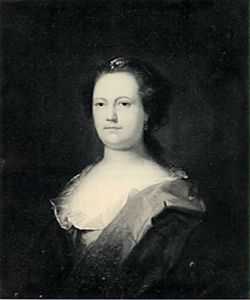
Deborah Read
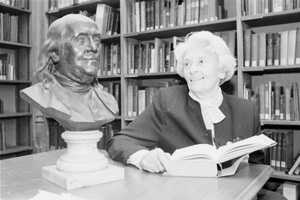
Claude-Anne Lopez
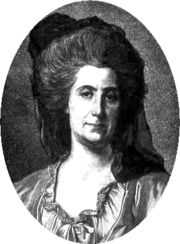
Anne-Catherine Helvetius
A Toast to Doctor Franklin

Benjamin Franklin
Quotes from B. Franklin, Curmudgeon
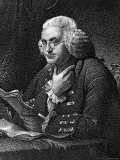
Ben Franklin
Venturi's Franklin Museum in Franklin Court
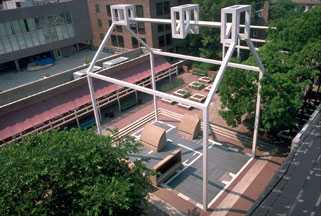
Franklin Court Museum
Google Earth Tour of Franklin Locations
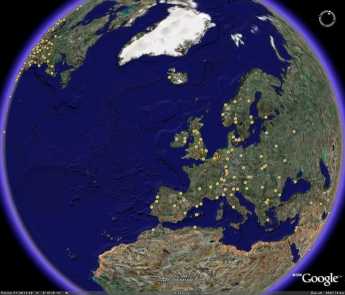
Take a satellite tour of nearly
every place Ben Franklin ever visited.
Franklin's Admirers on TV
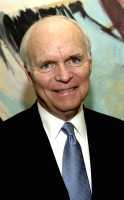
Brian Lamb
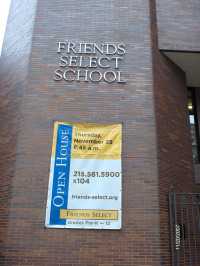
Friends Select School
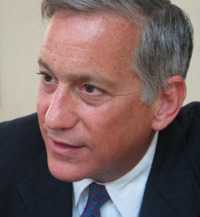
Walter Isaacson
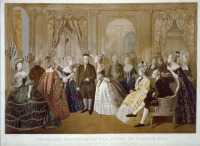
Benjamin Franklin and French Women
Madeira Party 2009

Madeira Wine class=
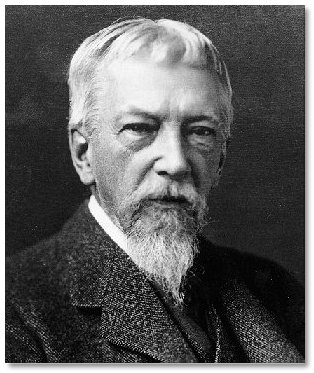
S. Weir Mitchell. Mitchell
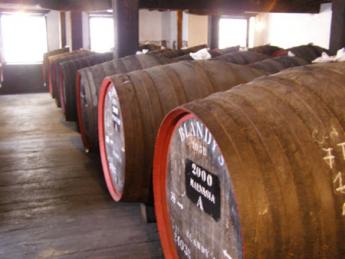
Madeira in a barrels
Franklin on British American Relationships
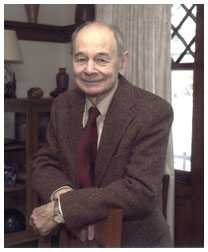
Edmond S. Morgan
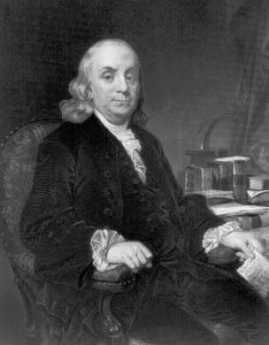
Benjamin Franklin
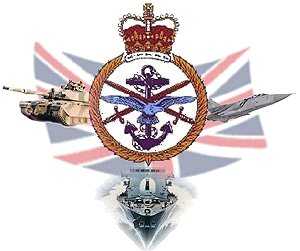
British Ministries Symbol
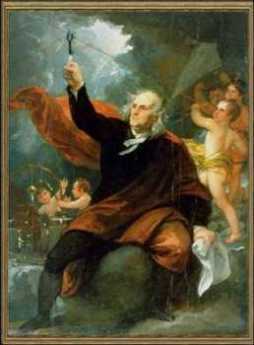
Benjamin Franklin Discovers Electricity
Franklin's Funeral, 1790
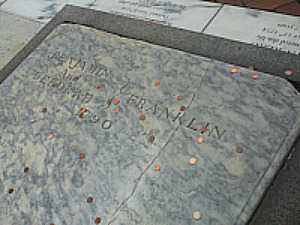
Benjamin Franklin's Grave
Second Amendment: The 28th Infantry Division

AMENDMENT II
A well-regulated militia, being necessary to the security of a free state, the right of the people to keep and bear arms, shall not be infringed.

Second Amendment
Burlington County, NJ
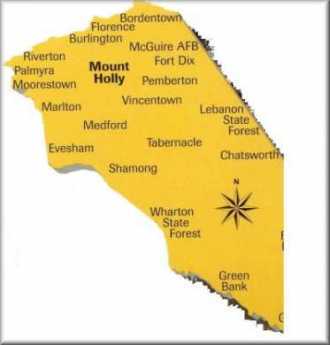
Burlington County Map
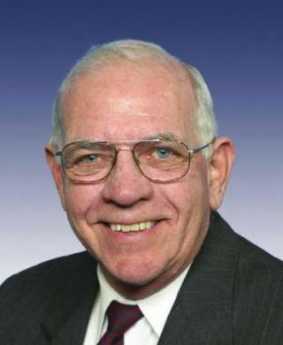
Congressman Saxton

Burlington Bristol Bridge
Central Bankers Refine the Art of Diplomacy
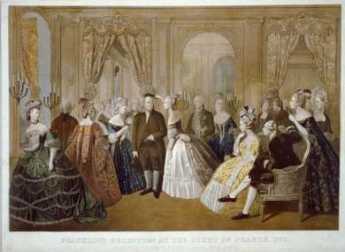
Benjamin Franklin
at the French Court
Lansdowne
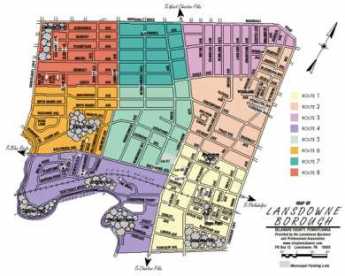
Lansdowne Map
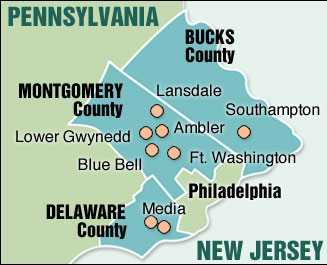
Lansdale
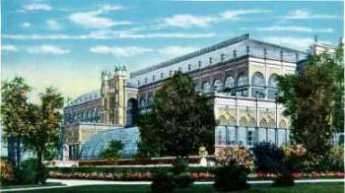
Horticultural Hall
House that Love Built: Ronald McDonald of Philadelphia
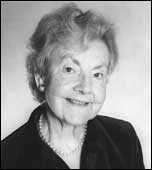
Audrey Evans
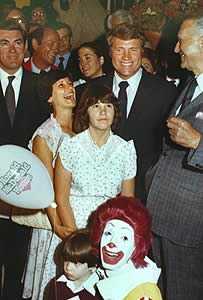
Fred Hall
The Heirs of William Penn

William Penn
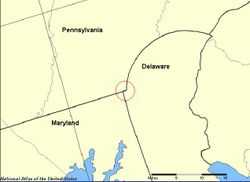
Delaware

John Penn
Benjamin Franklin, Prophet
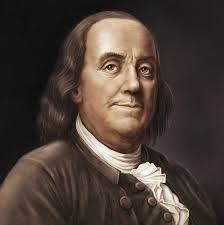
Benjamin Franklin
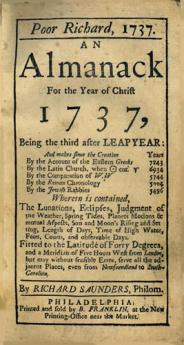
Poor Richard Almanack
Franklin Endorses the Constitution
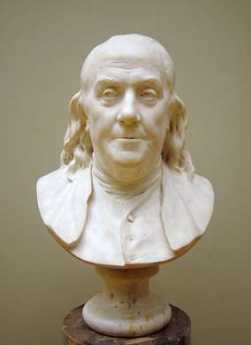
Bust of Benjamin Franklin
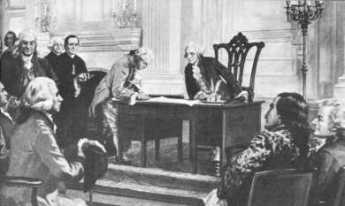
The signing of the Constitution
The University City
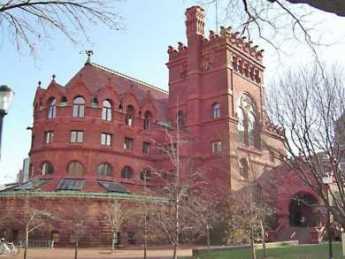
University of Pennsylvania
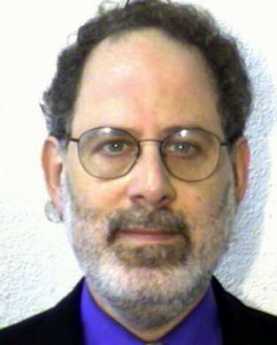
David Hollenberg
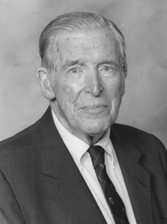
Jonathan E. Rhoads

Cira Center
Philadelphia Chromosome
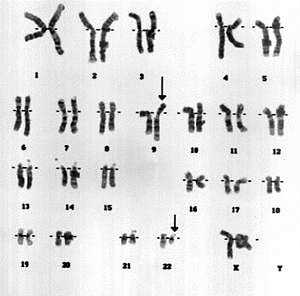
The Philadelphia Chromosome
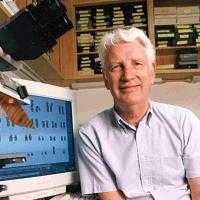
Dr. Peter Nowell
Last Will of Benjamin Franklin
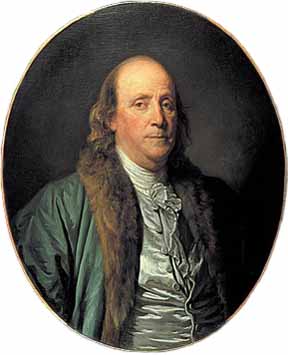
Benjamin Franklin
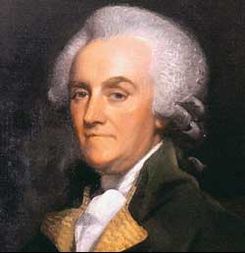
William Franklin
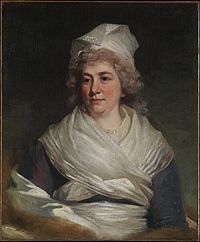
Sarah Bache
A Grievance Carried to the Grave
Franklin's Real Estate Holdings
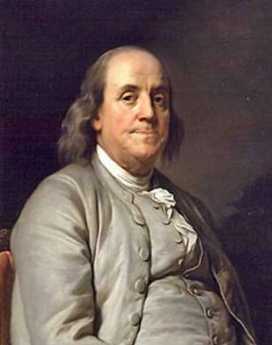
Franklin Benefits the Pennsylvania Hospital

Benjamin Franklin
A Medical History of Benjamin Fanklin: Troubled Water: Benjamin Samuel Abeshouse ASIN: B0069X8GFS
Amazon Franklin's Codicil to His Will: Strange Afterthoughts
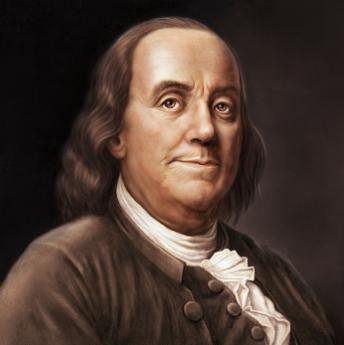
Benjamin Franklin
Franklin Teaches Investing to Boston and Philadelphia
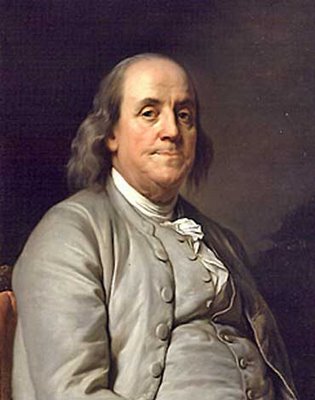
Benjamin Franklin
Governor Keith's House
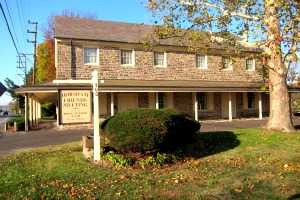
Horsham Friends Meeting
Passage to India
.JPG)
Palace on Wheels

Taj Mahal

The Pink Group

Palace Train
Ball Lightning, Regular Lightning, and B. Franklin
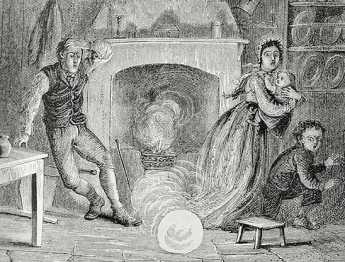
Ball of Lightning
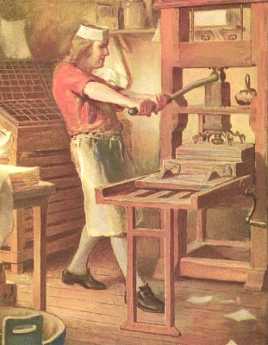
Young Franklin and Print Press
Morris at the Constitutional Convention
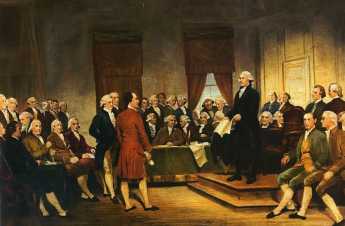
Constitutional Convention 1787
The Congress shall have Power To lay and collect Taxes, Duties, Imposts, and Excises, to pay the Debts and provide for the common Defence and general Welfare of the United States; but all Duties, Imposts, and Excises shall be uniform throughout the United States;
This formulation had the effect of greatly empowering James Madison, the only participant who had studied the inside details intensively and cared about every comma. It also encourages the military to believe that federal taxation was mainly their entitlement, whereas those whose main goals are defined as "the general Welfare" tend to regard defense spending as an unnecessary deduction from their share.
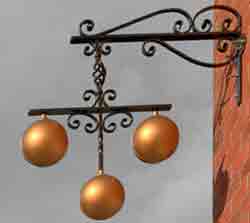
|
| Pawn Broker Sign |
Most of the convention delegates had experience with state legislatures, and Franklin and Morris had spent decades struggling with the weaknesses of legislators. A wink or a quip in a tavern was as good as an hour's speech for reminding the delegates what they already knew about human nature. What was designed as a dual system of powers of taxation, with federal oversight of balanced state budgets combined with federal power to tax on its own in emergencies or unforeseen situations. Since the members of the first few congresses after 1789 were largely the same people as the members of the constitutional convention, many details of this balance were worked out over a few following years. State powers to tax and borrow were tightly constrained, only the federal government could tax and borrow without limit. Since government borrowing is merely the power to defer taxes until later, the borrower of last resort was the U.S. Congress, alone empowered to encumber the wealth of the whole nation in a federal pawn shop window called the funded National Debt. For almost two centuries, this pawn shop window seemed able to support any imaginable expense. Today, we monitor this as the ratio of national debt to Gross Domestic Product (GDP), and we now have a clearer idea what level of that ratio flirts with hopeless inability to pay the federal government's debt. The experts say it's close to a 60% ratio, and unfortunately, almost every nation on earth now exceeds that limit. The system continues to lack an unchallenged definition of its limit, but the system is nevertheless still Morris's system, wrapped in a mountain of descriptive detail by Alexander Hamilton. If a nation borrows more than that and clearly will never repay it, that nation is to some degree a slave to its creditors, with war its only hope if creditors are unrelenting. Perhaps another way to refine the thought is to say that if the nation wishes to mortgage everything it owns down to the last shoe button, the creditors will only accept additional debt if it is proposed by someone with the power to pawn the last shoe button. To foreigners, the proof of who has what power is much more certain if written down. Morris's protege Alexander Hamilton went even further: "credit" is established when creditors can see that somebody is in the habit of getting the nation's bills paid, and "credit" is injured whenever anyone in charge, welches.
Poor Richard's Wealth
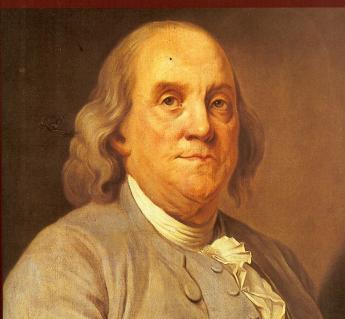
|
| Benjamin Franklin |
I RISE to offer yet another toast to Benjamin Franklin. Like our two leading candidates for the Presidency of the United States, he leaves us uncertain whether he was a rich man pretending to be poor, or a poor man pretending to be rich. To clarify this mystery, I have mainly examined the circumstances of his retirement, and the contents of his last will and testament.
Although he reports that on arrival in Philadelphia at the age of seventeen, he spent his last pennies on a loaf of bread, he was able to retire from the printing business at the age of forty-two, planning to spend the rest of his life as a gentleman at ease. He was able to do so because he had assembled over fifty partners in the printing trade, scattered from Boston to Georgia; today, we would say he had sold franchises to his business. When he came to retire, he arranged to be paid off in eighteen installments, which ought to have lasted him to the age of sixty. That was well past the usual life expectancy at the time, but we can now see it would apparently have run out while he was still in London, acting as our ambassador to Parliament, leaving him without support for the last twenty-four years of his life. Apparently, this was the reason for his seeking postmasterships and acting in some overseas business capacity for Robert Morris, then one of the richest merchants in America.
Assuming he may have run out of money when he was sixty, we look to his final estate to see how he made out in his second career, whatever it was. His assets were in three general categories: land, bonds, and hard money. He bequeathed eleven houses, mostly in Philadelphia, to various relatives. He assigned the ownership in thousands of acres of land in Nova Scotia, Georgia, and Ohio. Just what a bond was in Eighteenth-century America is not exactly clear, but bonds of at least ten thousand pounds sterling were distributed, as well as ten thousand pounds of hard assets. And he forgave a large and undefined number of unpaid debts.
He gave George Washington his gold-handled cane, which had been given to him by Duchess Du Pont, for unknown reasons. His modesty was famous but can be questioned when he gave one of his portraits to be hung in the Council Room of the government of Pennsylvania. He gave his sister a portrait of a French King, with four hundred and eight diamonds set in its frame. He instructed her not to make the diamonds into jewelry because that would be ostentatious. And he instructed that his funeral be plain and simple, although it turned out to be one of the most elaborate parades and ceremonies of the age.
After a few months, Franklin reconsidered his will and wrote a famous codicil. Revoking the gifts to his grandchildren, he ordered that a thousand pounds be set aside for each of the cities of Boston and Philadelphia. His proposal was that this money is loaned to graduating apprentices in order to help them start their businesses, and after a hundred years he envisioned it would amount to hundreds of thousands of pounds; after two hundred years, it would be worth millions and could be used for public improvements. These funds were indeed established and the loaning did begin. Unfortunately after hardly fifty years had elapsed, so many apprentices had failed to repay their loans the experiment was discontinued. What had seemingly been lacking was sufficient will of the trustees to collect the loans with vigor.
Poor Richard may have been born poor at more than one time. But he certainly didn't stay poor, very long. A toast to Ben Franklin, on his birthday, in his club.
A Time to Read Books
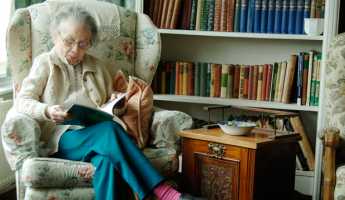
|
| Retirement Reading |
BEFORE we talk about retirees reading books in a retirement community, reflect for a moment about reading in your own home during the working years. Most suburban homes do not have many books in evidence. It's possible to stand in the center of most suburban living rooms unable to see a single book, while it's hard not to see a television set. Increasingly, a home computer is only a few steps from the front door, but the evolution from desktop to laptop to portable telephone to tablet is too rapid to make generalizations. Everyone says books are going to disappear soon, and newspapers maybe even sooner. But there are still said to be a million books constantly in transit on 18-wheeler trucks between print shops and wholesale depositories, night and day. Right now, the producers, publishers and merchandizers of printed material are in turmoil and decline, so they talk about it a lot. But ultimately it is the reading public which will decide what it wants and force the suppliers to give it to them.

|
| reading |
It seems to me that what the reading public wants most is to find time to read. The suburban home has so few books because the sort of person who lives in the suburbs to be near the school system, just doesn't have time to read after the day's work and commuting. Helicopter parents spend a lot of time hauling the kids to mandatory kid entertainments, as can easily be seen by driving past a high school in the afternoon and observing the lines of cars with waiting mothers. They make the best of it as a social occasion for mothers with shiny cars, but they really do it to be sure the kids don't get mixed up with recreational drugs. Anyway, they do it, and it all eats up their discretionary time for reading. Meanwhile, their's no local bookstore to buy books, even unread books. They may think they will catch up on their reading after they retire, but that's becoming increasingly unlikely in my observation. They are getting out of the habit of reading. By the time they retire, they will find it's almost like going back to school. You must find other readers, readers groups, conversations about books over the bridge table, books lying about. The first economy a struggling news paper makes is to cut down the size and number of book reviews, because there are no bookstores to take out advertising, and advertising is what pays for newspapers. There's one good feature about that; what book chatter there is, is not so confined to recent books. Some people are bookish and other people are golf-ish, and a growing number of people are simply TV-ish. It's a struggle to find time for work and the family, and books on top of that. No matter what level of reading the working people may be doing, it's declining in favor of deferred reading when they finally retire.
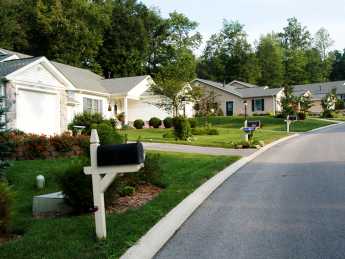
|
| Retirement Community |
Having visited quite a number of retirement communities, I find the community's library is a good place to assess the institution and its typical inhabitant. When it's newly built, a library area is set aside, usually without many books. The first few waves of residents quickly fill up the space with books they brought from home. During the first ten years it is possible to guess what sort of person lives there by the books they brought and deposited, or died and left to the library. The space, more or less empty at first, gets full and something must be discarded. Enlarging the library is an economic issue, so the size at which it halts will to considerable degree reflect the willingness equilibrium to pay for new construction, both by the book lovers, and by the book enemies, the golfers and the administrators. Ultimately book congestion gets to the point where someone simply must cull out some old books to make room for the new. In another essay I have described the use of volunteers to exchange books of no lasting interest for more books of real interest to real residents, through a used-book exchange. But someone must organize the process, often recruited by an administrator who has learned to be horrified of construction which cannot be rented, but must be cleaned and cared for. If passive resistance is a new term to you, this is the place to learn about it. The residents have short memories, lack drive and follow-through. So inertia tends to win, and lack of reading feeds on itself because there is nothing to read. What's apparently needed here is an organization of bookish people that extends to all retirement communities, probably with a paid staff, an annual meeting, Internet connections. And therefore an immortality which can outlive and outlast the passive resistance. Good ideas then have a means to spread and help support other good ideas; somehow the costs must be supported until a few True Believers in Books can write a bequest in their wills to sustain it. And activate their intention, so to speak.
One of the largely unrecognized reasons for the success of the American Revolution was that the Colonies had a higher level of literacy than the Mother Countries. Thomas Paine, for example, printed 150,000 copies of Common Sense on the rickety old printing presses of the 18th century, when there were fewer than three million white inhabitants of the thirteen colonies. And who was mainly responsible for that? It was Benjamin Franklin with his invention and popularization of the lending library. If Ben could find time to start libraries in 1742, and Andrew Carnegie was later found willing to pay for dozens of them, surely the time and energy can be marshaled in the 21st century to establish a first-class library system throughout the retirement communities of the nation.
Those Troublesome Lees of Virginia

|
| Richard Henry Lee |
SOMETHING useful can, of course, be learned from a man's friends, but descriptions given by his enemies are usually briefer. The Lee family of Westmoreland County Virginia were bitter enemies of Robert Morris the Financier of the Revolution, and they surely said some unfair things about him. Morris paid as little attention to the Lees as possible, but for generations, the Lees had been neighbors of the Washingtons, and so could not be completely brushed aside. Furthermore, they were close to the center of Thomas Jefferson's anti-Federalist party. So insights into the Lee family probably illuminate the main disputes before, during, and after the Revolution. They even illuminate the mixed character of George Washington, who was sometimes unusual by Virginia standards. Nevertheless, the Lees had the same quality of heedless idealism to be found in Samuel Adams of Massachusetts and Patrick Henry of Virginia which goes beyond the ability of two-feet-on-the-ground revolutionaries like Robert Morris and Benjamin Franklin to understand, or even abide; this conflict runs throughout the history of the American founding. It seemed to baffle even those who switched positions, like James Madison going in a leftish direction, and Thomas Paine, going toward the right. So, although reckless idealism cannot be an inborn character, it must quickly acquire very deep roots.
.jpg)
|
| Arthur Lee |
Arthur Lee and his brothers William and Richard Henry Lee of Virginia, were passionate rebels of the Patrick Henry ("Give me liberty or give me death") sort, intermittently reviving lifelong attacks on Robert Morris. Highborn Tidewater aristocrats, they were ancestors of Virginia's revered General Robert E. Lee. Arthur had even attended Eton College and later studied medicine in England. The Lee brothers started attacking Robert Morris well before his famous abstention from the critical 1776 vote on independence. It's much too easy to shrug the Lees off as landed aristocrats who disdained self-made men, or as passionate Jacobins who hated self-made rich people, or maybe just narrow-minded nuts. Out of their often inaccurate attacks emerges an outline of what a lot of other people thought about Robert Morris. Many of these polar mind-sets outline the main divisions of political strife in America right up to the present. For present purposes, let's try to understand why Morris might risk his substantial fortune in underground smuggling before the war, and then dedicate his huge energies to winning the war -- while at the same time, not only refuse to agree to the Declaration of Independence (he did finally sign it in August 1776), but speak out in public opposition to independence. What explains Morris' apparent double-talk?
<The explanation I choose to accept is that Robert Morris' real feelings were too sophisticated for this particular crisis, reaching clearer expression in his later activities promoting the Articles of Confederation and its revision the United States Constitution. A man given to terse one-liners, Morris said in December 1775 that he joined his fellow Americans in striving for "Constitutional Liberty" but could not join them in promoting independence.
Morris was never explicit about what would achieve Liberty without Independence; perhaps something like the independent Irish parliament which English Whigs then supported, or the Scottish local parliament which exists today, was in his mind. Both of them link a single King to a commonwealth. At the time, no one was interested in the political philosophy of a shipping merchant.
But today we are in a position to see no member nation of the British Commonwealth has a written constitution; written constitutions are a comparatively recent innovation and not necessarily an essential one. The American Constitution today continues to argue about original intent and living documents, so it is still possible to prefer the wisdom of a benign King to written constitutions. The British goal seems to be to infuse overarching principles of government so deeply into citizen minds that such principles overwhelm any written commandments, however vague all that may sound to outsiders who prefer to niggle over documents. Not in America, of course, because an immigrant nation like ours cannot grow cultural roots sufficiently deep in a few generations, and must have written rules. Great Britain's recent difficulties with immigrants from the Commonwealth may well reassert the limits of unwritten constitutions; constant questioning of the written American constitution by more recent immigrant groups may become a part of the British life, too.
The Articles of Confederation were written by the eminent lawyer John Dickinson, said to be the man closest to sharing Robert Morris' political philosophy. However, for five years the Articles were unratified, and Morris began to believe this lack of ratification was the reason the states were so resistant to taxation. So Dickinson gets credit for writing the Articles, but Morris must be seen as their father. Believing the lack of federal taxation was the main difficulty, and blaming the unratified Articles as the reason for it, our businessman man-of-action pushed them through. Unfortunately, with the Articles it didn't work because the taxation problem still remained, so Morris turned his immense energies toward replacing the Articles with something which would work. It does not twist American history a great deal to believe that Robert Morris, Jr. was one of the main driving forces behind both the Articles of Confederation and the Constitution of the United States. He was neither a lawyer nor a political scientist and therefore was quite indifferent to who got credit for the documents. As Ronald Reagan was to discover two centuries later, that's one of the best ways to get anything done.
Morris could read; he knew the Articles didn't endorse Federal taxation. But he was apparently convinced an unwritten constitution always contains the latitude to do what simply has to be done; anything else amounts to shooting yourself in the foot. After the Battle of Trenton, when Morris became President of the United States for three months in everything except name, he still blamed his troubles on the inability to levy taxes, which in turn was due to failure of the states to ratify those Articles. So sensible a man as John Dickinson would never assume overly strict interpretation was intended; obviously, a state must confiscate private property when otherwise it cannot survive. After five years of state inaction, Morris abruptly pushed the Articles through to ratification. But he was wrong, it didn't help. When he finally grasped that the explicit limitations on taxation were intentional, intended to override any implicit power in the Articles whatever, he promptly threw his weight behind John Jay, George Washington, and James Madison to support a new Constitutional Convention setting it right, especially the national government's ability to levy taxes. Since Washington had by then become his best friend, who actually lived next door in Morris' Market Street house for years, there is not much paper trail of this interaction between these old friends. Once he got his tax mandate at the Convention, however, Morris had hardly anything further to say. His frenetic later activity immediately after the Constitution was enacted can almost surely be attributed to lifelong habits of a negotiator, avoiding mention of anything which might distract from his main goal, in this case of ratifying the Congressional right to levy federal taxes, but not abandoning subordinate goals for a moment. What the Lees hated about Morris, therefore, cannot be easily explained, but certainly, one feature of it was his ability to hold his cards face-down. The Lees didn't hold their cards, they flourished them. In their eyes, no gentleman would do anything else.
The incidents of June 1776 place the Lees in a more favorable light if they are seen as urging instinctive decisions by popular mandate, essentially favoring an unwritten British Constitutional arrangement. The Lees believed the place of a gentleman was at the head of a troop, daring the rest to follow their lead. The British had blockaded Boston, passed the Prohibitory Acts, fought naval battles in the Delaware River in May of that year. A huge British fleet had landed in New York harbor, and the agitated colonists were about to declare war. At the very moment of crisis, that rich Philadelphia merchant had refused to vote for independence. The Virginia tobacco planters were dancing a war dance in a city known for its pacifist Quakers, while their neighbor George Washington was conducting an actual war with the British. It was then revealed that Robert Morris had been participating in a gunpowder smuggling operation known as the Secret Committee, and Morris had made considerable profits from it. While many of his friends defended Morris, it was pretty easy to go wild with indignation about trusting him to sit on a secret espionage committee, unwatched. The very least that could be done was to appoint Arthur Lee, already a member of the Continental Congress, to that Secret Committee to sound the alarm if anything looked funny. The ironic fact seems to be that Morris and the Lees were passionately committed to the same unwritten approach to government, primarily based on trust in personal character, otherwise defined as fidelity to an unwritten tribal code. If you are the right sort of person, you will be with us; if you are not with us, you must not be the right sort of person. Unfortunately, a nation of immigrants may not survive if it adopts too many such notions.
The Lees had expressed disruptive views of Morris in the past, but they were exactly the sort of clan likely to confront scoundrels whenever facts called for it, and sometimes even when they didn't. The underlying conflicts, fiercely advocating both a strong centralized government and a loose decentralized one but not defining either, continue to run through American politics until the present. Whether Morris ever acknowledged it or not, he ended up on the side of defined contracts, as opposed to a Code of Honor. But he spent his life as a man of his word because in business your word is your bond; if you are any good, you won't need to cheat. If our Tower of Compromises is to endure, its limits of such agreement must be few, but they must somehow be strictly understood.
Evo-Devo
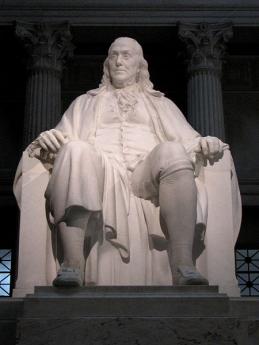
|
| The Franklin Institute of Philadelphia |
THE oldest annual awards for scientific achievement, probably the oldest in the world, are the gold medals awarded by the Franklin Institute of Philadelphia for the past 188 years. Nobel Prizes are more famous because they give more money, but that in a way involves another Philadelphia neighborhood achievement, because Nobel's investment managers have run up their remarkable investment record while operating out of Wilmington, Delaware. In the past century, one unspoken goal of the Franklin Institute has been to select winners who will later win a Nobel Prize, the actual outcome more than a hundred times. That likelihood is one of the attractions of winning the Philadelphia prize, but in recent years some Nobel awards have acquired the reputation of being politicized particularly the Peace and Literature prizes. Insiders at the Franklin are positively fierce about avoiding that, so the Franklin Institute prizes have become known for recognizing talent, not merely fame.

|
| Dr. Jan Gordon, Dr. Sean Caroll, and Dr. Cliff Tabin |
Within Philadelphia, the annual awards ceremony is one of the four top social events. The building will seat 800, but reservations are normally all sold out before invitations are even put in the mail. A major source of this recent success is clear; in the past twenty-five years, the packed audience is a star in the crown of Dr. Janice Taylor Gordon. This year, she hurried back from a bird-watching trip in Cuba, just in time to busy herself in the ceremonies where she sponsored Dr. Sean Carroll of the Howard Hughes Foundation and the University of Wisconsin, for the Benjamin Franklin medal in the life sciences. Carroll's normal activities are split between awarding $80 million a year of Hughes money for improving pre-college education from offices in Bethesda, Maryland, and directing activities of the Department of Genetics in Madison, Wisconsin. His prize this year has relatively little to do with either job; it's for revolutionizing our way of thinking about evolution and its underlying question, of how genes control body development in the animal kingdom. Evolution and Development are academic terms, familiarly shortened to Evo-Devo.

|
| Dr. Carroll's Butterflies |
My former medical school classmate Joshua Lederberg, also a resident of Philadelphia, was responsible for modern genetics, demonstrating linkages between the DNA of a cell, and the production of a particular body protein. For a time it looked as though we might confidently say, one gene, one protein, explains most of the biochemistry. In the exuberance of the scientific community, it even looked as though deciphering the genetic code of 25,000 human genes might explain all inherited diseases, and maybe most diseases had an inherited component if you took note of inherited weaknesses and disease susceptibilities. But that turned out to be pretty over-optimistic. Lederberg got into an unfortunate scientific dispute with French scientists about bacterial mating and now appears to have been wrong about it. But the most severe blow to the one gene, one protein explanation of disease came after the NIH spent a billion dollars on a crash program to map out the entire human genetic code. Unfortunately, only a few rare diseases were explained that way, at most perhaps 2%. Furthermore, all the members of the animal kingdom turned out to have pretty much the same genes. Not just monkeys and apes, but sponges and worms were wildly different in outward appearance, but substantially carried the same genes. Even fossils seem to show this has been the case for fifty million years. Obviously, animal genes have slowly been added and slowly deleted over the ages, but in the main, the DNA (deoxynucleic acid) complex has remained about the same during modest changes in evolution. Quite obviously, understanding the genome required some major additions to the theory's logic.
In late 1996, three scientists met in Philadelphia for a brain-storming session. Sean Carroll had demonstrated that mutations and perhaps an evolution of the wing patterns of butterflies and insects took place during their embryonic development, and seemed to be controlled by the unexplored proteins between active genes. Perhaps, he conjectured, the same was true of the whole animal kingdom. Gathered in the Joseph Leidy laboratory of the University of Pennsylvania, the three scientists from different fields proposed writing a paper about the idea, suggesting how scientists might explore proving it in the difficult circumstances of nine-month human pregnancies, in dinosaurs, in deep-sea fish and many remote corners of the animal kingdom. Filling yellow legal pads with their notes, the paleontologist (fossil expert) Neal Shubin of the University of Pennsylvania, genetic biologist (Sean Carroll of Wisconsin), and Harvard geneticist Cliff Tabin worked out a scientific paper to describe what was known and what had to be learned. The central theme, suggested by Carroll, was that evolution probably takes place in the neighboring regulatory material which controls the stage of life early in the development of the fetus, and these regulatory proteins consist of otherwise inactive residual remnants of ancient animals from which the modern species had evolved. As the fetus unfolds from a fertilized egg into a little baby, its outward form resembles fish, reptiles, etc. And hence we get the little embryonic dance of ancient forms morphing into modern ones. In deference to the skeptics, it would have to be admitted that the physical resemblance to adult forms of the ancient animals is a trifle vague.
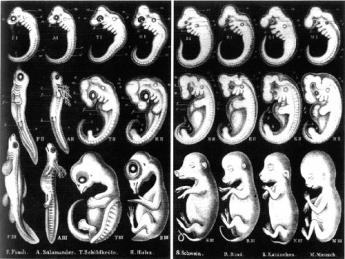
|
| Haeckel's drawings of vertebrate embryos, from 1874 |
Embryologists have long argued about Ernst Haeckel's incantation that "Ontology recapitulates phylogeny", which is a fancified way of saying approximately the same thing. Darwin's conclusion was more measured than Haeckel's and explanations of the phenomenon had been sidelined for almost two centuries. But it seems to be somewhat true that fossils which paleontologists have been discovering, going back to dinosaurs and beyond, do mimic the stages of embryonic development up to that particular level of evolution, and might even use the same genetic mechanism. The genetic mechanism might evolve, leaving a trail behind of how it got to its then-latest stage. Borrowing the "Cis" prefix ("neighboring") from chemistry, these genetic ghosts have become known as Cis-regulatory proteins as the evidence accumulates of their nature and composition. Growing from the original three scientists huddled in Shubin's Leidy Laboratories in 1996, academic laboratories by the many dozens soon branched out, dispatching paleontologists to collect fossils in the Arctic, post-doctoral trainees to collect weird little animals from the deserts of China, and the caves of Mexico, everywhere confirming Carroll's basic idea. Even certain forms of one-celled animals which occasionally form clumps of multi-celled animals have been examined and found to be responding to a protein produced by neighboring bacteria which induces them to clump -- quite possibly the way multi-cellular life began. Many forms of mutant fish were extracted from caves to study how and why they developed hereditary blindness; the patterns of markings on the wings of butterflies were puzzled over, and the markings on obscure hummingbirds. The kids in the laboratory are now having all the fun with foreign travel, while the original trio finds themselves spending a lot of time approving travel vouchers. Many fossils of animals long extinct have been studied for their evolution from one shape to another, especially in their necks, wings, and legs. Some pretty exciting new theories emerged, and are getting pretty well accepted in the scientific world. At times like this, it's lots of fun to be a scientist.
Advantages and Disadvantages of Being a Small Country
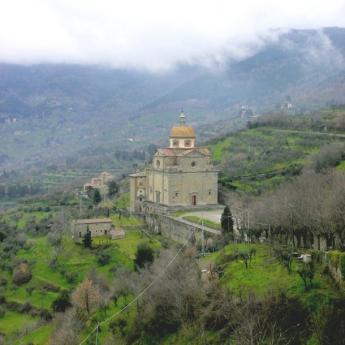
|
| very pleasant |
LIVING in a small country seems to be very pleasant, and many people prefer it to the hustle, bustle and high taxes of living in a large country. Unfortunately, big neighbors are tempted to conquer and enslave you. Aside from this one disadvantage, many people would prefer a simple, quiet life among blood relatives, all tending to think the same way. It's one step above tribalism, and maybe it's a form of peaceful tribalism.

|
| Measles |
But our evolutionary ancestors didn't think they could afford this luxury. They lived in a strange wilderness filled with fierce aborigines who often took a notion to scalp you, even if you were willing to become a hunter-gatherer like them, because they scalped other hunter-gatherers, too. And they were good at making war. Later historians sometimes contend that European settlers only gained a foothold in the New World because the Indians had been weakened by smallpox, measles, and other contagions which advanced ahead of the exploring Europeans. English settlers along the Atlantic coast were able to overcome the Dutch and Swedes who preceded them, but the French in Quebec and the Spanish in Florida were a greater threat. Worst of all enemies were the rulers of England, who seemed to think it was natural to enjoy the benefits of the New World without the nuisance of living there. A century or more of conflict from the enemies who surrounded them had pretty well convinced the English Atlantic settlers that they simply had to get bigger and stronger. Otherwise, one of the many enemies surrounding them would eventually succeed in what seemed to be a universal goal: conquest.
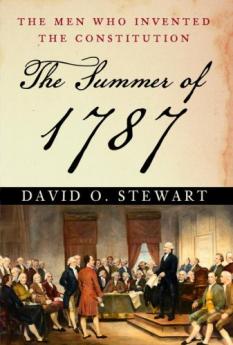
|
| The summer of 1787 |
The colonists had learned one other thing. Their own loose federation of small peaceful states was in some ways worse than rule by an outside King. The Confederation had been constantly reluctant to surrender local power to a unified defense; almost by definition, an invader was better disciplined than the defenders of a loose tribal alliance. The defense alliance had few advantages for keeping local bickering under control and was definitely less effective with families and children to protect against a mobile force of adult male warriors. The Confederation barely held together during an eight-year war against a common enemy, and it was rapidly coming apart after peace was declared in 1783. The English and French could see all this, too. Once they settled their own war with each other, each of them planned to envelop the former colonies. So George Washington and James Madison gathered the Best and the Brightest together in Philadelphia in the summer of 1787, intending to construct a practical plan for what almost all the colonists wanted: a Union. A Union strong and big enough so other nations would leave them alone. A Union was benign enough so its citizens would enjoy the same Liberty they had as a loose alliance. Divided informally into four interest groups, each of the four needed concessions to be made. But each also needed to leave the other three feelings they had gained something important as the price of surrendering to what some other group could not do without. Having found the vital concessions, it was then still necessary to tinker and re-balance, so that everyone could still "live with it". In essence: 1) The South had to be given time and forbearance to work out its difficult problem of slavery, moral qualms notwithstanding. 2) The nine small states had to be protected against perpetual domination by the three big ones, of Virginia, Pennsylvania, and Massachusetts. 3) If America was to realize the full advantage of growing from thirteen states to fifty, existing old states must not take advantage of new ones. 4) Political revolution was not the end of it; there was also the Industrial Revolution. Fishing, lumbering, farming, trade, and cotton, would in some way need to accommodate banking and manufacturing, assisting rather than upsetting other compromises. Given these tangled issues, it would be a long, hot summer in Philadelphia.
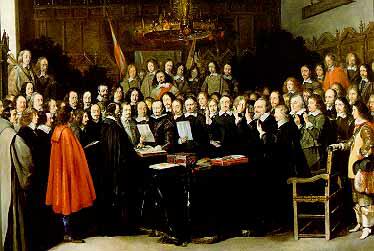
|
| Treaty of Westphalia in 1648 |
Three of the four main problems were obvious, demanding to be addressed. Slavery was obvious from the start; you either solved this problem or the South would walk out. The western wilderness was bigger than existing America; it too could not be ignored. And finally, huge variations of climate and resources led to local specialization; a marvelous thing, if you could trust your suppliers and customers to cooperate. But curiously, none of these issues got directly to the political problem the Constitutional Convention was meant to solve, which was unifying thirteen different sovereignties, each of which was prepared to get up and walk out. The modern nation state was created by the Treaty of Westphalia in 1648; its guiding principle was mutual respect for local sovereignty. Having pacified over a hundred contentious central European states, it required a great deal of self-assurance for anyone to flout it. It seemed hard to imagine any way to remain sovereign, without commanding a vote equal to that of other sovereignties. The delegates from the State of Delaware, which had separated from Pennsylvania within the past decade, were "prohibited [by their legislature] from changing the Article in Confederation establishing an equality of votes among the States". Just what agitated the minds of the Legislature of Rhode Island was kept private, but something about a Union bothered them so much they refused to send delegates to Philadelphia even to discuss Union. After they assembled and started having dinner together at taverns, and later as they were beginning to vote in coalitions, one thing began to emerge. The small states banded together, hung out together, talked alike, and began to vote alike. Their emerging leader was John Dickinson of Delaware, the author of the Articles of Confederation, and very likely one of the prime agitators in the lower three counties of Pennsylvania -- breaking off from Pennsylvania and becoming the State of Delaware. Furthermore, Dickinson had been Governor of both Delaware and Pennsylvania, so he was very familiar with the deplorable behavior of the Legislature of Pennsylvania, now and for decades in the past. It took a long time for this sly old political operator to show his cards, but when he did, he gave James Madison the shock of his life. Madison, the near neighbor of George Washington and leader of the Virginia delegation, the author of the Virginia Plan, and the clear authority on the politics of government in America was busily consumed with working out the details of the emerging Constitution. Obviously, it went to his head a little, and so he was dumbfounded when Dickinson drew him aside in the corridor to tell him he wasn't going to have a Constitution at all. Dickinson was walking around with the votes in his pocket of five or six of the nine small states and was telling Madison that the small states were fed up, and not going along. Young Madison was suddenly confronted by the most respected lawyer in America, whose timing was perfect. For what may have been the first time in his life, Dickinson fully revealed the depth of his annoyance, that the big states would always take the little ones for granted. That the little ones were always expected to be deferential to the big fellows in charge of the big states. And then the clincher: "I would rather risk conquest from a foreign state than being forever dominated by my larger neighbors." That put it in a nutshell. If the only reason for joining a Union was to be protected from foreigners, Dickinson wasn't so sure he preferred his coalition partners. Evidently, this was the feeling of most of the other small states at the Convention, and it may well be the feeling of all small states, anywhere and everywhere.
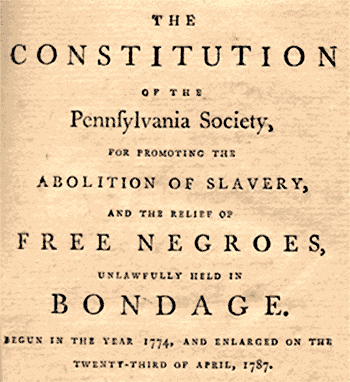
|
| Promoting the Abolition of Slavery |
Once the Convention got the idea, solving it became comparatively easy, but why waste an opportunity? There is a good reason to suppose it was Ben Franklin, silent as a cat watching a mouse, who matched it up with slavery. His fellow Pennsylvania delegate, James Wilson, had prepared the way by starting the discussion of granting 3/5 representation for slaves, but it had received comparatively little notice in the previous few weeks. Franklin rammed it home, adding a sop to the large states by according to the House of Representative sole power to introduce money legislation. Two of the main issues of the convention were solved with one agreement, small-state representation, and slavery. Who can say how long he had been nursing this idea. He had agreed to be president of the Pennsylvania Society for Promoting the Abolition of Slavery, about a month before the Constitutional Convention began. Prior to that, he and his wife had owned a slave or two, for many years. On June 2, the society adopted a resolution to end the slave trade and presented it to Dr. Franklin, asking him to present it to the Convention. He never did, explaining later it was "advisable" to let the matter lie over. In August, Alexander Hamilton blocked a similar resolution from the New York Manumission Society, even though he had been a fervent lifelong opponent of slavery.
Ben's Little Legacy
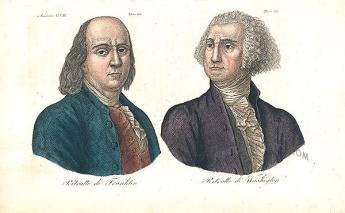
|
| Benjamin Franklin and George Washington |
ONE of the many compromises of the Constitutional Convention was to allow equal-sized blocs of people to choose their Representatives, but the State Legislatures of any size to appoint two Senators, in a bicameral Congress requiring affirmative votes from both bodies, for action. This was the first step in a separation of powers. After separation came apportionment: every state still got two Senators, but varying numbers of Representative districts would reflect population changes. The effect of this second step was to confer greater Senate power to small states because otherwise, a few states with large populations would probably always dominate the voting. (Shorthand for Constitutional scholars: favoring the House of Representatives means favoring big states.) When Franklin proposed a bargain to give the South time to solve its slavery problem, he needed to maintain balance. The small states were truculent about losing Senate power, so he had to give something else to the big states. The three big states of Massachusetts, Pennsylvania, and Virginia were very mindful that England had primarily targeted Boston, Philadelphia, and Yorktown for attack during the Revolution. Big states are paradoxically more anxious to unify with allies, to gain military strength, because enemy commanders seem to favor them as military objectives. Franklin's proposal was to allow the big states to control tax legislation, through the device of mandating that tax laws must originate in the House of Representatives. He may have known that eight states already had similar laws, but may not have realized such laws were regularly flouted. It's hard to be sure what Franklin knew because although he had once been Speaker of the Pennsylvania House, it was during a time it was a unicameral Legislature.
 ARTICLE 1, Section 7. All bills for raising revenue shall originate in the House of Representatives, but the Senate may propose or concur with amendments as on other Bills. 
|
| Washington's Gift to Franklin |
Experienced politicians in the Convention snorted with disgust. There were a dozen ways to get around such a provision, and nowadays the traditional one is for the Senate to attach a tax amendment to some bill which had originated in the House. Any House bill will suffice, and thus we have Senate-originated Medicare Amendments attached to House-originated bills whose first page purports to be legislation about highway construction. Medicare, don't you see, is an amendment to Social Security, which itself began as tax legislation. Any politician of standing could see his way through that. And even in 1787, the delegates could immediately think of ways to circumvent this little trick. When Chairman Rutledge of South Carolina returned his report from the Committee on Detail, it included Franklin's gift to the big states. His fellow delegate from South Carolina Charles Pinckney immediately proposed a friendly motion to delete the rule. Edmund Randolph of Virginia however, felt the big states "should at least get what they had been promised", thereby upsetting others who felt Randolph was being indelicate. So George Washington stepped out of the shadows and supported Randolph, his long-term neighbor, and friend in the Virginia caucus. The matter was then referred to the Committee on Postponed Parts. After a decent interval, it was reported out of the second committee and adopted. After all, with Washington and Franklin as supporters, it would be embarrassing not to pass an inconsequential motion.
The Origin of States Rights, a Rumination
ALMOST alone among the British colonies in America, Pennsylvania's western border was specified in the King's charter of the colony. It was "five degrees longitude west of the point where the eastern boundary crosses the Delaware" [River]; however, its actual location on the ground was not actually marked until 1784. It's a few miles west of the present city of Pittsburgh, located at the forks of the Ohio River, where the Allegheny and Monongahela Rivers join. However, until 1784 it was not a certainty that this complex was within Pennsylvania instead of Virginia. The origin of Ohio is at the only major water gap in the North-South mountains, and the tributary rivers are fairly large. The three merging rivers thus form a nearly continuous water route along the base of the mountain range, from the Great Lakes south to Pittsburgh, or from the Chesapeake Bay north to Pittsburgh, and then to the Mississippi, going past the best topsoil farming land in the world. The forks of Ohio were the great prize of the Seventeenth and Eighteenth centuries, the place where young George Washington himself started the French and Indian War. To include these treasures, it seems vaguely possible that William Penn insisted on having the border of his state safely include the water gap at the beginning of Ohio. Perhaps not, of course, perhaps it was just a sense of tidiness on the part of the ministers of Charles II. The original document stated that the border was a hundred miles east of there, to match where Maryland ended. When the document was returned to Penn by the King's ministers, however, it had the new language.
The existence of this north-south termination of Pennsylvania began to take on a new significance when other states made claims for their land grant to extend to the Pacific Ocean, and the extensions collided with each other. Virginia then developed its territory to include modern Kentucky and West Virginia. That resulted in Virginia's land aspirations veering northward, to include the Ohio Territory west of Pennsylvania's fixed boundary. By the legal standards of the day, Virginia had a fairly good claim to all of the Indian territories, not merely to the west of Pennsylvania, but extending at least to the Great Lakes, perhaps farther. Maryland, Connecticut, New York, and Massachusetts had conflicting claims from an infinite extension of their western boundaries. As a consequence, it was impossible to achieve ratification of the Articles of Confederation for five years. The various states involved were fearful of the creation of a combined political entity might result in a court which would be enabled to rule against their individual aspirations. The stakes were high; the land mass involved would be several times as large as England.
The person who finally broke this deadlock might well have been Robert Morris, who was disturbed that this inter-state dissension was injuring his ability to borrow foreign funds for the Revolutionary War. The internal negotiations took place under wartime conditions, and are poorly researched. No doubt some person deserves credit for bringing this wrangle to a close. Virginia had the strongest claim, New York the weakest. New York gave up its claim first, Maryland was the last, and Virginia the most disappointed. Pennsylvania, unable to make a claim, took the position that the land belonged to everyone, and eventually was mollified by getting a small notch of land extending to the Great Lakes at Erie. It must be noticed in passing that final resolution of the land claims came at the Treaty of Paris ending the Revolution. Benjamin Franklin, soon to become President of Pennsylvania, was the negotiator of the treaty which reflected Pennsylvania's position that the land belonged to all of us, right?
Even without these western land claims, Virginia was the largest and richest of the colonies, and rather easily adopted the attitude that Virginia would be the leader of the new United States. From their viewpoint, the preservation of states rights would enhance Virginia's leading the country. More or less immediately, the attitude of small states like Delaware hardened into resistance that this must not happen. Much otherwise inexplicable behavior also begins to make a sort of sense: the perverse behavior of the Lee family in the Continental Congress, the quarrels within George Washington's cabinet, the relocation of the capital and the dreams of the Potomac as the nation's main portal of transportation, the rise of Jefferson's political party, the obstructionist behavior of Patrick Henry, the Virginia domination of the Presidency for decades, and countless less famous episodes of history -- make more sense as residuals of Virginia's early land aspirations, than as defenses of slavery or philosophical convictions that states were somehow superior to nations. These suspicions are difficult to clarify and impossible to prove. The best way to see some substance to them is to imagine yourself in the Virginia House of Burgesses, politically connected and vigorous, able to imagine your descendants all inheriting a county or two of rich land as a remote consequence of a few glamorous deeds by their Cavalier ancestor.
Wistar Institute, Spelled With an "A"
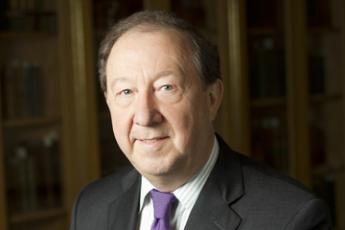
|
| Dr. Russel Kaufman |
The Right Angle Club was recently honored by hosting a speech by Dr. Russel Kaufman, the CEO of the Wistar Institute. Dr. Russel is a charming person, accustomed to talking on Public Broadcasting. But Russel with one "L"? How come? Well, sez Dr. Kaufman, that was my idea. "When I was a child, I asked my parents whether the word was pronounced any differently with one or two "Ls", and the answer was, No. So if I lived to a ripe old age, just think how much time and effort would be wasted by using that second "L". In eighty years, I might spend a whole week putting useless "Ls" on the end of Russel. I pestered my parents about it to the point where they just gave up and let me change my name". That's the kind of guy he is.

|
| The Wistar Institute |
The Wistar Institute is surrounded by the University of Pennsylvania, but officially has nothing to do with it. It owns its own land and buildings, has its own trustees and endowment, and goes its own academic way. That isn't the way you hear it from numerous Penn people, but since it was so stated publicly by its CEO, that has to be taken as the last word. It's going to be an important fact pretty soon since the Wistar Institute is soon going to embark on a major fund-raising campaign, designed to increase the number of laboratories from thirty to fifty. The Wistar performs basic research in the scientific underpinnings of medical advances, often making discoveries which lead to medical advances, but usually not engaging in direct clinical research itself. This is a very appealing approach for the many drug manufacturers in the Philadelphia region, since there can be many squabbles and changes about patents and copyrights when the commercial applications make an appearance. All of that can be minimized when fundamental research and applied research are undertaken sequentially. Philadelphia ought to remember better than it does, that it once lost the whole computer industry when the computer inventors and the institutions which supported them got into a hopeless tangle over who had the rights to what. The results in that historic case visibly annoyed the judge about the way the patent infringement industry seemingly interfered with the manufacture of the greatest invention of the Twentieth century.
Patents are a tricky issue, particularly since the medical profession has traditionally been violently opposed to allowing physicians to patent their discoveries, and for that matter, Dr. Benjamin Franklin never patented any of his many famous inventions. But the University of Wisconsin set things in a new direction with the patenting of Vitamin D, leading to a major funding stream for additional University of Wisconsin research. Ways can indeed be devised to serve the various ethical issues involved since "grub-staking" is an ancient and honorable American tradition, one which has rescued other far rougher industries from debilitating quarrels over intellectual property. You can easily see why the Wistar Institute badly needs a charming leader like Russel, to mediate the forward progress of our most important local activity. From these efforts in the past have emerged the Rabies and Measles vaccines, and the fundamental progress which made the polio vaccine possible.
It was a great relief to have it explained that there is essentially no difference at all between Wisters with an "E" and Wistars with an "A". There were two brothers who got tired of the constant confusion between them, see and agreed to spell their names differently. When the Wistar Institute gathered a couple of hundred members of the family for a dinner, the grand dame of the family declared in a menacing way that there is no difference in how they are pronounced, either. It's Wister, folks, no matter how it is spelled. Since not a soul at the dinner dared to challenge her, that's the way it's always going to be.
Stretching Out Your Retirement Savings
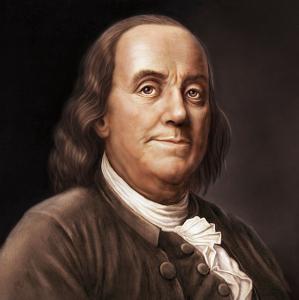
|
| Benjamin Franklin |
Benjamin Franklin was able to retire from the printing business at the age of 42. His partners bought him out in eighteen yearly installments. In the Eighteenth century, it was unusual to live past the age of 60, so Ben felt pretty well fixed. Unfortunately for this planning, he lived to be 82, so when he did reach the age of 60 he was forced to look around for postmasterships and other ways to survive, for what proved to be 22 more years.
This is the other side of a coin; on one side is written, "Protect your family in case you die young". On the opposite side is written, "Be careful not to outlive your savings", relying on the old Quaker maxim that the best way to have enough--is to have a little too much. For centuries, life insurance was sold to people who mainly feared the first, commonest, possibility, but never completely addressed the opposite contingency, which was growing steadily commoner. Annuity insurance ordinarily is sold for a fixed number of years, so insurance commissioners ordinarily require what is most probable. Unfortunately, this response shifts the risk of guessing wrong onto the subscribers' shoulders. Since science has unexpectedly lengthened average life expectancy (by thirty years since 1900, or by five years in the last ten), experience rather like Ben Franklin's has become a commonplace, but rather poor business judgment. The business remains solvent only as long as the decision to drop the policy is later than the life expectancy.
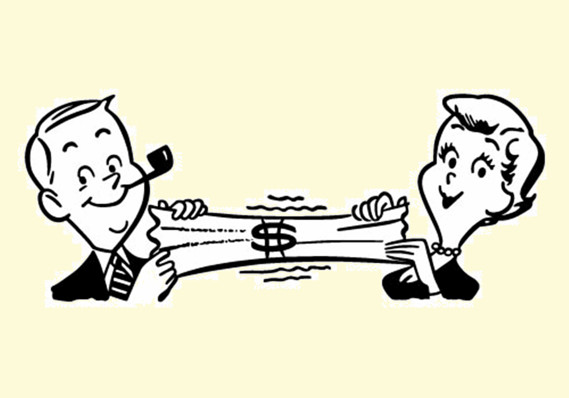
|
| Retirement Saving Debt |
There may exist insurance policies to address this issue, but few companies offer it. We will briefly describe this sort of policy, in case it becomes more widely available, but it is primarily described here to illustrate the issues to consider. If you can get it for a reasonable price, or if you can get it at all, the outline of the policy would be to set a premium and promise to pay 6% for the rest of your life. Underneath the promise is the reality of paying 6% for eighteen years as a non-taxable return of principal. Following that, you don't need to get a postmastership, you are paid a taxable 6% until you die. Presumably, the insurance company has actuaries to help with the math, so the company makes money if you live less than your life expectancy, and loses money if you live longer. If life expectancy suddenly extends much longer (let's imagine a cure for cancer appears), the insurance company is going to go broke. That's why insurance commissioners are uncomfortable with the concept, even though it is obvious how desirable it might be. So that's why annuity insurance typically states a fixed number of guaranteed years and expects the subscriber to shoulder outlier risk.
Any insurance has an administrative cost, so everyone must consider some non-insurance solution to the whole problem. Therefore, we propose you re-examine the old saw about "never dip into principal". If you don't have enough money, you can't do very much except depending on the government, your family, or your fairy godmother to help you out, although it must be obvious that all Americans would be wise to consider retiring five or ten years later than they hoped. Very likely, the government is going to have a difficult time sustaining even the present tax exemption of retirement funds, medical insurance, and social security. Those are called entitlements, but if the government eventually can't afford them, it won't matter what you call them. If entitlements keep getting extended, we can expect our nation to resemble the ancient Chinese and Indian nations -- able to build palaces in their golden era, but eventually crumbling into a gigantic slum in centuries afterward. So please, if you are able to do it, try to keep gainfully employed for a few extra years. If you do it (and some people can't) you may be able to realize the American Dream.
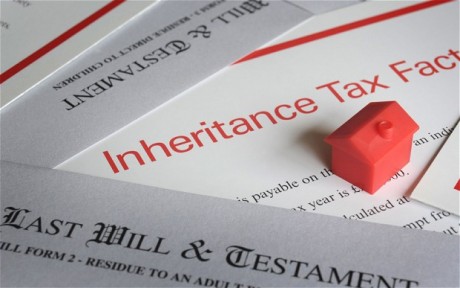
|
| Inheritance Tax |
The traditional American dream was to accumulate enough money to live off the income from it indefinitely, never touching principal, and then exposing the principal to destructive estate taxes after you finally die. Unless you are unusually wealthy, there isn't much left for the next generation after estate and inheritance taxes and expenses. It's a little inefficient to accumulate more than you actually need, but the government gravitates toward the least painful methods of collecting taxes. By confiscating this safety surplus, however, it declares that "Every ship (generation) must sail on its own bottom." And therefore it must acknowledge responsibility for what inheritances ordinarily pay for, like charity and good works. But there remains a quirk to this.
If Ben Franklin's partners had arranged to invest the money until he needed it, they could at least have afforded to finance two or three extra years. After inflation and expenses have eaten away at your retirement income, your principal may not generate enough income to last forever, but it is still big enough to pay for several years of retirement, which may in fact be longer than you are destined to live. Remember two things: 1) a principal sum, big enough to support you indefinitely, must be roughly eighteen times your yearly expenses. If it is only big enough to support you for fifteen years, it will seem too small until you realize you are probably actually going to live, say, five years. And 2) as far as leaving an inheritance to your children is concerned, there is a realistic probability that the government will consume most of the estate before it ever gets to the kids. These fundamental truths are presently obscured by the Federal Reserve artificially forcing interest rates to less than 1%. But if you can just hold out for a few years, it seems entirely likely that interest rates will return to 6% (meaning your principal will once again produce eighteen equal installments). But such a return of interest rates to normal levels will force the government to pay a comparable amount as interest on its bond debts (meaning it will get hungrier to escalate your estate taxes.) This isn't nearly as satisfactory a solution to the life expectancy quandary as retiring five years later than you once expected to, but you can't say we didn't warn you.
And as for what happened to Ben Franklin, you can read his will. He died a very rich man as a result of shrewd investments, later in his life. Ben left eight or nine houses, several thousand acres in several states, a gold-handled cane, and a portrait of the King of France surrounded by hundreds of diamonds. But it would not seem wise for the rest of us to count on accumulating that much new wealth, after attaining the age of sixty. The way things are going, once you attain your life expectancy, everyone should have some non-insurance plan for supporting himself for two or three extra years.
State and Federal Powers: Historical Review
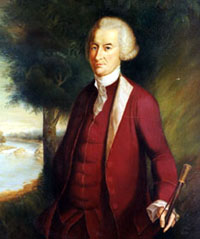
|
| John Dickinson of Delaware |
It was expedient to leave certain phrases in the Constitution intentionally vague, but the overall design is clear enough. Just as twenty-eight sovereign European nations now struggle to form a European Union, thirteen formerly sovereign American colonies once struggled to unify for the stronger defense at a reduced cost. Intentionally or not, that created a new and unique culture, reliant on the constant shifting of power among friendly rivals. Everybody was a recent frontiersman, trusting, but suspicious. It still takes newcomers a while to get used to it.
So the primary reason for uniting thirteen colonies was for a stronger defense. As even the three Quaker colonies of New Jersey, Pennsylvania and Delaware could see, if you are strong, others will leave you alone. In time, the unification of many inconsequential behaviors created a common culture of important ones; and in time that common culture strengthened defense. At first, it seemingly made little practical difference locally whether construction standards, legal standards, language and education standards and the like were unified or not. Except, that in the aggregate, it forged a common culture.Returning to the Constitutional Convention, an additional feature was added to the tentative 1787 document to respond to protests from small component states. They objected that whatever the big-state motives might be, small states would always be dominated by populous ones with more congressmen if a unicameral Legislature is made up of congressmen elected by the population. Pennsylvania had recently had a bad experience with a unicameral legislature. So a compromise bicameral legislature (with differing electoral composition in the two houses) was added to protect small-state freedoms from big domineering neighbors. Even after the Constitution was agreed to and signed, the states in ratifying it still insisted on a Bill of Rights, especially the Tenth Amendment, elevating certain citizen prerogatives above any form of political infringement, by any kind of a majority. These particular points were "rights"; individuals were even to be insulated from their own local state government. The larger the power of government, the less they trusted it. John Dickinson of Delaware, the smallest state, soon made the essential point abundantly clear to a startled James Madison, when he pulled him aside in a corridor of Independence Hall, and uttered words to the effect of, "Do you want a Union, or don't you?", speaking on behalf of a coalition of small states. It was probably galling to Dickinson that Madison had never really considered the matter, and went about the Constitutional Convention airing the opinion that, of course, the big states would run things. Dickinson, who had been Governor of two states at once, had observed the effect of this attitude and wasn't going to have more of it.The practice of Medicine was certainly one of those occupations where it mattered very little whether we were a unified nation. Unification of medical care offered a few benefits, but mostly it didn't matter much, right up to 1920 or so. Even then I would offer the opinion, that unification of the several states (with consequent Free Trade) only made a big difference to health insurance, and still made little difference to the rest of medical care. In fact, there are still about fifteen states with too little population density to provide comfortable actuarial soundness for health insurance, as can readily be observed in the political behavior of their U.S. Senators. Although the number of low-population states gets smaller as the population grows, there are even so perhaps only ten big states where multiple health insurance companies can effectively compete within a single state border. Quite naturally the big-state insurers expect one day to eat up the small ones. By contrast, the nation as a whole, the gigantic population entity which Obamacare seeks to address, has far too many people spread out over far too large an area, to be confident we could unify them into one single program. Dividing the country into six or seven regions would be a much safer bet. That's the real message of the failure of the Computerized Insurance Exchanges -- far too much volume. And the coming failure of the Computerized Medical Record -- with too much complexity. With unlimited money, it can be done, because diseases are disappearing and computers are improving. But why struggle so hard?
It is at least fifteen years too early, and mostly serves the interest of insurance companies, if they can survive the experience. At the same time, we are at least fifteen years away from growing the smallest states to the point where we could decentralize. It's really a situation very similar to the one John Dickinson identified, James Madison briefly acknowledged, and where Benjamin Franklin improvised a solution. In their case, it was a bicameral legislature. In the case of medical care, it could be an administrative division of revenue from the expenditure. It could be the cure of a half-dozen chronic diseases. It could be six regional Obamacare. But creating one big national insurance company during a severe financial recession is something we will be lucky to survive.
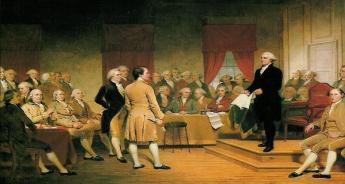
|
| Delegates |
Benjamin Franklin, who for over 40 years had been working on a plan for a union of thirteen colonies (since 1745, long ago producing the first American political cartoon for the Albany Conference), devised the compromise. It was essentially a bicameral legislature -- with undiminished relative power in the Senate for small states. In this backroom negotiation, it was pretty clear Franklin held the support of two powerful but mostly silent big-state delegates, Robert Morris and George Washington. These were the three men of whom it could be said, the Revolution would never have been won without each of them. In 1787 they were still the dominant figures in diplomacy, finance, and the military. All three were deeply committed to a workable Union, each for somewhat different reasons. Now that a workable Union was finally within sight, parochial squabbles about states rights were not going to be allowed to destroy their dream of unity.
And so it comes about, they gave us a Federal government with a few enumerated powers, ruling a collection of state governments with regional power over everything else. And since big-state/small-state squabbles are unending, almost any other solution to some problem repeatedly, seemed preferable to disturbing what holds it all together. On the other hand, the Industrial Revolution was beginning at about the same time, and people who recognized the power of larger markets almost immediately set about attacking state-dominated arrangements, systematically weakening them for a century, and redoubling the attack during the Progressive era at the end of the 19th Century. Attacks on what seemed like an abuse of state power, the power to retain slavery, and later the power to perpetuate white racism, were claimed to justify this attrition of states rights. The ghost of the Civil War hung over all these arguments, restraining those who pushed them too far.
However, the driving force was industrialization, with enlarged businesses pushing back against the confinement of single-state regulation within a market that was larger than that. This restlessness with confining boundaries was in turn driven by railroads and the telegraph, improving communication and enlarging markets, which offered new opportunities to dominate state governments, and when necessary the political power weakens them. One by one, industries found ways to escape state regulation, although the insurance industry was the most resistant, whereas local tradesmen like physicians found it more congenial to side with state and local governments. The 1929 crash and the Franklin Roosevelt New Deal greatly accelerated this dichotomy, as did the two World Wars and the Progressive movement from Teddy Roosevelt to Woodrow Wilson. The Founding Fathers were said to have got what they wanted, which was a continuous tension between two forces, supporting both large and small governments; with neither of them completely winning the battle.
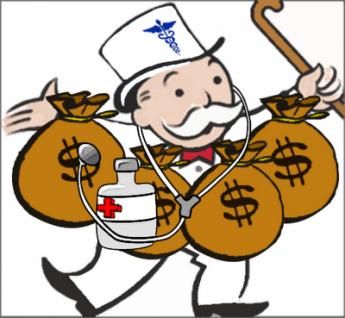
|
| Insurance Monopoly |
The medical profession further evolved from a small town trade into a prosperous profession during the 20th century, but the practice of medicine remained comfortably local. Even junior faculty members who move between medical schools quickly come to realize their national attitudes are somewhat out of touch with local realities. For doctors, state licensure and state regulation remained quite adequate, and state-regulated health insurance companies paid generously. State-limited health insurance companies had a somewhat less comfortable time of it, but the ferocity of state-limited insurance lobbying, as exemplified by the McCarran Ferguson Act, perpetuated it. The medical profession watched uneasily as the growth of employer-paid insurance extended the power of large employers over health insurance companies beyond state boundaries, and thus in turn over what had been medical profession's kingdom, the hospitals. And the medical profession also had to watch increasing congeniality with big government extend through businesses, unions and universities, fueled by overhead allowances of federal research grants and finally in 1965, federal health insurance programs. Nobody likes his regulator, but national organizations inevitably prefer a single regulator to fifty different ones. Furthermore, everybody could see that health care suddenly had lots of money, and naturally, everybody wanted some.
 There is nothing naturally inter-state about medical care -- except health insurance. 
|
To be fair about it, there was not a strong case for state regulation, either. It could have been argued that uniformity and reduced administrative costs favored central regulation over-dispersed control, because of improved efficiency; and few would have argued about it. Until the ACA insurance exchanges crashed of their own weight around the ears of hapless creators, that is, unable to do what Amazon seems to do every day, and raising quite a few embarrassing recollections. Recollections of the mess the Sherman Antitrust Act inflicted on local medical charity in Maricopa County, Arizona. Recollections of the "Spruce Goose" airplane that Howard Hughes made so big it couldn't fly. Recollections of the gigantic traffic jam strangling the District of Columbia every weekend. And, reminders that 2500 pages of legislation remain to be converted into 20,000 pages of regulations which it would take a lifetime to understand. Suddenly, let's face it, retaining state regulation of health care, or not rocking the boat, gets a lot better press. It might even work better than the national kind, especially in an environment where no one expected a perfect solution, and just about everyone had heard of the Curse of Bigness. When we first discovered that use of health insurance added 10% to the cost of health care, it had seemed like an easy place to extract 2% of the Gross Domestic Product for better things, just by streamlining administration. But after the health exchange fiasco, some people begin to wonder if 10% is just what it costs to use insurance to pay for healthcare. If that is the case, perhaps we should look at other ways of paying our bills, not just a different regulator. Nobody would pay 10% just to have his bills paid, if he understood what he was doing.
The Streets of Philadelphia, on Ben Franklin's Birthday
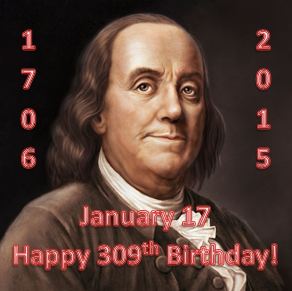
|
| Benjamin Franklin 309th Birthday |
They changed the calendar in the Eighteenth Century, so it's always confusing to talk about the birthdays of the Founding Fathers. Benjamin Franklin for example was born on January 6, 1705, but by the time he got around to being famous, he was born on January 17, 1706. Scholars handle this awkwardness by saying he was born on January 17, 1706 [OS, January 6, 1705]. That's not all the problem, however. This year on January 17 he had his 309th birthday, unless you wish to say he had his 310th birthday on January 6. The novelty has long since worn off, and nowadays most birthday celebrants prefer just not to mention the matter. You might think Don Smith would think this is of vital importance, but he cheerfully brushes it off with a chuckle.
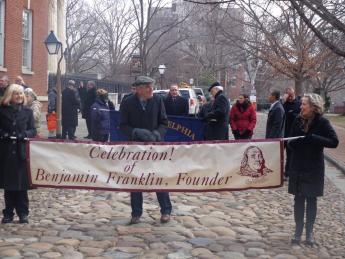
|
| BenFranklin Celeabration |
Don Smith is the current leader of the Ben Franklin Birthday Celebration, which is held at 9 AM every year, on January 17th [NS], starting at the American Philosophical Society's Franklin Hall on Chestnut Street, once a very substantially-built bank building. The constituent members are affiliated with one of the thirty-odd organizations which Franklin founded, although anyone interested is welcomed. On what usually turns out to be the coldest day of the year, the birthday celebrants gather for hot drinks and cookies, followed by one or two really outstanding lectures about Franklin. Sometimes the lecture's connection to Franklin is a little stretched, but all of them are excellent. At 11 AM, the group marches together to Ben's grave at 5th and Arch for a short ceremony, led by Franklin re-enactors and honest-to-goodness members in the uniform of the National Guard, which Franklin founded. He did so when the Spanish and French ships were bombarding the coast, and as the editor of the town's newspaper, Franklin called for troops to defend us. The Quaker government declined to be violent, so Franklin published an invitation for volunteers to bring their guns and join him. Ten thousand showed up, and Franklin's career in public life was established. He was a hero to everyone -- except Thomas Penn, who saw him as a threat. Much subsequent Colonial history revolves around this episode and its consequences.
After the march, the group settles down for a good lunch, and hears yet another outstanding lecture. This year it was given by Paul R. Levy, the President of a planning organization called the Center City District. Steve's message this year was about how the streets of Center City Philadelphia were constructed for walking, or at most riding horseback. That is, they were narrow. They widened somewhat as they went West and had to accommodate a city of carriages. That was quite good enough through the Gilded Age, when Philadelphia could credibly claim to be the richest city in the world.
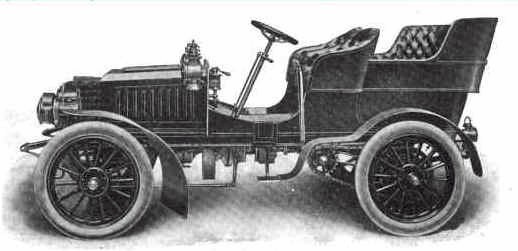
|
| Auotmoblie |
But then what happened was not the two World Wars, the stock market crash of 1929, or anything resembling that. What happened in Paul Levy's view, was the automobile. Hundreds, then thousands of autos filled the streets, scattering chickens and children, and eventually making the city impassible. Nothing would do but to move to the suburbs, which among other things provided the thrill of driving too fast and too carelessly, and reducing the pedestrians while increasing the business of accident rooms. There was certainly no room for bicycles, which were driven away without a tear being shed, and defying the efforts of city planners to find a safe place for them. Europe, good old Europe where we came from, was more successful in hounding the imposter autos off the bike paths of Amsterdam and Copenhaven. And preserving intercity high speed train service, at great taxpayer expense. Those Europeans really know how to live, in sidewalk cafes, unaffected by bicycles, preserving a much older collection of narrow city streets leading to empty cathedrals, in Germany, France, and Central Europe. That wasn't the American way, at all. We just pulled up sticks and moved to the suburbs, abandoning the dirty old defeated cities to their ethnic neighborhoods.
It's a novel theory, and maybe even a correct one. It could explain a lot, if Philadelphia is seen as a victim of Detroit, strangling on their mutual industrial excesses.
After London, Ben Franklin Revisited

|
| George Goodwin |
George Goodwin appears to have written the best book I ever read, in Benjamin Franklin in London, which that writer in residence of the Craven Street Franklin Museum. has just produced. At least I have never read a book which proceeded to explain so much I knew puzzled me. There have been hundreds of books about Benjamin Franklin, but all of them fall back on Franklin's Autobiography which while surely authoritative, often omits significant details. Goodwin, concentrating on the eighteen years Franklin spent abroad, had access to many unnoticed personal papers. It was also written while Franklin was in England, where many things did not appear to need an explanation to 18th Century Englishmen. And the autobiography was written for his son, who needed even less explanation. So it's a mistake to ascribe the autobiography's vagueness to deliberate deviousness, to say nothing of basing a whole theory of his personality on deviousness. Its hazy points now seem more attributable to his assuming his intended audience needed little explanation for what to us was seemingly left vague. And so as a first impression, Franklin himself emerges less deserving of his reputation for deceptiveness.
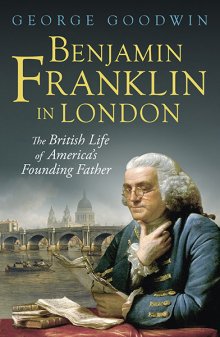
|
| Ben Franklin In London |
It occurred to me as I read it, that national opinions will change so quickly, that the transitional opinions of people like me will soon be swept aside. I am no scholar, but have read twenty or so excellent books about Benjamin Franklin, and adopted a number of fixed ideas which I will have to change. Therefore, Goodwin's achievement is in danger of becoming lost in a stampede of permanently revised views. Goodwin himself may be oblivious to his own achievement, which was probably gathered slowly after poring over heaps of primary documents and living in a London world which needed less explaining to a Londoner. Heaven knows I am no Keats, but my place in all this can possibly aspire to his goals in the poem On First Looking into Chapman's Homer.
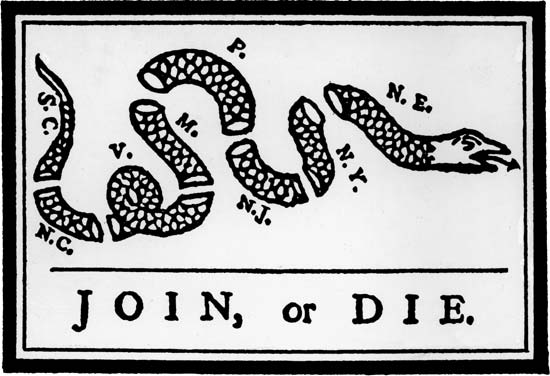
|
| Join or Die |
In the first place, Franklin appears to have been a staunch British subject, at least from the Albany Conference of 1754 to as late as 1774. His dream, formulated at Albany and expressed in many forms later, was that of a combined British-American empire, with its headquarters eventually to be located in America. For the largest part of his life, his attitude was not that America should be independent of Britain. It was the two nations should unite even more closely, America would inevitably grow larger, and the British Empire would become a British World. After King George III unleashed Wedderburn to excoriate Franklin before the crowned heads of Whitehall, it all changed, of course, but it did so after a personal dispute with the King about lightning rods, where Franklin never doubted he was the world-acknowledged authority. In essence, Franklin was the inventor of electricity, but King George in effect responded, "Who do you think you are, a King?" Those weren't the words they used, but that was the sense of it. Or, considering what was at stake, the nonsense of it. Franklin had been challenged to destroy the British empire if he was so smart, and that is exactly what he set about to do.
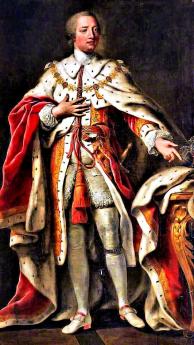
|
| King George III |
Without editorializing a word, Goodwin allows us to read a line Franklin wrote in 1773, that King George was "perhaps the only Chance America has for obtaining soon the Address she aims at."
Franklin was not without British allies. Lord Chatham, later Prime Minister, and Edmund Burke, author of "On Reconciliation With the Colonies" came very close to toppling the government over this issue. Even Lord Howe, Franklin's chess partner and brother of even-more-avid chess partner Lady Carolyn Howe, who was later designated to lead the British repression of the rebellion, is quoted as saying in 17XX, XXXXXXXX. Lord Howe's words are going to require some re-examination of his motives in the abandonment of Burgoyne against direct orders, and redirection of the fleet toward Philadelphia. Frankin's response, of course, was to use the victory to sign a treaty of alliance with France.
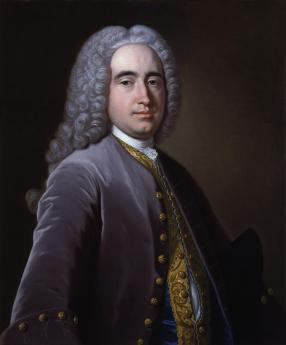
|
| William Pitt 1st Earl of Chatham |
In victorious America, of course, Franklin was celebrated for flying a kite in a rainstorm, something every schoolboy knows is too dangerous to try. It was during his time in England that Franklin performed a series of experiments which invented electricity which every physicist would agree would today win him a Nobel Prize. It made him a friend of Mozart and Beethoven, Joseph Priestley and five kings. Goodwin even restores the tarnished reputation of Peggy Stevenson.
But it isn't all for the better. Goodwin tells us Franklin didn't invent bifocals, some British optometrist did. So he raises a question, for those who are looking for it, about how many of the other American "firsts" for which he is famous, were ideas he picked up in his first trip to London in 17XX, and transported to an America eager to have what was the latest and trendiest. There are probably other innuendoes in this eminently readable but essentially scholarly work. But I missed them, and a hundred graduate students will have to put the record straight.
Ben Franklin and Brexit
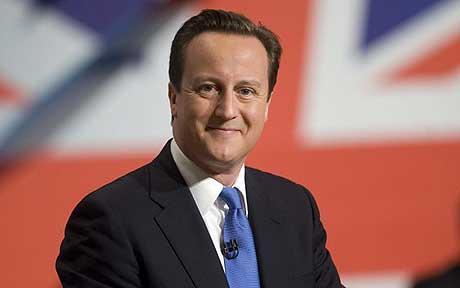
|
| Minister David Cameron |
In June 2016, Great Britain voted by a million plurality, to withdraw from the European Union. The plebiscite was not binding on Parliament, but Prime Minister David Cameron promptly resigned, and there remains little discussion of anything but going ahead with "Brexit". It will take at least two years to accomplish the matter, and there remains great uncertainty about the terms of separation. The British stock market took a sharp dip. Stock markets always hate uncertainty, and from the start, there was little doubt Britain would experience some economic hardship, but still they went ahead with it.
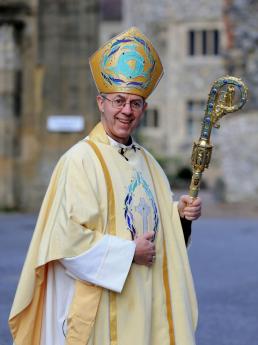
|
| Archbishop of Canterbury |
By the greatest stroke of good luck, I happened to be in London for this event. It had been barely noted in the Americana press before I left, and indeed a discussion group hadn't even put it on the agenda after my return. But let me tell you, the British public was talking about nothing else. From the lowest barmaid in a pub to the Archbishop of Canterbury, there was only one topic of conversation and a very real understanding that Britain might well vote to leave the EU. Once the vote had been taken, of course, even the American public appreciated its significance and its resemblance to the headlong tumult in our own political parties. Donald Trump might well win the election, and logic or rhetoric had little to do with it. Other countries, Scotland in particular, were teetering in the same direction of demonstrating how far a democracy was from a republic when each "leader" had a million constituents. And how well the public appreciated the tendency of elected representatives to forget who elected them. Or else, in more rational moments, to appreciate how difficult it is for elected representatives to communicate with constituents.
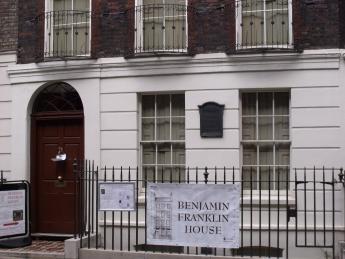
|
| Ben Franklin London Townhome |
To go on with this insight for a moment, my Washington daughter tells me Democrat congressmen are required to spend thirty-six hours every week in a call center, soliciting campaign funds; where do they find time to legislate? But the central background reflection I happened to have about Brexit was how enduring the political split apparently was between the Whigs and the Tories. This thought came to me from one of the real reasons I was in London, to visit Ben Franklin's imposing rowhouse on Craven Street, fifty feet from the National Museum on Piccadilly. Franklin lived there for most of eighteen years, in a style quite different from the two-penny loaf of bread in Philadelphia. He was personal friends with five kings, Voltaire, Mozart, and Beethoven, as well as Priestly, Lavoisier, and Hume. Townsend may indeed have passed the Stamp Act, but he invited Franklin to spend the weekend at his hundred-room castle. The neighbors on Craven Street easily recognized the carriage of the Prime Minister when he came to call on Franklin on Craven Street. From the point of view of this social set, the uproar over the colonies was whether England should conquer them and send their raw materials to British factories (the Tory view), or should instead colonize them with Brits, give them the vote, and rule the world as a commonwealth (the Whig view). Naturally, Franklin supported the Whigs, but his loyalty to his good friend George III never wavered until 1775. And then, lightning struck St. Paul's Cathedral.
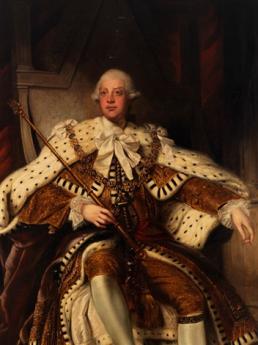
|
| King George III |
Quite logically, the King asked Franklin's advice. The King, however, insisted on a brass ball on the top of the church. Franklin resisted, saying a spire was much more effective. We don't have the exact words exchanged, but essentially the King said he was going to have his way, while Franklin in effect asked him who he thought he was talking to. In those days, far less direct wording was needed to give offense on such a central issue of the king having the last word whenever he wanted. It is intimated the King suggested to Wedderburn he should take care of the issue for him, and within a few weeks, Franklin was subjected to public humiliation in the cockpit at Whitehall, threatened with arrest, and fled to America to start the war. I had never heard this story, before.
The point leaves me with is not that Franklin lost his cool and should have known better than to express his opinion. Rather, it is the reflection that never before had a king been challenged on his divine opinion on any subject. Just think of the shock this must have caused him, to have to realize this was the first snowflake in a blizzard. With the Enlightenment and the Industrial Revolution, the world was going to be full of experts, who could make a fool of any king by disagreeing with him in public. This particular king was able to have his way, no matter what, but the day was soon approaching when any science editor, any university professor, and ultimately every barmaid in a pub, could pontificate to the Pontiff.
Charter School Warfare
The Right Angle promptly invited Jason Mayland, school consultant, a second time, after he had mentioned the first time that Charter schools were "a whole different topic by themselves," during the first time he was here. The room was packed, and the intensity of the audience was something to behold. This is a very explosive subject, and most people doubt the full truth of what they have been told. All right, let's have it.
After all, most of us are old enough to remember when the Philadelphia public schools claimed to be the best in the nation, and Catholic parochial schools were also said to be the best. Right now, there is an uneasy feeling the deplorable state of the schools is responsible for much of the city's decline. There is a general opinion the schools are unsafe, expensive, and failing. It certainly is true the claim is being made that they only need more money, at the same time they are said to cost $100, 000 per year for each teacher to produce deplorably bad results. It all goes to reinforce a general feeling in the public that this subject is important, expensive, obscure -- and we are being lied to.
Our speaker did clarify one important aspect pretty quickly. We have about 40% fewer students than we used to have, which creates vacant school buildings and excessive pension costs from the past, a subject he referred to as "sunk costs." He wasn't sure why we had fewer students, but it's probable that we do, and by itself, this issue would account for a large part of the dispute about how we can overspend and underpay the teachers at the same time. It's probably not the whole story, and it doesn't explain where the students went, or why. But it's a fact of the matter and doesn't sound like a sort of thing which is easily fixed. It might even be something which more money could help, and with the passage of time, might get better just by attrition. With the city finances in bad shape, it probably isn't going to get city money, but the local discovery of oil shale might hold out some hope. Unfortunately, the people who live on top of that shale want to keep the tax revenues for themselves, and it is certainly true they are entitled to something after a century of poverty. A situation in which the rest of the state was supported by a Philadelphia surplus, whereas it has been true for decades that the rest of the state is supporting Philadelphia.
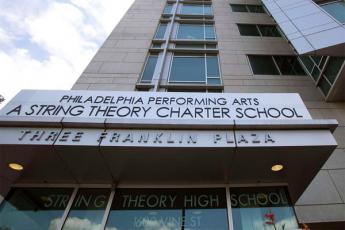
|
| String Theory Charter School |
About half the schools are now charter schools, but the difference in teaching quality is more controversial. Essentially, the parents say there is a big difference, and politicians are keeping their children from getting it. The teachers say the difference is very small, and the extra cost is very large. The proof of the quality of teaching is difficult to obtain, and worse still is in the hands of the teachers themselves, who want very much to slant the results in their own favor. Even if they don't slant the results, they maintain the good students have been skimmed off, leaving them with inferior students. The rest of the arguments have the same quality: disputed results, and testy disputes. The rest of the Right Angle Club tended to agree with an earlier speaker that random scholarships show that private schools make a big difference until we learned that Charter schools are not private, but part of the school system. So, let's repeat what we think we know: private schools would make a big difference for the kids, but maybe charter schools won't. If we could change the charter schools to be more like private schools in some way, perhaps we should do that. Since we don't know what the essential ingredient in private schools would be, perhaps the conversation should be between private schools and charter schools. Heaven forbid we change the public schools. If we could find out what the difference is, and put it in a bottle, we are ready to make the charter schools drink it. That's what the public schools are demanding, but after all these years of malfunction, their credibility is very low.
There's even another thing we could do. Every seventy years, perhaps we should change the political machine in charge of the city. Come to think of it, that would be about now.
B. Franklin, a Chronology
Chronology
Born 1706 --the fifteenth child of a Boston candle-maker, Josiah Franklin, the seventh child of his second wife.
Died, April 17, 1790--Buried in Christ Church Cemetery, in Philadelphia, after a celebrated funeral parade. The President of Pennsylvania.
Germany Before Germantown
A breezy summary of European geopolitics, including many rough inaccuracies, will possibly irritate residents of that region who read it but may help Americans understand the history and composition of the Germantown area of Philadelphia.
The Western World was defined as a province of Rome, and all roads led there. A better unifying concept would be, the Alps are the center of Europe and all roads had to go around those mountains. At the northern end of the Italian boot are the Swiss Alps, forcing even Romans to go through what is now Provence in France to get around them. Rivers run off the tops of mountain ranges, of course, and then trickle away to some sea. An old jingle defines the river system of Switzerland as The Rhine, the Rhone, Danube and Po--arise in the Alps, and away they go!"
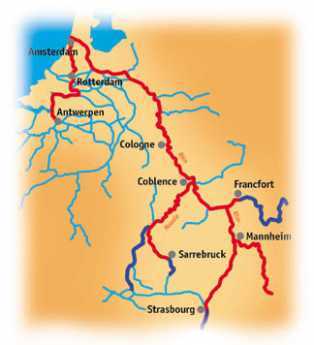
|
| Rhine River |
So northward-bound Romans, Julius Caesar and all, went West around the Alps up the valley of the south-flowing Rhone, eventually portaging over to the north-flowing Rhine River flowing to Rotterdam, which in turn is just across the English channel from mouth of the Thames leading to London, or Londinium as they called it. The crossover between the Rhone and the Rhine was at Strasbourg where the European Parliament now meets. For two thousand years, the main highway from Rome to London was via the Rhone-Rhine-Thames river complex.
Essentially, residents to the West of the Rhone-Rhine were Roman Catholic, and residents to the East were Protestant. At least, that was as true in the Sixteenth Century as reciprocal genocide might accomplish. The head of the Rhine River in Switzerland was Calvinist Protestant, and the mouth of the river in Holland was Reform Protestant. Along the main part of the river, Alsace, Lorraine, Palatine, Luxembourg,divided East and West but for centuries pieces of land shifted control back and forth. The reformation movement started by Martin Luther ended up as the Thirty Years War, from which the region took another hundred years to recover, and more hundreds of years to forget and forgive. You might call it a religious Mason-Dixon line, remembering of course that the American Civil War was mostly fought on the Potomac, not the Mason Dixon.
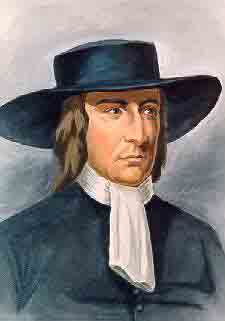
|
| George Fox |
Professional soldiers teach military students that there is no war more remorseless than a religious war. Lots of people, probably thousands, were burned at the stake during the religious wars along the Rhineland. Rape and pillage were common practice. And so, if you lived in a little farming village in this region, and some Englishman named William Penn came around with an offer to emigrate to his peaceful kingdom in America, it sounded wonderful. Religious toleration was an important part of the attractiveness, and nowhere to be found in Europe.
William Penn's mother was Dutch. It is likely he spoke the local languages. For a number of years in his youth he had traveled in the Low Countries and the Rhineland, preaching the ideas of George Fox The Quaker. And then, one day he arrived with a brand new idea. The King of England had given him a huge stretch of uninhabited land in the New World, no doubt influenced by the idea that Quakers were a nuisance and this was a good way to get rid of them. Whatever. Penn was selling land grants, and he could be trusted. Why not give it a try?
Union, Now and Forever
BIG nations gobble up small ones, so small ones band together. As George Washington observed, when you are strong the others leave you alone. But other forces sometimes make smallness seem more attractive, especially if the nation is already uniform in religion, language, and culture. Nations search for an ideal size for both War and Peace and discover they praise two incompatible sizes. Both the American Revolution of 1776 and today's struggles of the European Union fit a common formula: banding together for military security, then pulling back from declining Liberty. The American experience of a Civil War after eighty years under the Constitution suggests the margin for error is narrow. And enduring; even in the Twenty-first century, it is striking that both little Scotland and that little bit of little Belgium that is Flemish seem willing to sacrifice major economic benefits for what seems to outsiders a minor step for Liberty. But the whole point of the Constitutional Convention then seems to emerge: Nine years previously, thirteen separate sovereignties had been more or less hustled into a military alliance by the appearance of a hostile British fleet. That war was now over, the thirteen had grown accustomed to living together, but the Articles of Confederation had not foreseen a large nation clearly enough in 1776. The Articles did not even provide for an executive branch. In the chaotic conditions of 1787, a calmer choice could be made between breaking apart and unifying, for a different set of reasons based on Peace and Prosperity rather than war: Either surrender some aspects of state power to a real union or let each contentious state confront its future, unsupported. In many ways, it was the vision of Liberty which changed between times of peace and times of war. In 1860 the stakes were higher than in 1787 but the issues were mixed. Industrializing states in the northern part viewed the Union as an economic opportunity. Purely agricultural southern American states were not so sure; in the end, preferring the older set of rules, they took their leap. To the amazement of Southern leaders, the North was ready to die to preserve that Union, and so the demands of warfare reasserted themselves.
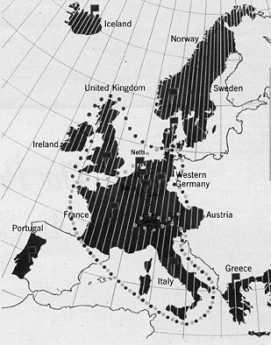
|
| Europe |
Geography doubtless imposes variable limits for both war and peaceful prosperity, anywhere. Some nations have therefore banded together for military reasons then split apart in local quarrels, more or less regularly. Thirteen American colonies had been afraid to confront Britannia alone, but somewhat overconfidently took on that challenge as a confederation. At the other extreme, little Rhode Island even refused to send delegates to the Constitutional Convention, fearing big neighbors more than remote British rule. Fortunately, similar possessiveness about local perks was unable to collect enough political power to dominate other states. After a year by the time of the state ratifying conventions, however, it was a close call. Peace and prosperity: getting bigger discourages predators, but getting smaller offers sole possession of what you have. Since the United States grew in jumps through most of its history, it probably learned intangible things from alternating episodes of being too big and then too small. Frederick Jackson Turner's thesis of the advancing frontier as a shaper of culture is not greatly different in the essence of its argument.
When ideas of Union first gained traction, both the thirteen American colonies in the Eighteenth century and the twenty-five nations of the Eurozone in the Twenty-First, were dominated by the memory of war. The American objective was the simple one of military parity with a common enemy. The nations of the European Union had a longer view; a seemingly endless cycle of bloody wars sustained their conviction that other wars would inevitably follow unless they did something innovative. National unification on the American model sounded ideal but difficult. Perhaps the habits of cooperation and trade would lead to it. The unexpected decline of the Soviet empire further reduced the fear of war. Pride may also have led to over-reaching; twenty-five is comfortably larger than thirteen, which up to that time was the largest nation merger to survive. But twenty-five is smaller and thus more manageable than the present American fifty. To begin the process with monetary union might produce quick benefits from a source too mysterious to produce much public resistance. Nobody could think of a war started by a monetary dispute.
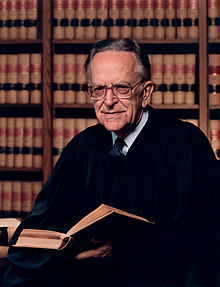
|
| Justice Blackmun |
, Of course, the Europeans expected difficulties from speaking many languages, but they probably still underestimate how far the legal profession has already gone in confining nuanced words to a single meaning; it is essential to their trade. When many languages split off from a common stem, many unaccepted interpretations re-emerge when they are later re-combined. Even without the nuance problem, translation into many languages is a serious expense, which is at least as burdensome as currency exchanges were among multiple sovereignties. By contrast two centuries earlier, the American revolutionaries shared a single language but soon found espionage was an unusually serious problem. Even their enemy spoke English, so sometimes improved clarity itself creates unexpected problems. Indeed, in American disputes about Original Intent, we repeatedly encounter the tenacity of people believing a document says what they want it to say. Vigorous legal advocates think they are paid to marshall every argument weak or strong. Staying within the English language, the evolution of U.S. Supreme Court interpretations often turns on subtle differences in the meaning of simple words. Penumbras and emanations from the word "Privacy" in Roe v. Wade soon force our judges to decide whether abortion within a right of privacy is simply too far from a common understanding of English, in a double way. Both in the discovery of a right to privacy within a document which does not use the word, and then in the inclusion of abortion within that, Justice Blackmun clearly overestimated the capacity of excited citizens to be flexible. Much more surely, he would have overestimated public willingness to grasp his meaning in two-step translations of a foreign language. Since this famous decision is destined to stand or fall, depending on public tolerance for such wordplay, having almost every citizen confidently understanding English is at least one advantage. Parenthetically, we will need every advantage possible. The really serious box which Justice Blackmun put us in, was to invent a Constitutional mandate which thus can only be compromised in a Constitutional amendment. In almost every other conflict, the system of checks and balances permits either the Congress or the state legislatures to soften the conflict with conciliatory modification. The constitutional amendment is already difficult to achieve; inflaming the religious passions of the forty-odd bodies who must agree to amendment makes amendment nearly impossible.
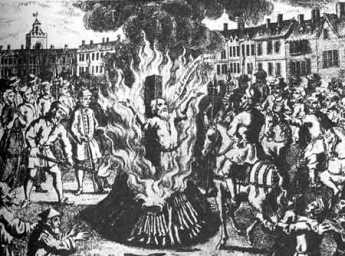
|
| Auto-de-fe |
By contrast with important language confusions, "hatreds between nations" are often mentioned as an obstacle to unification but the claim seems largely bogus. Argot and slang are commonly invented to conceal the opinions of a minority group. Over thousands of years, this purpose of "jiving" a secret code among conspirators has been perfected exquisitely. It's hard to overcome, easy to teach children. But the memory of actual wars really dies out rather quickly, not least because atrocities are so hideous, mankind wants to forget them. I was seventy years old before someone told me I had ancestors burned at the stake. By whom? By someone who has also been dead for four hundred years, not likely to seem threatening to me. Over the fifty years since the Second World War, I have run into former German and Japanese soldiers; they now seem pretty benign. One American former prisoner of war was forced to stand at attention while his Japanese captor pulled out his gold teeth with pliers; he told this story with a faint smile. It is one of the benevolence of biology that we are born without memories, and a second is a biological impossibility of remembering the feeling of pain without first re-dramatizing the experience for future reference. Once actual onlookers stop grinding the grievance ax, it should be possible to get on with devising a European constitution, provided it contains a meaningful equivalent of our First Amendment.
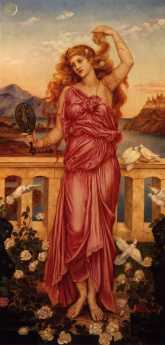
|
| Helen of Troy |
It's an important point for a proposal unifying two dozen different priesthoods and a number of nations wholly defined by a single religion. A workable constitution for them must contain a strict separation of church and state, because ballads, epic poems, and traditions are synthetic, quite different from actual experiences. Helen of Troy may or may not have had a face that launched a thousand ships, but Homer's Iliad certainly glorified more hatred than she did; who can say whether the poem portrays the truth? That's the war side of things; the Odyssey is powerful in evoking the special virtues leading to prosperous nationhood. Because you can't argue or reason with epic myth, it is the many exaggerated glorifications and exaggerated condemnations by them which supply endurance to patriotic myths, easily reducing macroeconomists of the European Central Bank to tears of frustration. Because the best of these epics stand alone as powerful literature, their propaganda strength is all the more difficult to deconstruct with mere logic. Quoting Arnold Toynbee, it is not weaknesses, but overextension of their finest qualities, which usually brings nations down.

|
| Euro Zone |
While true grievances seldom pose obstacles of their own, they do often misdirect political leadership from what is best for their countries. European Unification had a primary goal of eliminating future wars, but its leaders decided the peace goal was achievable only by indirection and began first with monetary tools for prosperity. That takes a long time; America was still fumbling monetarily until the end of the Civil War. So while starting with small victories seems a plausible route to big victories, in fact, it drains much of the idealism out of revolutions by avoiding the cataclysmic issues which justify great sacrifices. Even worse, it here made the financial disaster of the Euro symbolic of tawdry hazards on the road to Prosperity, raising issues of corruption and self-advancement, rather than idealistic sacrifice. At least when you struggle for national security, every day you survive is another victory. There is, of course, no room in past struggles for Americans to gloat over their superior approach to permanent Union. But a defeat is a defeat, and the Euro mess could become a big defeat.
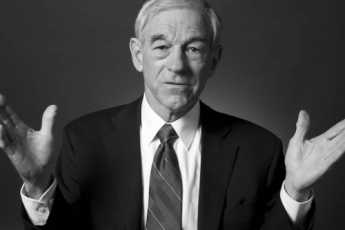
|
| Congressman Ron Paul |
From a commentator's perspective, currency matters are difficult to understand and explain. For contrast, the Battle of Normandy is thrilling and awe-inspiring; every death is the death of a hero. But rises in productivity and the risk implications of volatility, seem hopelessly confusing to an economics beginner. Worse still, there exists real uncertainty among experts. We now have a currency which has no backing in precious metals and is really just a book entry. That's useful for transactions, less certainly useful for a storehouse of value. Mr. Ron Paul ran for President of the United States challenging the whole Federal Reserve concept, and a possibility must be admitted that his speeches have a grain of truth. We trust our bankers to devise a workable system of exchange without gold and silver, and readily admit that Mr. Bernanke knows more about it than we do. But. But the world economy nearly collapsed utterly a few years ago, and you know, Dr. Ron Paul might just have a valid point or two. Europe has not yet emerged into a fit environment for enjoying a monetary Crusade to a World Without War. For a striking contrast, just go to any Civil War movie. And watch those teenaged soldier boys charge up the hill, ready to die for the Union.
REFERENCES
| A Study of History Arnold J. Toynbee ISBN-13: 978-0195050806 | Amazon |
Boundary Disputes
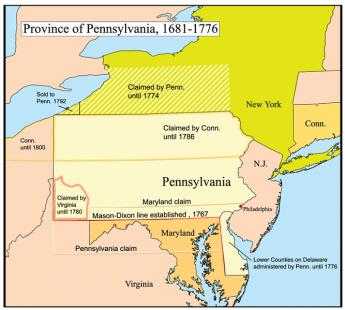
|
| Four Corners of Pennsylvania |
When you talk boundaries, a good lawyer is what you need. Pennsylvania had the best in William Penn. Prior to 1776, the boundaries between the American colonies were settled in London, either by the King or the British courts. After 1787, disputes over boundaries were settled in the United States Federal Courts, acting under Section III of the Constitution. Generally speaking, boundaries were first created by treaties, by Kings, and by Congress. Boundary disputes were then settled in the courts, first in England, and later in Federal Courts. Between 1776 and 1787, however, the Articles of Confederation governed. The immediate problem was that the Articles were not finally ratified until 1781. A technical problem was that surveying instruments were improving during this period. The judicial problem was that a body of law was evolving about when to use the deepest channel of a river or when to use the half-way point between the two banks of a river, and when to use just one bank of the river or the other. And the political problem was that major immigration made everyone less care-free about boundaries of the land which were steadily growing more valuable. The American period under the Articles of Confederation was one big argument about state borders.
A century earlier, when British kings were handing out charters to those adventurous enough to accept them, there was plenty of cheap lands if someone could defend it. The common approach to granting charters was to pick two points along the Atlantic, and from there to extend lines westward as far as they could go. When the lines bumped into lines given to other colonies, there were countless lawsuits and occasionally little wars. Only the three Quaker colonies of New Jersey, Pennsylvania and Delaware were formed late enough in the colonial period to enjoy practical ways even to define a western border. Virginia, the largest colony, officially extended itself to include what is now Kentucky and West Virginia, and had reasonably defensible claims to all the land of the Northwest Territory, on the western side of the defined Pennsylvania western border, all the way north to the Great Lakes. When the Indians finally woke up to what was happening, they rebelled under the leadership of Pontiac and Tecumseh and were helped in their massacres of white settlers by the French, later by the British. Peaceful rectangular Pennsylvania experienced armed nibbles at each of its four corners; from Maryland in the southeast, Virginia in the southwest, Connecticut in the northeast. On its northwestern corner, Pennsylvania had the award of the Erie connection to the Great Lakes to settle an overlapping conflict between Connecticut and New York. The Articles of Confederation, composed mostly with common defense against England in mind, were deliberately inadequate to govern disputes between allies within the revolters. Discovering remarkable subsidence of such disputes after the installation of the Constitution, this might well have become a major reason for replacing the Articles of Confederation if it had been foreseen. But that was scarcely the case. The American colonists simply had no idea the Union would make such disputes immediately seem trivial if still remaining fairly numerous. When the advantages of peaceful unification are considered by other nations on other continents, consideration really should highlight the sense of delight America felt at the discovery of this unexpected bounty. At a minimum, it helped us ignore the many fumbles we also experienced.
| Posted by: bob florig | Oct 25, 2007 8:23 AM |
thanks!
| Posted by: shawn jingre | Dec 12, 2006 11:02 AM |
70 Blogs
Benjamin Franklin: Chronology
 Franklin retired at age 42, and spent the other half of his life in public service. Only fifteen years of that career was spent in America. His timing was good, however; he was here for the French and Indian War, the Declaration of Independence, and the Constitutional Convention.
Franklin retired at age 42, and spent the other half of his life in public service. Only fifteen years of that career was spent in America. His timing was good, however; he was here for the French and Indian War, the Declaration of Independence, and the Constitutional Convention.
Franklin Crown Soap
 The Boston Franklin's were supported by discovering that adding salt to soft soap would harden it into soap bars. Eventually, the secret was leaked and soap bars became commonplace.
The Boston Franklin's were supported by discovering that adding salt to soft soap would harden it into soap bars. Eventually, the secret was leaked and soap bars became commonplace.
Logan, Franklin, Library
 James Logan and Benjamin Franklin were at the opposite ends of the social scale in Colonial Philadelphia and were to adopt strongly differing political views. But each recognized the intellectual power of the other, and they were fast friends.
James Logan and Benjamin Franklin were at the opposite ends of the social scale in Colonial Philadelphia and were to adopt strongly differing political views. But each recognized the intellectual power of the other, and they were fast friends.
Franklin: Upstart Hero of King George's War (1747)
 'King George's War' was two wars prior to the Revolution. Ben Franklin raised an army when the Quaker proprietors' wouldn't. The experience maybe gave him ideas.
'King George's War' was two wars prior to the Revolution. Ben Franklin raised an army when the Quaker proprietors' wouldn't. The experience maybe gave him ideas.
Addressing The Proprietors' Dilemma
 King Charles II gave Pennsylvania to William Penn on condition he defends the place and fuss with neighboring states about its boundaries. A century later, it proved more than a private citizen could handle.
King Charles II gave Pennsylvania to William Penn on condition he defends the place and fuss with neighboring states about its boundaries. A century later, it proved more than a private citizen could handle.
B. Franklin and Daylight Savings
 Daylight savings time was devised by Benjamin Franklin, but recently its value has been challenged.
Daylight savings time was devised by Benjamin Franklin, but recently its value has been challenged.
Rise and Fall of Books
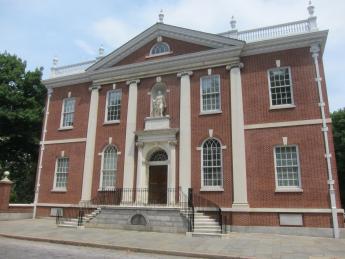 The The Director of America's first library sees books as mainly a 19th Century phenomenon.
The The Director of America's first library sees books as mainly a 19th Century phenomenon.
Philosophy Means Science in Philadelphia
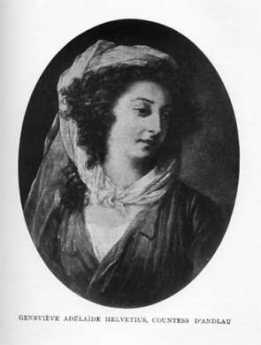 At least until he met Madame Helvetius, Benjamin Franklin displayed little interest in moral philosophy. His interest was in science, which was called natural philosophy in the Eighteenth Century. The American Philosophical Society is America's oldest and most prestigious society of scientific scholars. If investing is a science, the APS is good at that, too.
At least until he met Madame Helvetius, Benjamin Franklin displayed little interest in moral philosophy. His interest was in science, which was called natural philosophy in the Eighteenth Century. The American Philosophical Society is America's oldest and most prestigious society of scientific scholars. If investing is a science, the APS is good at that, too.
B. Franklin, Scientist
 Kites are children's toys; going out in a thunderstorm is deliciously dangerous. We have thus been taught to regard Franklin's science as a lark, when in fact he largely discovered the nature of electricity and was regarded as one of the greatest scientists of his age.
Kites are children's toys; going out in a thunderstorm is deliciously dangerous. We have thus been taught to regard Franklin's science as a lark, when in fact he largely discovered the nature of electricity and was regarded as one of the greatest scientists of his age.
Pembertons
 One of the oldest, most prominent Quaker families contained a multitude of famous, rich, distinguished leaders. Many suffered imprisonment or exile for their pacifism, but one Pemberton is the highest-ranking wartime general buried in Laurel Hill Cemetery. He was a Confederate.
One of the oldest, most prominent Quaker families contained a multitude of famous, rich, distinguished leaders. Many suffered imprisonment or exile for their pacifism, but one Pemberton is the highest-ranking wartime general buried in Laurel Hill Cemetery. He was a Confederate.
Franklin Bets His Wad on General Braddock
 Braddock came to rescue Fort Duquesne with soldiers but no horses or wagons, and the pacifist Quaker government couldn't or wouldn't raise money. So, Franklin, the loyal British subject gave his personal pledge to farmers for their wagons and would have been a pauper if the British government hadn't bailed him out.
Braddock came to rescue Fort Duquesne with soldiers but no horses or wagons, and the pacifist Quaker government couldn't or wouldn't raise money. So, Franklin, the loyal British subject gave his personal pledge to farmers for their wagons and would have been a pauper if the British government hadn't bailed him out.
Franklin's Public Pledge to Braddock
 The pacifist Quaker legislature was paralyzed with indecision when General Braddock brought troops from England to defend the western frontier, but lacked horses and wagons. Franklin risked debtors prison by personally pledging to repay local farmers whose wagons were soon lost at Fort Duquesne.
The pacifist Quaker legislature was paralyzed with indecision when General Braddock brought troops from England to defend the western frontier, but lacked horses and wagons. Franklin risked debtors prison by personally pledging to repay local farmers whose wagons were soon lost at Fort Duquesne.
Armonica, Momentarily Mesmerizing
 The harmonica was a musical instrument invented by Ben Franklin, who else. Beethoven and Mozart wrote music for it. It made people sick and may even have killed someone.
The harmonica was a musical instrument invented by Ben Franklin, who else. Beethoven and Mozart wrote music for it. It made people sick and may even have killed someone.
Perth Amboy Revisited
 Perth Amboy was once the capital of New Jersey and the entry point of General Howe's invasion of the rebellious colonies. Except for one old building, you might never guess.
Perth Amboy was once the capital of New Jersey and the entry point of General Howe's invasion of the rebellious colonies. Except for one old building, you might never guess.
Parliament Provokes a Revolution
 King George III personifies what angered the American colonists, but his Ministries acting through Parliament took the actual steps to agitate matters.
King George III personifies what angered the American colonists, but his Ministries acting through Parliament took the actual steps to agitate matters.
Poor Richard Plays Hardball
 While aristocratic England gave him a public drubbing, Franklin stood silently before them and thought it all over. At that moment, the American decision was made to declare independence.
While aristocratic England gave him a public drubbing, Franklin stood silently before them and thought it all over. At that moment, the American decision was made to declare independence.
Franklin Declares Independence a Year Early
 Franklin made no secret of his goal of national independence, at least a year before the Continental Congress voted and Thomas Jefferson composed his rather rambling declaration.
Franklin made no secret of his goal of national independence, at least a year before the Continental Congress voted and Thomas Jefferson composed his rather rambling declaration.
Philadelphia in '76
 There were about 30,000 residents, the size of a small town, but it was the second largest city in the English-speaking world. Aside from wagons, there were thirty wheeled vehicles.
There were about 30,000 residents, the size of a small town, but it was the second largest city in the English-speaking world. Aside from wagons, there were thirty wheeled vehicles.
Tom Paine: Rabble-Rousing Quaker?
 Tom Paine is the one who mainly set the fires of revolution burning, and Franklin sent him here, got him a job, circulated his pamphlets. In spite of Franklin's sponsorship, Washington would cross the street to avoid Paine, and fellow Quakers would have no part of his violence. His later life showed him to be a rebel without a cause.
Tom Paine is the one who mainly set the fires of revolution burning, and Franklin sent him here, got him a job, circulated his pamphlets. In spite of Franklin's sponsorship, Washington would cross the street to avoid Paine, and fellow Quakers would have no part of his violence. His later life showed him to be a rebel without a cause.
What Happened in Philadelphia on July 4, 1776?
 There were about 30,000 residents, just a small town, but it was the second largest city in the English-speaking world. Aside from wagons, there were thirty wheeled vehicles. But this is the town where decisions were made.
There were about 30,000 residents, just a small town, but it was the second largest city in the English-speaking world. Aside from wagons, there were thirty wheeled vehicles. But this is the town where decisions were made.
Battle of the Clouds: September, Remember
 Benjamin Franklin, it should be noted, was the first to observe that Atlantic Coast "Nor'easters" actually begin in the South and work North, even though the wind seems to be blowing the other way.
Benjamin Franklin, it should be noted, was the first to observe that Atlantic Coast "Nor'easters" actually begin in the South and work North, even though the wind seems to be blowing the other way.
Franklin in Paris
 During the whole Revolutionary War, Franklin was in Paris, quite obviously having a high old time. Ever since then, observers have argued whether he loved France or hated France and whether his social life was merely a pose. But before that, he had spent 18 years in London. He was no longer a colonial rule, he was a London gentleman.
During the whole Revolutionary War, Franklin was in Paris, quite obviously having a high old time. Ever since then, observers have argued whether he loved France or hated France and whether his social life was merely a pose. But before that, he had spent 18 years in London. He was no longer a colonial rule, he was a London gentleman.
The Franklin Inn
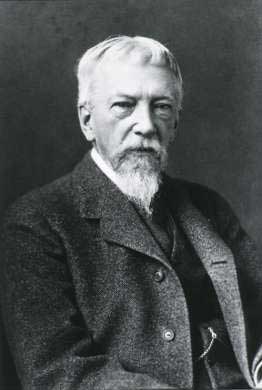 Founded by S. Weir Mitchell as a literary society, this little club hidden on Camac Street has been the center of Philadelphia's literary life for more than a century.
Founded by S. Weir Mitchell as a literary society, this little club hidden on Camac Street has been the center of Philadelphia's literary life for more than a century.
Toast To Benjamin Franklin
 Toasts to Ben Franklin continue. This one by a former president of Swarthmore College has its focus on women in Ben's life.
Toasts to Ben Franklin continue. This one by a former president of Swarthmore College has its focus on women in Ben's life.
A Toast to Doctor Franklin
 The Franklin Inn annually toasts three doctors. Even though Ben never went past second grade, his medical contributions are the most illustrious of the three. One of the most remarkable men who ever lived.
The Franklin Inn annually toasts three doctors. Even though Ben never went past second grade, his medical contributions are the most illustrious of the three. One of the most remarkable men who ever lived.
Quotes from B. Franklin, Curmudgeon
 As he grew older, Franklin took less trouble to conceal what he really thought.
As he grew older, Franklin took less trouble to conceal what he really thought.
Venturi's Franklin Museum in Franklin Court
 For several decades there has been a splendid museum of Franklin's personal life, hidden within the famous block where he once lived. Children love it.
.
For several decades there has been a splendid museum of Franklin's personal life, hidden within the famous block where he once lived. Children love it.
.
Google Earth Tour of Franklin Locations
 Every place B. Franklin is known to have visited is included in this tour by Bob Florig.
Every place B. Franklin is known to have visited is included in this tour by Bob Florig.
Franklin's Admirers on TV
 The author finds himself on television, and wonders whether c-span is a variant of blogging. From that, we go on to question whether Franklin really liked the French.
The author finds himself on television, and wonders whether c-span is a variant of blogging. From that, we go on to question whether Franklin really liked the French.
Madeira Party 2009
 In Colonial America, Madeira was what the upper crust drank.
In Colonial America, Madeira was what the upper crust drank.
Franklin on British American Relationships
 For one of the most remarkable men who ever lived, Benjamin Franklin, unfortunately, must be acknowledged to have jotted down some foolish and ill-considered things in his voluminous lifetime writings.
For one of the most remarkable men who ever lived, Benjamin Franklin, unfortunately, must be acknowledged to have jotted down some foolish and ill-considered things in his voluminous lifetime writings.
Franklin's Funeral, 1790
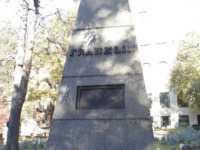 Although it has been said there were efforts to tone it down, the Funeral of Benjamin Franklin was an important moment. Everyone in Philadelphia knew it.
Although it has been said there were efforts to tone it down, the Funeral of Benjamin Franklin was an important moment. Everyone in Philadelphia knew it.
Second Amendment: The 28th Infantry Division
 Seldom regarded as a warlike state, Pennsylvania has one of only eight reserve divisions of the U.S. Army and the oldest.
Seldom regarded as a warlike state, Pennsylvania has one of only eight reserve divisions of the U.S. Army and the oldest.
Burlington County, NJ

Central Bankers Refine the Art of Diplomacy
 Currencies once failed because big issues like the gold standard hadn't been addressed by cabinet ministers. Now they are likely to fail because central bankers can't keep up with technical events.
Currencies once failed because big issues like the gold standard hadn't been addressed by cabinet ministers. Now they are likely to fail because central bankers can't keep up with technical events.
Lansdowne
 John Penn, the last of the Penn Proprietors, lived in a mansion near what is now Horticultural Hall in Fairmount Park.
John Penn, the last of the Penn Proprietors, lived in a mansion near what is now Horticultural Hall in Fairmount Park.
House that Love Built: Ronald McDonald of Philadelphia
 The idea of a temporary residence for patients and their families near a children's hospital came from Dr. Audrey Evans of Philadelphia. Initial fundraising was driven by Fred Hill of the Philadelphia Eagles. In 25 years, over three hundred others in 26 nations have independently taken up the idea.
The idea of a temporary residence for patients and their families near a children's hospital came from Dr. Audrey Evans of Philadelphia. Initial fundraising was driven by Fred Hill of the Philadelphia Eagles. In 25 years, over three hundred others in 26 nations have independently taken up the idea.
The Heirs of William Penn
 The death of William Penn left his heirs the largest land holdings in America. Although they managed it fairly well, it proved to be more than a single family could cope with.
The death of William Penn left his heirs the largest land holdings in America. Although they managed it fairly well, it proved to be more than a single family could cope with.
Benjamin Franklin, Prophet
 Ben Franklin was not exactly religious, but for one dominating American theme, Poor Richard is the prophet.
Ben Franklin was not exactly religious, but for one dominating American theme, Poor Richard is the prophet.
Franklin Endorses the Constitution
 e3Benjamin Franklin never revealed his contributions to the formation of the U.S. Constitution, whether victories or defeats. When the final vote had been taken, he urged unanimous support by the delegates, in the following words.
e3Benjamin Franklin never revealed his contributions to the formation of the U.S. Constitution, whether victories or defeats. When the final vote had been taken, he urged unanimous support by the delegates, in the following words.
The University City
 Ben Franklin would scarcely recognize the college he created. It isn't named for him, but he probably would be concerned about how quickly it is changing.
Ben Franklin would scarcely recognize the college he created. It isn't named for him, but he probably would be concerned about how quickly it is changing.
Philadelphia Chromosome
 Just about everybody has 46 chromosomes in every cell in the body. Some people have more than that: they have the Philadelphia Chromosome.
Just about everybody has 46 chromosomes in every cell in the body. Some people have more than that: they have the Philadelphia Chromosome.
Last Will of Benjamin Franklin
 The Franklin Institute of Philadelphia has reproduced Dr. Franklin's last will and testament on the Internet. It is copied here for reader convenience.
The Franklin Institute of Philadelphia has reproduced Dr. Franklin's last will and testament on the Internet. It is copied here for reader convenience.
A Grievance Carried to the Grave
Neither Benjamin Franklin nor his (illegitimate) son William fully described the reasons for their falling-out, but Benjamin carried the bitter grievance to his grave.
Franklin's Real Estate Holdings
 At the time of his death, Benjamin Franklin held at least ten parcels of real estate. They ranged from a block on Market Street in Philadelphia to 3000 acres in Georgia and included land along the Ohio River as well as land in Nova Scotia.
At the time of his death, Benjamin Franklin held at least ten parcels of real estate. They ranged from a block on Market Street in Philadelphia to 3000 acres in Georgia and included land along the Ohio River as well as land in Nova Scotia.
Franklin Benefits the Pennsylvania Hospital
 Franklin remembered the Pennsylvania Hospital in his will by giving them his bad debts.
Franklin remembered the Pennsylvania Hospital in his will by giving them his bad debts.
Franklin's Codicil to His Will: Strange Afterthoughts
 Ben Franklin died a very rich man, because he was a frugal one.
Ben Franklin died a very rich man, because he was a frugal one.
Franklin Teaches Investing to Boston and Philadelphia
 In 1789, B. Franklin changed the nature of his last will and testament from conventional to highly unconventional.
In 1789, B. Franklin changed the nature of his last will and testament from conventional to highly unconventional.
Governor Keith's House

Passage to India
.JPG)
Ball Lightning, Regular Lightning, and B. Franklin
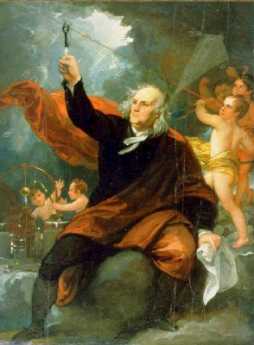 Knowledge about ball lightning is as dismal today as Franklin found the state of knowledge about regular lightning in 1752. Let's put ourselves in his shoes.
Knowledge about ball lightning is as dismal today as Franklin found the state of knowledge about regular lightning in 1752. Let's put ourselves in his shoes.
Morris at the Constitutional Convention
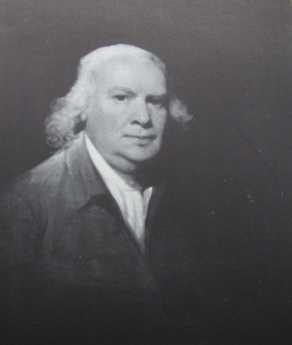 Robert Morris knew that credit is only extended to someone with a reputation for paying his bills.
Robert Morris knew that credit is only extended to someone with a reputation for paying his bills.
Poor Richard's Wealth
 Ben Franklin called himself Poor Richard, and he also was invited to visit five kings. Was he rich, or poor?
Ben Franklin called himself Poor Richard, and he also was invited to visit five kings. Was he rich, or poor?
A Time to Read Books
 Retirement is a good time to read all those books you meant to read. But certain things stand in the way.
Retirement is a good time to read all those books you meant to read. But certain things stand in the way.
Those Troublesome Lees of Virginia
It's difficult for Pennsylvanians to understand why the Lee family of Virginia made so much trouble for our heroes, Robert Morris, Benjamin Franklin, Gouverneur Morris in particular. Perhaps it was a cultural clash.
Evo-Devo
 The Franklin Institute has been making awards for scientific achievement for 188 years, long before the Nobel Prize was invented. The seats are all reserved before the meeting notices are even mailed.
The Franklin Institute has been making awards for scientific achievement for 188 years, long before the Nobel Prize was invented. The seats are all reserved before the meeting notices are even mailed.
Advantages and Disadvantages of Being a Small Country
 Remaining a small country has many merits, but one big demerit. Your neighbors are tempted to swallow you up.
Remaining a small country has many merits, but one big demerit. Your neighbors are tempted to swallow you up.
Ben's Little Legacy
 The Constitution provides that revenue bills must originate in the House of Representatives. This provision is regularly circumvented, and Congressmen have long forgotten they should tip their caps to Ben Franklin.
The Constitution provides that revenue bills must originate in the House of Representatives. This provision is regularly circumvented, and Congressmen have long forgotten they should tip their caps to Ben Franklin.
The Origin of States Rights, a Rumination
The clamor for States Rights probably began with Virginia's claims for western territories.
Wistar Institute, Spelled With an "A"
 The Wistar Institute is properly pronounced "Wister", but in fact it's all the same family. Its fame in biomedical research makes that quite irrelevant.
The Wistar Institute is properly pronounced "Wister", but in fact it's all the same family. Its fame in biomedical research makes that quite irrelevant.
Stretching Out Your Retirement Savings
 "Don't spend principal" is pretty good advice, except as retirement income starts to run low.
"Don't spend principal" is pretty good advice, except as retirement income starts to run low.
State and Federal Powers: Historical Review
The Streets of Philadelphia, on Ben Franklin's Birthday
 New blog 2015-01-22 23:44:26 description
New blog 2015-01-22 23:44:26 description
After London, Ben Franklin Revisited

B. Franklin, a Chronology
Eighty four years, from candle-stick maker's son to Philadelphia's elderly hero, the seventh child of his second wife,.
Germany Before Germantown
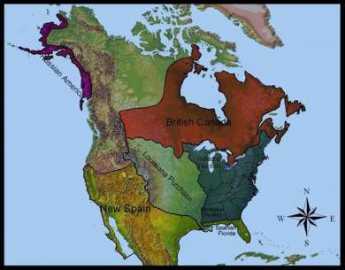 Foraging French soldiers had ravaged the German Rhineland, so the Germans who fled to America were anti-French. That pleased the British, even the nominally Catholic Stuart kings.
Foraging French soldiers had ravaged the German Rhineland, so the Germans who fled to America were anti-French. That pleased the British, even the nominally Catholic Stuart kings.
Union, Now and Forever
 It's not easy to herd cats.
It's not easy to herd cats.
Boundary Disputes
 Boundaries between nations were mainly based on effective military occupation until the Treaty of Westphalia in 1648. After that, established boundaries were mainly based on rivers or mountain ridges. In the Eighteenth Century, surveying instruments made other boundaries practical, but the political system added new quirks. The Articles of Confederation were a make-shift adjustment to changing concepts of boundaries.
Boundaries between nations were mainly based on effective military occupation until the Treaty of Westphalia in 1648. After that, established boundaries were mainly based on rivers or mountain ridges. In the Eighteenth Century, surveying instruments made other boundaries practical, but the political system added new quirks. The Articles of Confederation were a make-shift adjustment to changing concepts of boundaries.
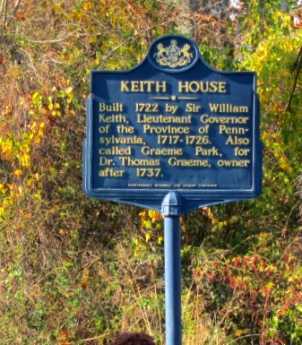
I believe Benjamin Franklin may be the most under-appreciated of the Founding Fathers. I have attached a Google Earth folder I made from the places mentioned in H.W. Brands' biography of Franklin, The First American. It includes historic overlays of Boston and Philadelphia, and the places he lived and visited in Europe. If you're a Franklin fan, I hope you enjoy it.
Email: bobonhmsbeagle@gmail.com
KML File: Franklin.kmz